All 24 Kebbi Schoolgirls Freed, Tinubu Elated, Says He’s Relieved
Onanuga
Deji Elumoye, Michael Olugbode, Onyebuchi Ezigbo, Adedayo Akinwale, Linus Aleke in Abuja, John Shiklam in Kaduna, Hammed Shittu in Ilorin, Laleye Dipo in Minna, Emmanuel UgwuNwogo in Enugu and Ahmad Sorondinki in Kano
The 24 schoolgirls abducted from Government Girls Comprehensive Senior Secondary School (GGCSS), Maga, in Danko/Wasagu Local Government Area of Kebbi State, have regained their freedom.
President Bola Tinubu expressed happiness over the development, saying he has ordered a total air security

















Despite Gains in Inflation-targeting, CBN Retains MPR at 27 Per Cent
Cardoso: At double digit, headline inflation still a concern, declares 16 banks have met new capital thresholds, says macroeconomic gains will soon impact on masses, insists Naira stability driven by market forces Explains apex bank's apathy in intervening in economic sectors: over N2 trillion outstanding from previous interventions Uwaleke says with MPC decisions, banks face lower marginal funding costs that should reduce interbank volatility, encourage lending to SMEs
James Emejo in Abuja and Nume Ekeghe in Lagos Central Bank of Nigeria (CBN), yesterday, resolved to keep the Monetary Policy Rate (MPR), the benchmark interest rate unchanged at 27 per cent.
The central bank, however, adjusted the standing facility corridor around the MPR at +50/-450 basis points, and retained the Cash Reserve Requirement (CRR) for Deposit Money Banks (DMBs) at 45 per cent, merchant banks at 16 per cent, and 75 per cent for non-TSA public sector deposits as well as kept the Liquidity Ratio unchanged at 30 per cent.
surveillance around forests in Kebbi, Kwara and Niger states.
The directive followed an upsurge in kidnapping and terrorist activities in the states.
The president, in a statement yesterday by his Adviser on Information and Strategy, Bayo Onanuga, declared, "I am relieved that all the 24 girls have been accounted for."
Tinubu applauded the security agents for the efforts made to secure freedom for all the victims taken away by the terrorists. He tasked the security agents to make more efforts to rescue the remaining students still being held captive.
"Now, we must put as a matter of urgency more boots on the ground in the vulnerable areas to avert further incidents of kidnapping,” he stated. “My government will offer all the assistance needed to achieve this," he added.
A source familiar with the government’s coordinated rescue effort disclosed that
According to him, the total expected Internally Generated Revenue (IGR) is N3.119 trillion, with Total Federal Transfer of N874,000 billion.
It had Capital Expenditure of N2.185trn and Recurrent Expenditure of N2.052trn, comprising total overhead, total personnel cost, and recurrent debt service. The Recurrent Expenditure was broken down as follows: Total Overhead Cost, N1.084trn, made up of Overhead, N698.890bn. Subventions, N201.216bn; Dedicated Expenditure, N184.139bn; Personnel & Debt, comprising Total Personnel Cost, N440.494bn; Recurrent Debt Charges, N143.876bn;
Addressing journalists after the two-day meeting of the Monetary Policy Committee (MPC), the last for 2025, CBN Governor, Mr. Olayemi Cardoso, said the committee's decision was underpinned by the need to sustain the progress made so far towards achieving low and stable inflation.
MPC also reaffirmed its commitment to a data-driven assessment of developments and outlook to guide future policy decisions.
Nigeria’s Professor of Capital Market, Professor Uche Uwaleke, hailed MPC’s decision to maintain the MPR as well as keep CRR and Liquidity Ratio unchanged,
the schoolgirls’ release was occasioned by a non-kinetic intervention by the federal government.
According to the source, the operation succeeded through close collaboration between the Office of the National Security Adviser (ONSA) and the Department of State Services (DSS), which worked behind the scenes to secure the girls’ freedom without resorting to force.
The source explained that the reliance on a non-kinetic approach—centred on dialogue, negotiation, and other peaceful measures—reflected a continuing shift in the government’s strategy for addressing mass abductions, which have repeatedly affected the northern region in recent years.
But Kebbi State Governor, Nasir Idris, demanded a full military investigation to identify and hold accountable the commander, who allegedly ordered the withdrawal of
and Debt Repayments, N383.404bn.
Sectoral Allocation, General Public ServicesN847.472bn, Public Order & Safety– N147.040bn, Economic Affairs – N1.372trn, Environment – N235.957bn, Housing – N123.760bn, Health – N338.449bn, Recreation – N54.682bn, Education – N249.132bn and Social Protection – N70.024bn.
Sanwo-Olu had in 2025 presented a budget size of N3.367trn with a total revenue estimate of N2.968 trillion, comprising N2. 230 trillion from IGR.
The governor revealed the performance of the Y2025 Budget, saying as at the third
stating that with CBN's lending window now cheaper, banks face lower marginal funding costs, which should ordinarily reduce interbank volatility and encourage lending to SMEs.
The CBN governor said the committee welcomed the continued deceleration in headline inflation (yearon-year) in October 2025, for the seventh consecutive month following sustained monetary policy tightening by the CBN, stable exchange rate, increased capital inflows, and surplus current account balance.
He said the relative stability in the price of Premium Motor Spirit (PMS) and improved
soldiers from the school shortly before the abduction.
The governor described the incident as an act of “clear sabotage”.
The military, in a statement, confirmed that the matter was currently under investigation.
Special Adviser to the President on Media and Public Communication, Sunday Dare, disclosure in a post on his verified X handle that Tinubu had ordered a total air surveillance around forests in Kwara, Niger and Kebbi states.
Dare said the president had directed the Nigerian Air Force (NAF) to intensify aerial surveillance over the deepest stretches of the forests, where criminals were believed to be hiding.
He said the operation would be carried out round the clock, with air assets maintaining constant communication and coordination with ground troops.
The presidential spokesperson explained that
quarter of Y2025, the period ending September 30, 2025, the state government had implemented N2.056trn representing, 81 per cent of the projected estimate of N2.525trn
Actual capital expenditure stood at N1.238trn, representing 90 per cent of the projected estimate of N1.553 trn, while actual recurrent expenditure stood at N818.577trn representing 84 per cent of the prorated estimate of N971.722trn.
Presenting the 2026 budget proposal, Sanwo-Olu said, "Mr. Speaker, I am, indeed, honoured to present to you today the Year 2026 Budget proposal of Lagos State, tagged ‘Budget of Shared Prosperity’.
food supply also supported the pace of disinflation.
The CBN governor also disclosed that gross external reserves increased by 9.19 per cent, reaching a high of $46.70 billion on November 14, 2025, from $42.77 billion at endSeptember 2025, sufficient to cover 10.3 months of import for goods and services.
Analysts had predicted that MPC will be encouraged by the recent deceleration in inflation to cut the base rate.
However, Cardoso pointed out that headline inflation remained high at double digit, requiring sustained efforts towards moderating it further. He said the committee was of the view that the steady
the same directive applied to Kebbi and Niger states, where joint operations were expected to facilitate the rescue of other kidnap victims.
According to Dare, communities in the affected regions have also been urged to provide timely intelligence on suspicious movements to aid security forces in restoring safety.
A wave of brazen kidnappings and violent raids across Kwara, Kebbi, and Niger states had exposed the alarming reach of criminal networks exploiting remote forests and ungoverned terrain.
Tinubu’s directive for 24hour aerial surveillance and ground coordination was both urgent and essential to dismantle the networks, rescue hostages, and restore confidence to vulnerable communities.
Dare wrote, "President Tinubu has ordered total security cordon over the forests in Kwara state following recent
The Year 2026 Budget as proposed has a total budget size of N4,237,107,009,308.”
Sanwo-Olu stated that the 2026 was a reaffirmation of collective belief that Lagos would continue to rise, lead and create opportunities for every resident of Africa’s preferred megacity.
He added the budget would be the last full year of his administration, "making it a pivotal period for consolidating our legacy and ensuring a strong, successful finish. We remain determined to complete all ongoing and initiated projects, and we will continue to engage Lagosians so that their priorities consistently guide our actions.
deceleration in inflation across the three measures (headline, core and food) in October 2025, suggested that the lagged impact of previous tight policy measures was expected to continue in the near term.
He said, “Thus, maintaining the current stance of policy, amidst lingering global uncertainties, would allow the effect of previous He acknowledged the substantial progress in the ongoing recapitalisation programme, adding that 16 banks have achieved full compliance with the revised capital requirements by the apex bank.
The committee
kidnappings and terrorist activities.
"President Tinubu directed the Airforce to expand its air surveillance across the innermost parts of the forests in Kwara State, where it is believed the terrorists are hiding.
“They are to maintain a 24-hour surveillance and link up with the booths on the ground. This order equally applies to the Kebbi and Niger States axis where many are expected to be rescued.
"Communities are also urged to provide timely information about strange movements and activities to aid the work of the security forces."
The presidency also disclosed that much pressure was mounted on the bandits by both the military and DSS last weekend, forcing the release of the 38 church worshippers kidnapped in Eruku, Kwara State.
Onanuga explained that non-kinetic approach was
"Having consistently laid solid foundations in the past years, we are now moving into a phase of accelerated impact. The investments we are making - in our people, in infrastructure, in social systems, in governance - are deliberate, inclusive, futurefocused, and prosperity-driven.
"To recap, our objectives are clear and our resolve unshakable: To keep Lagos secure; to keep Lagos working; to keep Lagos growing and to ensure that this growth and prosperity are shared by all who call this hub of excellence home."
The governor disclosed that the 2026 budget was anchored on four pillars: A

urged CBN to ensure a successful implementation and conclusion of the recapitalisation programme. Nevertheless, MPC acknowledged the robust performance of the external sector, evidenced by the surplus current account balance and steady accretion to reserves, which had contributed to stability in the exchange rate and moderation in inflation.
Cardoso said global inflation was expected to maintain a steady decline through 2026, on the back of the combined impact of past monetary tightening,
deployed in securing the release of the 38 worshippers. In a release, Onanuga, while appreciating both the military and the DSS for the release of the kidnapped worshippers, added that the gunmen knew that if they did not cooperate, they were going to be “pummelled”.
He stated, "After the incident, the DSS and the military were involved in the rescue effort. They got in contact with the bandits to release the captives unharmed. On Sunday, they were able to get them out unharmed. They do have a way of tracking these people.
“The security agencies have a way of contacting these people. They (bandits) know the consequences of not acquiescing to government demands. They know they could be pummelled.”
Onanuga emphasised that a kinetic approach would
Human-Centred Approach, Modern Infrastructure, A Thriving Economy, and Effective Governance.
He stated, "Mr. Speaker, our foremost priority remains the wellbeing of every Lagosian. To this end, in 2026 we will expand access to quality education, strengthen healthcare delivery, widen social protection, and accelerate affordable housing.
"We will improve urban renewal, waste management, and flood resilience, while ensuring that women, youth, older persons, and persons with disabilities are fully supported. Our goal is a Lagos that cares, includes, and uplifts.

CELEBRATION OF LOVE...
First Lady: We Needn't Divest Human Values From Technology
Addresses WISE summit plenary in Qatar
Deji Elumoye in Abuja
Wife of the President, Senator Oluremi Tinubu has declared that as the world continues its steady course into the digital era where innovations shape interactions and define ideas, it's time to balance the act, ensuring that humanity, not technology, leads.
Mrs Tinubu made the submission yesterday while
addressing the 'Education Above All' plenary session of the 12th World Innovation Summit for Education , WISE in Doha, Qatar.
Alluding to the success story of Qatar in the area of education, the First Lady who shared the stage with her counterparts from Lebanon and Syria expressed conviction that no religion forbids girls from being
educated. As such, she said the federal government is doing everything ppssible to provide every Nigerian child with the endless possibilities that education offers.
According to her: “Everything begins with education. We are doing all we can as a government to advance the education sector. We must collectively look at the bigger picture,
knowing that Nigeria has a huge human capital resource and that is what we thrive on.
“Our youth are known globally, either in the arts, education, fashion, movie industry or agriculture. They are doing tremendously. and not only that, President Bola Tinubu is treating Innovation and technology as the bedrock of human capital
Tinubu Seeks Sweeping Overhaul of Legal Profession, Sends New Regulatory Bill to Senate
Proposes tougher ethics regime, stricter licensing, two-year post-call internship
Sunday Aborisade
President Bola Ahmed Tinubu on Tuesday sought a far-reaching transformation of Nigeria’s legal profession as he transmitted the Legal Practitioners Bill 2025 to the Senate.
The proposed legislation is seeking a comprehensive overhaul of professional regulation, ethics enforcement, licensing, and disciplinary procedures.
The bill read on the floor by Senate President Godswill Akpabio specifically seeks to repeal the existing Legal Practitioners Act, enacted in 1962 and codified under Cap L11, Laws of the Federation 2004.
The President in his letter to the Senate, said the framework has become outdated and unable to respond to the evolving demands on legal practice at home and abroad. Tinubu noted in his
accompanying letter that “the proposed legislation introduces a modern legal framework to strengthen the regulation of the legal profession in Nigeria.”
“It will provide the necessary reforms that will enhance professional standards, disciplinary mechanisms, and public confidence in legal practice,” he added.
He said emerging challenges, ranging from practitioner licensing to enforcement of professional conduct and
disciplinary measures, require a full legislative reset to ensure accountability and restore public trust in the justice system.
According to the draft legislation, the reform package introduces some of the most sweeping regulatory changes to the Bar in more than six decades.
The key provisions include: Section 1: Clear objectives prioritising public interest, protection of the rule of law, and improved access to justice.
FG Tasks 348 Newly Inducted Doctors on Ethics, Standards
Onyebuchi Ezigbo in Abuja
The federal government has asked newly inducted foreign trained medical doctors to ensure strict adherence to laid down professional ethics and standards.
Speaking at the induction ceremony of 348 foreign trained medical and dental professionals in Abuja on Tuesday, the Registrar of the
Medical and Dental Council of Nigeria (MDCN), Prof. Fatima Kyari charged the young doctors to strive and maintain high standards and excellent performance while carrying out their services.
She said that by the induction, the Council has entered into a pact with the doctors on their ethics and code of conduct as practising doctors in Nigeria.
The Registrar reminded the trainee doctors that apart from registration fee, they are not to pay any money to be posted for Housemanship, adding that it is an offence to do so.
"The profession is something that is watched worldwide and I know that Nigerian doctors are sought for all over the world because our doctors
are well trained, they have experience and they can fit well into any situation they find themselves," she said.
The Registrar warned the doctors against unprofessional acts, saying that anyone found wanting for misconduct or even character breach will be duly investigated by the Medical and Dental Investigative panel.
development.
“Nigeria, being an emerging economy, digital literacy has helped us a lot because it is faster, it reaches a lot more people. It also comes with its downside. Our young people are either using it for good or negatively.
“We believe we would keep empowering the young ones in this area and they would do better”.
On her part, Chairperson of Qatar Foundation and host of the summit, Sheikha Moza Bint Nasser, harped
on the need for education to do more in transforming lives and communities by connecting young people with new jobs.
Other speakers at the summit attended by over 150,000 participants from all over the world, harped on the need to see humans as the basis of various ongoing transformations in the world. They emphasized that human values and ethics should determine the use of AI posing the question that progress would be worthless without human values.
FG, Sultan Endorse Film Project on Usman Dan
Fodio's Daughter Nana Asma'u
Sunday Ehigiator
The Sultan of Sokoto, His Eminence Muhammadu Sa’ad Abubakar III, and the Federal Ministry of Industry, Trade and Investment have formally endorsed a major film project chronicling the life and legacy of Princess Nana Asma’u, the 19th-century Muslim scholar, poet and educator famed for her pioneering role in women’s education in Northern Nigeria.
The project, to be produced by Script Plus Limited, aims to spotlight Nana Asma’u’s intellectual contributions and her influence on women empowerment and Islamic scholarship - an effort the producers say will also serve as a tool for promoting cultural understanding, peace and unity across the country.
In a letter, the Sultanate
Council, through its Secretary, Sa’idu Muhammadu Maccido (Danburam Sokoto), conveyed the Sultan’s command and authorization for the film led by the Executive Producer, Hajiya Rahma Abdulmajid, who also serves as the Personal Assistant to the President on Radio and Broadcast (Office of the Vice President).
“We are glad that you have undertaken to produce a film on Nana Asma’u bnt. Usman bn. Fodio, for many, the epitome of Muslim women in Africa… The Sultanate Council hereby conveys its endorsement for this project and authorizes you to commence as you requested,” the letter stated.
The Council further requested periodic updates on the project, including participation in the final review before the film’s premiere.


2025 FELLOWSHIP CONFERMENT OF CHARTERED INSTITUTE OF TAXATION OF NIGERIA...
Dangote Picks US Firm, Honeywell, to Upgrade 650,000 Bpd Refinery to 1.4m Bpd
JP Morgan: Oil prices could plunge into $30s by 2027 Says supply glut may drive
Emmanuel Addeh in Abuja and Peter Uzoho in Lagos
The Dangote Group has announced that it has entered a strategic partnership with Honeywell International Incorporated to support the next phase of expansion of the Dangote 650,000 barrels per day Petroleum Refinery by over 100 per cent.
In a statement issued yesterday, Dangote said the collaboration would provide advanced technology and services that would enable the refinery to increase its processing capacity to 1.4 million barrels per day by 2028, marking a major milestone in their long-term vision to build the world’s largest petroleum refining complex.
According to the statement,
through this agreement, Honeywell will supply specialised catalysts, equipment, and process technologies that will allow the refinery to process a broader slate of crude grades efficiently and to further enhance product quality and operational reliability.
Honeywell, a US firm, is a global Fortune 100 industrial and technology company, which offers a wide portfolio of solutions across aviation, automotive, industrial automation, and advanced materials.
Honeywell’s division UOP has been a technology partner to Dangote since 2017, providing proprietary refining systems, catalyst regeneration equipment, high performance column trays, and heat exchanger technologies
Sterling Bank, Water.org, Sterling One Foundation Partner to Provide Access to Clean Water for Millions
To address the urgent challenge and strengthen the systems delivering WASH solutions, Sterling Bank, in partnership with nonprofit Water.org and Sterling One Foundation, has launched the Sterling WASH Business Loan, a catalytic financing solution that empowers WASH businesses and service providers to scale sustainable access to safe water and sanitation across Nigeria.
According to the bank, the partnership signals a shared commitment to solving one of Nigeria’s most pressing development challenges: access to safe water and basic sanitation.
Speaking at the launch in Lagos, recently. Abubakar Suleiman, Managing Director, Sterling Bank, highlighted the initiative’s role in fostering inclusive development.
According to him, “Sustainable development depends on collaboration and targeted investment in the people and businesses delivering solutions on the ground.
“By providing accessible financing to entrepreneurs in such a critical social sector, we ensure that progress reaches communities that need it most.
This product aligns with our HEART strategy and our commitment to improving quality of life through impactdriven initiatives.”
On his part, the Nigeria Senior Partnership Account Manager at Water.org, Gilbert Okpono, emphasised the transformative potential of financing WASH businesses, adding that financial inclusion is critical to solving the global water and sanitation crisis.
that support our best-in-class operations.
Although the financial terms of the deal were not disclosed, the partnership aligns with a plan unveiled last month by the oil firm to add a new singletrain unit, with the goal to meet Nigeria’s domestic demand while producing surplus volumes for export.
The Dangote Group added that it is also advancing its petrochemical footprint. As part of the wider collaboration,
the group said it was scaling its polypropylene capacity to 2.4 million metric tons annually using Honeywell’s Oleflex technology.
Polypropylene is a key industrial material widely used across packaging, manufacturing, and automotive applications. In addition to refining expansion, Dangote Group stated that it was progressing with the next phase of its fertiliser growth plan in Nigeria.
"We will increase our urea
production capacity from three million metric tons to nine million metric tons annually.
The existing plant consists of two trains of 1.5 million metric tons each. The expansion will add four additional trains to meet growing demand for high-quality fertiliser across Africa and global markets.
"Dangote Group remains fully committed to delivering world-class industrial capacity, strengthening Nigeria’s energy security, and driving sustainable
economic growth through longterm investment, innovation, and strategic global partnerships", the statement added.
Meanwhile, analysts at JP Morgan have predicted that oil prices are on course to fall to their lowest level in two decades outside the pandemic, with Nigeria's benchmark, Brent crude oil, forecast to average $42 during 2027 as a surge in production by the Organisation of Petroleum Exporting Countries (OPEC) cartel triggers a supply glut.
At Value Chain Annual Lecture, FG Highlights Key Reforms in Energy Sector
The federal government yesterday highlighted some key reforms in the oil and gas sector under the Bola Tinubu administration, stressing that Nigeria's economic revival depends heavily on a stable, modern, and efficient energy sector.
Speaking in Abuja at the 8th ValuChain Annual Lecture Series themed: “Growth in Energy Sector: Nexus Between
Economic Development, Social Impact, and Public Perception”, the Minister of Information and National Orientation, Mohammed Idris, noted that Tinubu recognises that meaningful development must balance economic reforms, social outcomes, and public trust.
According to him, the President’s agenda places energy at the centre of sustainable growth, industrialisation, investment attraction, job
creation, and long-term national competitiveness.
Represented by the Director General of the Federal Radio Corporation of Nigeria (FRCN), Dr Mohammed Bulama, the minister noted that the Tinubu government was taking decisive steps to reposition the sector, steps he said reflect courage and long-term planning.
One of these reforms, which he said is already shaping the national trajectory, is the Compressed Natural Gas
(CNG) initiative, wherein the government is pushing for gas expansion and penetration for transportation.
“The administration's push for CNG is part of a broader strategy for the evolution of a sustainable and affordable energy mix ecosystem that provides for cleaner fuel affordability, that provides for cleaner fuel options, and a plan to actively situate and support Nigerian citizens and businesses.
Agama: Exit from FATF Grey List Crucial to Future of Nigeria’s Financial Markets
Kayode Tokede
The Director General of the Securities and Exchange Commission (SEC), Dr. Emomotimi Agama, has said that exit from Financial Action Task Force (FATF) grey list is crucial to the future of Nigeria’s financial markets, urging stakeholders to strengthen and
sustain a culture of proactive compliance to safeguard the country’position in the global financial system.
Speaking at the Nigerian Capital Market Institute Compliance Summit, Agama noted that discussions at the summit touch “the very heart of the market’s integrity, stability and future.”
Agama said Nigeria’s removal from the FATF Grey List was a major national achievement and a strong global endorsement of the country’s resolve to strengthen its Anti-Money Laundering and Counter-Financing of Terrorism (AML/CFT) framework. He said: “This was not a
mere administrative update; it was a resounding global affirmation of our collective and unwavering commitment”. Crediting the success to the joint efforts of public and private sector institutions, he commended operators, regulators and compliance professionals for their roles in achieving the milestone.
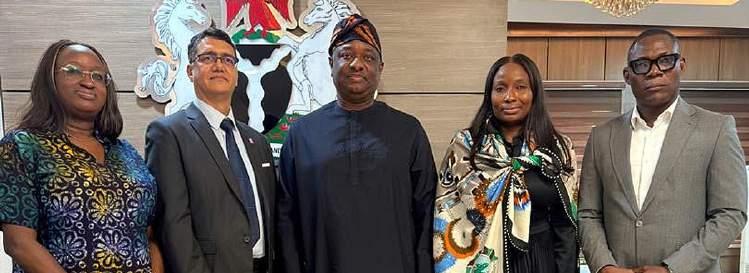
PREPARATIONS FOR NIGERIA’S HOSTING OF ACI AFRICA REGIONAL CONFERENCE AND EXHIBITION...
Looming Deglobalisation: Oramah Says African Leadership Requires Courage, Innovation to
Dike Onwuamaeze
The immediate past President and Chief Executive of African Export and Import Bank (Afreximbank), Professor Benedict Okey Oramah, has stated that African leadership must act with courage and innovation to ensure that the current winds of deglobalisation would not stifle the continent’s opportunity to develop.
Oramah stated this in Lagos on Monday night at the Nigeria-British Chamber of Commerce (NBCC) “2025 Presidential Inauguration Dinner,” where he spoke on the theme "Stewarding the Future: Leadership, Trade and Transformation."
The dinner marked the
inauguration of Mr. Abimbola Olashore as the 19th President and Chairman of Council, NBCC.
Oramah wondered why the world is abandoning the global framework that had worked for development of other continents at the time the development train was headed to Africa for boarding and stated the duty of responsible African leadership is to respond to that question by acting.
“I say this because, true leadership that envisions and acts with courage and innovation should attempt to convert every challenge into an opportunity, leveraging its network, and opportunities.
“The disruption of globalisation cannot therefore
Adar Takes Office as New NEITI Head, Seeks Review of Governing Act
The newly appointed Executive Secretary of the Nigeria Extractive Industries Transparency Initiative (NEITI), Musa Adar, yesterday officially assumed office at the NEITI House, pledging to push for an amendment of the Act setting up the organisation.
Adar, who was last week redeployed from his position as Chairman, National Inland Waterways Authority (NIWA) to head NEITI, in his maiden address to management and staff, pledged to leverage his extensive legislative and oversight experience to strengthen NEITI’s visibility, institutional relevance, and impact.
He emphasised that NEITI’s mandate must be better
understood across the country, noting that the organisation has built a reputation as a beacon of openness in Nigeria’s extractive industries.
Adar highlighted that NEITI’s reports have shaped policies, influenced reforms, and strengthened public trust, but stressed that the journey ahead demands greater effort, particularly with Nigeria’s upcoming validation as a member of the global Extractive Industries Transparency Initiative (EITI) scheduled for July 2026.
The new executive secretary noted that a key priority for him is the amendment of the NEITI Act 2007, explaining that the current Act does not provide NEITI with the institutional authority and capacity required to function optimally.
be the end of the road for Africa and Nigeria,” Oramah said.
According to him, “African leadership must abandon the luxuries of privilege and embrace the duty of sacrifice.
“It must overcome fear and assume the mantle of courage; the audacity to vision and act.”
He said that “taking one’s destiny in one’s hands is leadership in action. Refusing to succumb to a victim mentality when others take
Prevent Stifled Devt
actions that challenge us is leadership in action. Turning challenges into opportunities is leadership in action.”
Oramah remarked that 60 years delay and inaction to implement the decision of the first general assembly of the then Organisation of African Unity in 1963 on realising intra-African trade robbed Africa the promise of globalisation and amounted to leadership denied.
“But today, we have acted;
we are standing up to our responsibilities. That is why I am confident that with, or without globalisation, Africa’s trade driven transformation is on its way,” he said.
In his opening remark, the former governor of Lagos State, Mr. Babatunde Fashola (SAN), said that it is only the mindset of Africans that would limit the continent’s capacity to trade with one another in a world that has golabalised and digitised?
Fashola also mentioned that trade and diplomacy are the hand tools of development and urged nations, including Nigeria, to be conscious on how they deploy these tools, especially now that tariffs are playing big roles in international trade. He said that nation-states should protect all opportunities they have to improve trade and development with commitment to maintain law and order.
FG Reaffirms Social Protection Drive, Says 5.5m Nigerians Received Cash Transfers
Emmanuel Addeh in Abuja
The federal government yesterday said it was strengthening Nigeria’s social protection framework to better address poverty, vulnerability, and humanitarian crises across the country, stressing that so far 5.5 persons have benefitted from its conditional cash transfer programme.
This was disclosed by the Minister of Humanitarian
Affairs and Poverty Reduction, Bernard Doro, yesterday in Abuja at the inaugural national steering committee meeting of ACT Naija organised by the Africa Network for Environment and Economic Justice (ANEEJ).
The minister outlined the federal government’s progress in strengthening social protection through the National Social Investment Programme Agency, National
Commission for Refugees, Migrants and Internally Displaced Persons, National Senior Citizens Centre, and the National Commission for Persons with Disabilities.
Doro, who was represented by his Special Adviser, Abimbola Fashanu, said:
“Under the renewed hope agenda, programmes such as Conditional Cash Transfers, the Grant for Vulnerable Groups, N-Power, GEEP,
Home-Grown School Feeding, and the National Social Safety-Net Coordination remain central to supporting vulnerable households.
“Over 19.7 million households are verified in the national social register, with 5.5 million benefiting from cash transfers. Microcredit schemes have also reached more than 5 million Nigerians across all local government areas.”
NAFDAC, Stakeholders Move to Increase Surveillance on Impact of AMR, Climate Change on Agriculture
Onyebuchi Ezigbo in Abuja
The National Agency for Food and Drug Administration Control (NAFDAC), Danida Alumni Network Nigeria ( DAN - NG) and other stakeholders, have commenced effort on strengthening of traceability of food and drug, antimicrobial resistance and climate change.
The initiative kicked off at a two-day training workshop in Abuja yesterday organised by the Danida Alumni Network Nigeria ( DAN -NG) in collaboration with Danida Fellowship Centre and the Ministry of Foreign Affairs of Denmark, with the theme, " Strenghtening Antimicrobial Resistance (AMR) Surveillance, Biosafety and Climate- Smart Agriculture Through A One
Health Approach In Nigeria."
Speaking at the event, the NAFDAC representative and the National Coordinator of the Danida Alumni Network Nigeria ( DAN - NG),Sidika Jumoke Kamaru, said part of the challenges identified is that Nigerian farmers have low awareness about antimicrobial resistance.
"Take for instance, even within house policymakers, if
you talk about antimicrobial resistance, some people will be like, what? heard people today, rather than saying AMR, somebody will say, you have anti-malaria." Kamaru said the workshop was on strengthening antimicrobial resistance surveillance, bio-safety, and climate-smart agriculture through One Health Approach in Nigeria.
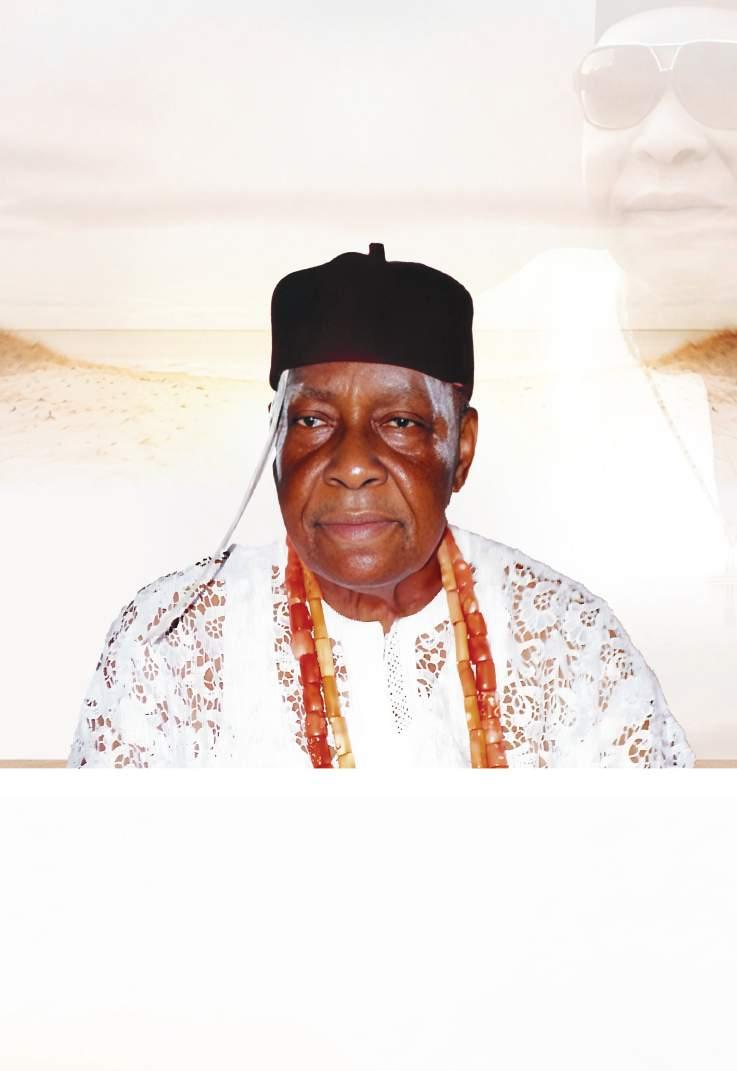


November 23, 2025
ALHAJI KABIRU TANIMU TURAKI (SAN)
The National Chairman Peoples Democratic Party Wadata Plaza Abuja
WE CELEBRATE A NEW DAWN
The Forum of State Chairmen of the Peoples Democratic Party celebrates the emergence of His Excellency, Kabiru Turaki, SAN, as the National Chairman of the Peoples Democratic Party, PDP, marking a new dawn for democracy in Nigeria.
With the crop of other patriotic party men and women elected to the National Working Committee of our party, we are confident that under your distinguished leadership, our party will continue to advance its mission of rescuing and rebuilding Nigeria.
We commend the leadership and resilience of Their Excellencies, the Governor of Oyo State, Seyi Makinde; the Governor of Bauchi State, Senator Bala Mohammed; the Governor of Adamawa State, Amadu Fintiri; the Governor of Plateau State, Caleb Mutfwang; the Governor of Zamfara State, Mr Dauda Lawal; and the Governor of Osun State, Ademola Adeleke. The sacrifices you all made to salvage our party and nation are enormous and highly commendable.
As we wish the National Working Committee great success confident that under your leadership, driven by competence, inclusiveness, national progress, the PDP will reclaim its rightful place in Nigeria.
Congratulations!
Long live the Peoples Democratic Party! Long live the Federal Republic of Nigeria!!
Signed;

Tony Aziegbemi Chairman of the Forum and Chairman Edo State
Edward Masha Secretary of the forum and Chairman, Kaduna State
Hon Bassey Eko Ewa CRS Chairman, Cross River
Adamu Burga Chairman, Bauchi State

Chairman, Nassarawa State Solomon Agwana Chairman, Bayelsa State
Nura Amadi Chairman, Katsina State

Sunday Bisi Chairman, Osun Stat
Ado Kibiya Chairman Kano State Comrade Chidi Chidebe PHD, FICMC Chairman Anambra State
Jamil Jibo Magayaki Chairman, Zamfara State

Bawa Adamu Chairman, Kwara State
Aisada Chairman, Ondo State Rt. Hon. Tinji Odeyemi Chairman, Ekiti State
AMb Umar El-Gash Chairman, Yobe State
Philip Aivoji Chairman, Lagos State
Abyayomi
Chairman, Ogun State Dayo Ogungbenro Chairman, Oyo State
Zanna Gaddama Mustapha Chairman, Borno State Hamza Madagali Chairman, Adamawa State Hon. Muhammed Sani Gambo Chairman, Kogi State
Raymond Dabo Chairman, Plateau State

Nigeria Tech Firm, Task Systems, Wins Microsoft Best Partner Award In USA
At a time in the history of Nigeria when its reputation seems to have been slurred, an indigenous tech firm, Task Systems Limited, was honoured in the presence of thousands of global professionals with Microsoft Best Partner Award in California, United States of America.
It was a major rebranding for Nigeria as Task Systems, a member of the Zinox Group and one of the pioneers of Africa tech ecosystem, emerged one of the 42 winners out of over 4,000 corporate nominations from across 100 countries.
This highly coveted Award commands respect and reassures the world that Nigeria is a promising country to do business with assured return on investment.
The under-35 Chief Executive Officer of Task, Mrs Gozy Ijogun, who was in the US to receive the award at the Microsoft Ignite 2025 event, said it was an award that speaks to the trove of innovations and tech advancement by Nigerians at home in the past decade. She thanked the government of Nigeria, multinationals and local corporates who made it possible.
To her, this calls for more enterprise innovation, technical efficiency and deeper engagement between Task Systems and its diverse stakeholders spread across different fields of human endeavour.
The award came barely one month after her younger brother and Group Chief Executive Officer of Konga, Africa’s fastest growing e-commerce powerhouse, Prince Nnamdi Ekeh, made history inside the House of Lords, London, where he was bestowed with two awards: The Distinguished Euro Knowledge Award for Emerging Leadership in Digital Transformation: e-Commerce, digital infrastructure and financial technology and the Forbes Best of Africa E-commerce Leadership Award 2025 for his extraordinary contributions to Africa’s digital economy.
Mrs. Ijogun and Prince Ekeh are children of one of Africa’s most celebrated digital entrepreneurs, Leo Stan Ekeh, himself a winner of Forbes Best of Africa Leading Tech Icon Award. They are both digital scions of a family with deep roots in digital entrepreneurship.
The Chief Partner Officer and Corporate Vice President, Global Channel Partner Sales of Microsoft, Nicole Dezen, while highlighting the global significance of the award, said: “This year, we received more than 4,600 nominations from 100 countries and regions, reflecting the continued momentum and growth of our ecosystem. Every submission showcased innovation, technical excellence, and inclusion as partners bring transformative solutions to market.”
This year’s awards span eight global categories that reflect the breadth of innovation across Microsoft ecosystem, namely: Azure, Business Applications, Modern Work, Security, Industry, Social Impact,

Partner Innovation and Business Transformation.
In all, 42 companies from 42 countries out of 100 nations emerged winners which equates to only 42 winners out of over 4,600 nominations; a highly competitive global contest that took cognizance of global competitiveness of the organisations, their innovative imprints in their jurisdictions of operations and degrees of corporate governance in conformity with the high ideals of Microsoft, the global leader in the software ecosystem, specializing in operating systems, productivity software, and cloud services.
The emergence of Task, a wholly Nigerian company and the only winner in West Africa, underscores the global rating of Nigeria as an emerging tech force out of Africa as well as a globally-certified player in the critical areas of Artificial Intelligence, Microsoft cloud computing among other aspects of innovation.
Founded 38 years ago in 1987, Task Systems is the ideal definition of an indigenous start-up that has been nurtured into a leading system integration company, providing cutting-edge ICT solutions to a diverse clientele across Nigeria and the broader Sub-Saharan market. It has positioned itself as the preferred partner for businesses seeking robust and innovative technology solutions.
Mrs. Ijogun was appointed the CEO of Task Systems Ltd on April 1st 2023, with a mandate to grow it to become the leading technology company in Africa. Ever since, she had led her team to greater efficiency with a healthy balance sheet amid a volatile national economy. The latest Microsoft award adds to the over 27 global awards the company has received for its exceptional contributions to digital economy of Africa.
Task has become a major employer of labour and provider of critical solutions in Nigeria. At a time, it
deployed over 257 tech professionals to major organizations such as Shell, Chevron, and Total PLC, among other corporates across the nation.
Mrs. Ijogun is not a stranger to awards and innovation. Indeed, she has mastered the art and science of driving the enterprise to achieve growth and sustainability. At 25, armed with a degree in Chemistry from University College London and a Master of Science degree in Accounting, Organizations, and Institutions from the London School of Economics, she blazed the trail in the male-dominated digital mobile market when she launched TDMobile, Nigeria’s first structured mobile devices distribution company. Here, she disrupted the market with her out-of-the box managerial and marketing skills to generate a record N38 billion in revenue during her company’s first year, with a team of only seven staff members.
Within one year, Mrs. Ijogun exceeded investors’ expectations. She later turned TD-Mobile from its start-up status into a partner and authorised distributor for notable global mobile device brands such as Nokia, Samsung, Infinix, Tecno, and Apple Inc.
On account of her exceptional performance, TD-Mobile was integrated into TD Africa Distributions Ltd, the leading pioneer in technology distribution in sub- Saharan Africa, representing over 25 global brands, including Microsoft, IBM, HP, Cisco, Lenovo, Dell, ASUS, and Samsung, among others. She rose to become the Managing Director of TD Africa where she exhibited her trademark leadership by innovation, emotional intelligence and futuristic anticipation. These qualities were fully expressed in her performance in capacity building, revenue growth, profitability, and market share expansion.
Under her guidance, TD Africa introduced numerous ICT solution products that positioned the company as a distinguished and solution-
focused tech distribution firm on the continent. Additionally, TD Africa launched innovative financing options to support its extensive network of African resellers.
Her appointment as Task CEO years later was a testament to her capacity for innovative leadership. She has since elevated Task to the cusp of systems integration and solutions in Nigeria.
A well-travelled global citizen, Mrs. Ijogun has participated in senior management courses at esteemed institutions like Harvard where she honed her skills in management and leadership. Her strategic positioning and the roles she played in growing both the enterprise and the market have exposed her to deeper handson experience and understanding of Nigeria’s digital economy and its role as an enabler of the larger national economy.
To her credit, she deployed industry tailored soft power to play a pivotal role in spearheading “This is Me,” a corporate social responsibility (CSR) initiative powered by TD Africa.
The initiative which has earned the support of multinationals aims to foster greater engagement and support for marginalised individuals, including the voiceless, physically challenged, and other vulnerable members of society. The initiative is a potent tool for achieving inclusivity with the guided objective to restore their dignity and help them realise their innate potential.
Mrs. Gozy Ijogun, wife, mother and forward-looking CEO is forged in the foundry of a family with a pedigree of proven entrepreneurship. She is the first child of Dr. Leo Stan Ekeh, the tech mogul and founder of Zinox Group, an African conglomerate with operations in Europe, Asia and Middle East. Her mother, Lady Chioma Ekeh, is the Group CEO of TD Africa, the biggest tech distribution company in Sub Saharan Africa. Her other siblings are also firmly rooted in digital and allied entrepreneurship.






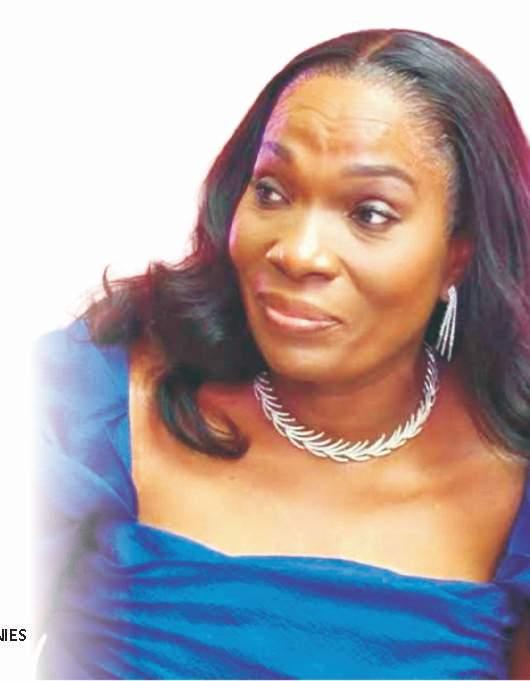
Acting Group Politics Editor DEJI ELUMOYE
Email: deji.elumoye@thisdaylive.com
08033025611 sms only
The Peril in El-Rufai’s Politics of Insecurity
Wale Igbintade feels that former Kaduna State Governor, Mallam Nasir El-Rufai’s recent outburst against Governor Uba Sani exposes the bitterness of a man who is determined to weaponise insecurity in pursuit of political revenge.
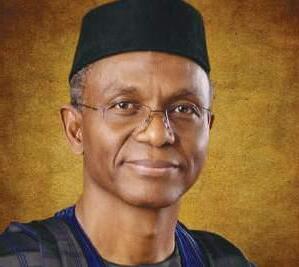
Mallam Nasir El-Rufai’s recent attempt to drag Kaduna State back into the dark alleyways of fear, distrust and political cynicism is as reckless as it is revealing. It exposes a man trapped in the web of his own alternative facts, a former governor so unable to reconcile himself to the peace and progress his successor has achieved that he now seeks to poison the well from which the people of Kaduna finally drink clean, life-giving water.
It is important, for truth and for the future of Kaduna State, to expose the dangerousness of this moment. For in El-Rufai’s latest outburst lies not merely the bitterness of one man, but the seeds of a perilous campaign to weaponise insecurity in pursuit of political revenge.
His most brazen allegation, that Governor Uba Sani’s administration has been “paying bandits” and “apologising” to them, is not merely false; it is maliciously designed to rupture the newfound stability Kaduna has enjoyed under Governor Sani. This claim, delivered with trademark confidence but zero evidence, is vintage El-Rufai: a deliberate distortion intended to stir suspicion, ignite conflict, and tar the achievements of a successor whose calm competence stands in embarrassing contrast to the chaos he inherited.
In one breath, El-Rufai sought to delegitimise a government that has painstakingly restored hope across the State; in another, he attempted to undermine the credibility of Nigeria’s security architecture, from the office of the National Security Adviser to the Presidency itself. But the facts, real facts, stubbornly resist his revisionism.
The Kaduna that Senator Sani inherited on May 29, 2023 was a broken, bleeding state. communities were traumatized by incessant attacks; farmers had abandoned their fields; women and children moved in fear; and entire local government areas were reduced to ghostly shadows of their former selves. This was the Kaduna of tears, tatters and despair; the Kaduna that El-Rufai left prostrate. No amount of self-mythologising can erase that record. Yet, in barely two and a half years, Governor Sani has accomplished what eluded his predecessor for eight long years: he stabilised the State, rebuilt trust,
restored dialogue, rekindled social cohesion and constructed a functional architecture for lasting peace.
And he did it without paying bandits. He did it without covert deals, without appeasement, without trading the dignity of the State for fragile calm. He did it through what is now widely known and studied as the Kaduna Peace Model, a holistic, multi-layered framework grounded in inclusion, justice, citizen participation, intelligence-driven security operations, and community-level reconciliation.
As Governor Sani has consistently articulated, peace is not decreed; peace is engineered. It emerges when communities feel seen, when development is equitably distributed, and when governance is moral, accountable and participatory.
The Kaduna Peace Model was never the product of parochial instincts or narcissistic posturing. It is the result of method, humility, data-driven decisionmaking and strategic collaboration across political, religious, ethnic and institutional lines.
Under Governor Sani, security institutions did not work at crosspurposes or suffer from gubernatorial micromanagement; instead, they found a partner who listened, coordinated and reinforced their operations with technology, intelligence and community support systems. The result is that farmers who once fled their lands now work them with confidence; markets that once shuttered now teem with activity; and rural communities that
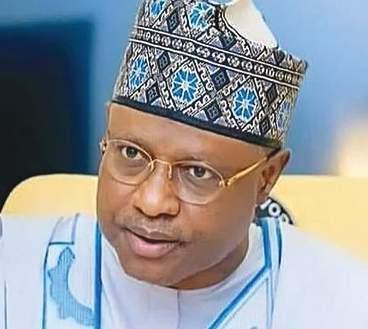
once cowered under the weight of fear now sing again with the hum of daily life.
Yet for El-Rufai, this progress represents not a source of collective joy but a personal insult. A more secure Kaduna leaves him with no convenient villains to hide his own failures.
A more united Kaduna exposes the divisions that flourished under his temperamental politics. And a more prosperous Kaduna, rebuilt brick by brick under Sani’s steady hand, renders hollow his narrative that he alone possessed the administrative genius to lead the State.
Thus, he reaches for his standard arsenal; deception, impressionistic storytelling, and the theatrics of victimhood, to sow doubts in the minds of citizens.
But Kaduna people know better. They have seen the transformation with their own eyes. They have watched Governor Sani expand access to primary healthcare; rehabilitate schools; strengthen maternal and child health systems; upgrade secondary health facilities; and recommit the State to education as the foundation of long-term peace and prosperity.
They have watched the government equitably deploy infrastructure across all 23 local governments: roads, bridges, markets, electrification projects, water systems and urban regeneration initiatives designed not to reward cronies but to knit the State together. They have witnessed the expansion of social inclusion programmes for women, youths, persons with disabilities and historically marginalized communities.
But perhaps the most striking evidence of Governor Sani’s purposeful leadership is Kaduna’s extraordinary agricultural renaissance. With the restoration of security as the fulcrum, the State has transformed
Kaduna s tate cannot afford this regression. n igeria cannot afford it. The politicization of security is not merely irresponsible; it is dangerous. l ives are at stake, communities are vulnerable, and the coordinated efforts of security agencies deserve support, not sabotage.
into Nigeria’s agricultural and food hub, a development that even the fiercest cynic cannot ignore. From 2023 to 2025, Kaduna’s agricultural budget soared from a modest N1.48 billion to an unprecedented N74.02 billion, a nearly 5,000% increase that surpasses continental benchmarks and reflects a profound shift in priorities from stagnation to abundance.
Mechanisation programmes have distributed hundreds of tractors, 500 power tillers, 10,000 irrigation pumps and more than 900 truckloads of fertilizer to smallholder farmers. Irrigation schemes such as Kangimi and Mashigin Kaya are being revived. Thousands of farmers have returned to their fields. Hundreds of thousands are enrolled under agricultural insurance schemes that protect them from climate and market shocks. And rural connectivity projects under RAAMP are linking producers to markets, reducing post-harvest losses and stimulating rural prosperity.
International partners have taken notice. The African Development Bank is collaborating with Kaduna on a Special Agro-Industrial Processing Zone that positions the State as a national hub for processing, logistics and agro-innovation. China selected Kaduna as one of six sites for the Nigeria-China Poultry Project, and the pilot site, expected to generate $450 million annually, create 50,000 direct jobs, cultivate 10,000 hectares of maize and soybean, and produce over one million eggs daily.
A $122 million partnership with StarAgri is constructing 3 million metric tonnes of modern storage capacity. And UNICEF has singled out Kaduna as the first State in Nigeria to fully implement Ready-to-Use Therapeutic Food distribution, underscoring a governance culture that places vulnerable children at the centre of State policy.
This is what bothers El-Rufai. Not any alleged “payments to bandits”, a fiction he concocted with characteristic bravado, but the glaring fact that his successor has achieved what he could not. And rather than confront that truth with humility, he turns, as he has done repeatedly in his political career, to
NOTE:

SOStainability Week ly
Edited by Oke Epia | e-mail:
Washing and hushing

Sustainability: The hidden cost of Nigeria’s real estate boom
Nigeria’s real estate and housing sector is expanding at a pace that is transforming entire cities. New estates, gated communities, and luxury towers are rising across Lagos, Abuja, and fast-growing peri-urban corridors, reshaping wetlands, coastlines, and land use patterns in the process. Yet this rapid physical expansion comes at a troubling cost.
Globally, buildings account for about 34 percent of energy demand and 37 percent of energy-related CO₂ emissions, with cement and steel adding nearly 18 percent more. In Nigeria, the residential sector consumes roughly 60 percent of national electricity, and estates rely heavily on diesel and petrol generators when the grid fails. Combined with a housing demand running into millions of units, the climate footprint of the sector is significant and set to grow.
In a sector with this scale of impact, one would expect leading real estate developers to be transparent about their climate responsibilities. But what our Sustainability Visibility Scan uncovered this week was the opposite. Across major firms shaping Nigeria’s real estate market, climate policies, emissions reporting, targets, and governance structures are largely absent. The sector is building fast, but saying almost nothing about how it intends to operate in a climate-constrained future. It raises serious questions about readiness, accountability, and whether climate risk has entered boardroom decisions in one of the country’s most consequential industries.
How we examined the sector
In the weeks up to November 22nd, 2025, our team conducted a comprehensive SOStainability Visibility Scan (SVS) across 11 leading real estate companies in Nigeria’s housing and real estate sector. The SVS is designed to measure only what companies are willing to make publicly visible. All information used in this scan was taken strictly from official websites.
No consideration was given to claims made on social media, in interviews, or through third-party commentary. This approach aligns with the Climate Change Act, which places transparency and public accessibility at the centre of national climate governance. If climate information is not visible, it cannot support accountability, guide investor decisions, or signal readiness for regulatory compliance.
The scan evaluates visibility across four core dimensions: Climate Policy, Climate Reporting, Climate Targets, and Climate Governance. Each dimension is scored from zero to three, producing a total visibility score out of twelve. The SVS then categorises companies as Achieving Expectation, Approaching Expectation, Below Expectation, or Non-Starter. These categories reflect climate visibility only; they do not assess the accuracy or quality of any claims. Visibility is the baseline on which meaningful accountability must be built.
What we found company by company
Our scan shows a sector that is almost entirely invisible on climate, and the pattern is consistent across the companies assessed. The most significant finding is the near-total absence of climate policy across the real estate firms reviewed. Companies like Adron Homes, Landwey, Dutum Construction, and Brains and Hammers each publish CSR pages, but these pages say nothing about emissions, energy use, land impact, or climate risk. Their websites emphasise charitable outreach or community donations, but none offer a structured climate policy that outlines how the business manages environmental risks. Others, such as UPDC, Land Republic,
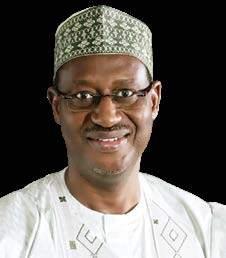
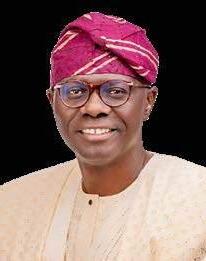
Sabreworks Real Estate, Besitz Group, and Veritasi Homes do not present any sustainability or environmental language at all. The scan shows zero policy visibility across these brands, meaning that some of the country’s most active developers operate with no public-facing climate stance whatsoever. Even companies with slight signals, like Eko Development Company, frame environmental messaging as part of CSR rather than a guiding corporate commitment. Across the board, development is marketed as lifestyle, luxury or investment potential, not as an activity with climate consequences. The reporting picture is even more alarming. With the exception of a single
ESG-themed knowledge PDF linked by Knight Frank Nigeria, none of the real estate firms publish sustainability reports, environmental disclosures, or climate-related documentation. Dutum, Adron, Landwey, UPDC, PWAN Homes, Land Republic, Besitz, Sabreworks, Veritasi, and Brains and Hammers all show zero reporting visibility. Their websites contain no emissions data, no energy profiles for their estates, no information on generator reliance, and no ecological data on wetland loss, land reclamation, or soil impact. This absence of reporting creates a complete blind spot. Nothing indicates that these companies measure their emissions internally, let alone disclose them. For a sector responsible for

high operational and embodied carbon, the lack of reporting is not a minor gap; it is structural invisibility that makes oversight, planning, and national alignment impossible. The gap becomes sharper when analysing target visibility. Most companies do not present a single measurable climate target. Adron, Landwey, Dutum, UPDC, Land Republic, Sabreworks, Besitz, Knight Frank Nigeria, and Veritasi Homes all score zero for climate targets. They do not communicate commitment to energy efficiency improvements, renewable energy integration, waste reduction, water management, or any environmental performance metrics. PWAN Homes appears to have sustainability language on an alternative domain, but because it does not appear on the main website, it cannot count under the SVS guidelines. Only Brains and Hammers and Eko Development Company show minimal target visibility, and even then, their statements amount to aspirations rather than quantifiable commitments. The absence of targets suggests that climate risk is not yet integrated into operational planning. A company without targets is a company without a plan, and in a sector whose emissions span every stage of construction, operations, and land conversion, this is a fundamental weakness.
Governance visibility completes the picture of a sector unprepared for climate accountability. None of the firms disclose sustainability officers, ESG units, or climate governance structures. UPDC, Land Republic, Sabreworks, Besitz, Adron, PWAN Homes, Veritasi, and Knight Frank Nigeria show zero evidence of governance oversight. Dutum, Landwey, and Brains and Hammers reveal only minimal HSE-style references, which reflect operational safety rather than strategic climate oversight. Eko Development Company acknowledges environmental themes under CSR, but also provides no governance structure. Across the dataset, climate responsibility sits nowhere in the organisational chart.
The silence is telling: without governance, no policy can be implemented, no data can be collected, no targets can be set, and no climate strategy can exist. It is the strongest indicator that sustainability is not yet institutionalised within the sector.
Taken together, these findings show a sector moving fast in physical development while remaining almost completely stagnant in climate transparency. The companies building Nigeria’s estates, apartments, and gated communities are not yet showing how they intend to manage the environmental and climate implications of their operations. This is not a marginal issue. It is the centre of the real estate sector’s sustainability challenge, and it defines the risks Nigeria will face as the sector continues to expand.
The social cost: Who pays the price?
The absence of climate visibility in Nigeria’s real estate sector is especially alarming because this industry is structurally high-emitting. Buildings account for well over one-third
SOStainability Week ly
Trends and Threads

NDC 3.0 : Embedding healthcare into climate policies
Nigeria, like the rest of the world, finds itself navigating a storm of intersecting realities occasioned by a rapidly changing climate. As heatwaves intensify, rainfall becomes erratic, floods sweep through communities, and vector-borne diseases expand their reach, the country’s health sector is placed under unprecedented strain. The Nigerian health system is overstretched, underfunded, and is confronting climate-induced vulnerabilities deeply unprepared.
For decades, the health sector in Nigeria has been defined by systemic inadequacies: weak primary healthcare infrastructure, inconsistent access to essential medicines, brain drain that continuously empties hospitals of skilled professionals, and an urban–rural divide that leaves millions with little to no healthcare access. These structural weaknesses have always harmed national progress, but in the era of climate change, they have become even more dangerous. Rising temperatures, changing disease patterns, contaminated water sources, displacement, and mental health pressures are magnifying existing challenges, pushing the system closer to breaking point. According to the World Health Organization (WHO), climate change is projected to cause approximately 250,000 additional deaths every year between 2030 and 2050, primarily from malnutrition, malaria, diarrhea, and heat stress alone. This statistic is not hypothetical for a country like Nigeria; it is a stark warning. With its high exposure to climate hazards and a health sector not yet equipped with climate-resilient systems, Nigeria stands among the countries most prone to these impacts. Its struggling health system reflects not only technical gaps but also deep-seated governance, planning,
Spotlight


and investment failures.
Health at the heart of climate policy
As highlighted previously on this page, Nigeria’s updated Nationally Determined Contributions (NDC 3.0) formally incorporates the health sector for the first time in the national climate commitment. This integration represents a turning point in Nigeria’s recognition of health as a core climate priority. It signals that the nation finally acknowledges that climate change is not merely an environmental or economic issue, but a direct and present health threat. It acknowledges health as an essential pillar of climate planning, and that climate-sensitive diseases, emergency preparedness, infrastructure resilience, and clean energy access for hospitals should be embedded in national climate commitments. It means the country is expected to strengthen disease surveillance systems that can detect outbreaks influenced by changing temperatures and environmental shifts. It means critical healthcare facilities will be upgraded to withstand climate
shocks through cleaner power sources, better waste management, climate-smart construction, and more reliable logistics systems, ensuring that hospitals do not go dark during heatwaves or floods.
The Health National Adaptation Plan (HNAP) outlines readiness and resilience actions ranging from governance reforms to capacity-building, community engagement, research, climate-sensitive disease control, early warning systems, and infrastructure reinforcement. While the plan seems to be comprehensive, a crucial question remains: what next? Even the most well-crafted frameworks are only as credible as their implementation. The plan’s monitoring, evaluation, and learning framework exists to ensure transparency and accountability, yet the real challenge is ensuring that these mechanisms are operationalised, financed, and publicly reported on without delay.
Nigeria’s pledge to achieve Universal Health Coverage (UHC) has ignited hope across communities. But it forces an honest reflection: can these reforms truly prevent health poverty where families are pushed
Nigeria ’ s cup at COP30
The curtain on COP30 drew to a close last week with fanfare and hard questions. For Nigeria, the summit was no mere attendance check; it was a testing ground for ambition, partnerships, and credibility. Vice-President Kashim Shettima mounted the podium to reposition Nigeria not as a plea-box but as a proposer, calling for the recognition of Africa’s ecosystems as global assets and unveiling plans to unlock finance for restoration and blue-carbon initiatives.
On the sidelines, Nigeria turned words into leverage. The country announced an ambition to mobilize up to US$3 billion annually through a new national carbon market framework and related instruments, a headline figure intended to attract private
capital, debt-for-nature swaps, and donor support. Equally tangible was a five-year Memorandum of Understanding (MOU) signed with the state of California, USA, on clean technology, urban transport, and low-carbon fuels. It is instructive that the US, as a country, did not attend the conference, having withdrawn from the Paris Agreement.
Nigeria’s submission of NDC 3.0, an economy-wide, integrated plan, was another milestone that placed the country among early African actors reframing ambition

into an implementable plan. However, a revised NDC is only the start- delivery depends on governance, finance, and project pipelines. Ambition without delivery risks being empty rhetoric.
On the global scale, COP30 endorsed a ‘Belem package’ that called for tripling adaptation finance by 2035 and confirmed cycles to operationalize and replenish the Loss and Damage Fund. This fund is especially critical for Nigeria, given its vulnerability to climate impacts.
into economic hardship by illness and inadequate care? And if climate impacts intensify, can a climate-unprepared health system deliver coverage that is equitable, sustainable, and accessible? These questions cannot be avoided. They form the backbone of the accountability Nigerians deserve.
A rights-based, sustainable approach matters
However, a climate-conscious health policy cannot succeed without prioritization anchored in justice and rights. Climate change is not an equal-opportunity crisis it hits hardest at those least responsible and least equipped to adapt. Rural communities, low-income households, women, children, the elderly, and people with disabilities all stand disproportionately exposed. To address this, Nigeria must adopt a rights-based approach to climate and health action, ensuring that policies are participatory, inclusive, transparent, and accountable. The Universal Declaration of Human Rights, Article 25, guarantees every human being the right to a standard of living adequate for health and well-being. This includes the right to clean water, safe food, medical care, and environmental conditions that support healthy living. Nigerians deserve an environment that does not poison their air, contaminate their water, or endanger their lives through preventable climate-related diseases.
This responsibility extends beyond national borders as well. At COP29 in 2024, the WHO released a report which emphasised that health must be central to global climate negotiations. For Nigeria, this means seizing every international platform to advocate for climate finance targeted toward health resilience not as a peripheral issue, but as a fundamental priority. It is time for Nigeria to assert health as a core component of its climate diplomacy, ensuring that adaptation funds, technical assistance, and global partnerships explicitly support the protection of human lives.
Ultimately, the path ahead demands not only policy commitments but action. Nigerians want and deserve a health system that is strong enough to survive climate shocks and compassionate enough to protect the most vulnerable. They look forward to a future where the promises captured in NDC 3.0 are implemented faithfully, not shelved as unfulfilled aspirations. Every target set, every adaptation plan drafted, and every health commitment outlined must translate into real, measurable, transformative change. Climate change will not wait for Nigeria to catch up. The Nigerian government must invest boldly, redistribute resources equitably, and demonstrate unwavering accountability. Because the health of the nation is not merely a sectoral concern. It is the foundation upon which every other national aspiration stands. The integration of health into climate policy is a breakthrough, but it must be backed by measurable action, political will, ethical leadership, and inclusive governance. The Nigerian government, together with all relevant stakeholders, must uphold its accountability to the people. The stakes are too high, and the cost of inaction too severe, to settle for anything less. The future of Nigeria’s health depends on what is done today. Climate change has issued its warning. The responsibility now lies with leaders, institutions, and every stakeholder to turn commitments into reality and to deliver a health system that is resilient, sustainable, transparent, and prepared for a climate-altered world.


www.thisdaylive.com
BUILDING
THE PATH TO MODERNISATION
China and Africa are resolved to work together, and build a community with a shared future, contends YU DUNHAI
page 21
MOBILE CONNECTIVITY AND DIGITAL ECONOMY
SONNY ARAGBAAKPORE Reckons that connectivity has helped in empowering many youths, and in driving digital literacy

RENEWED WAVE OF STUDENTS’ ABDUCTIONS

opinion@thisdaylive.com
MAJORITY OJI writes how Nigeria’s dual histories of abandonment led to a country in danger
FROM GROUNDNUT
PYRAMIDS, COAL
ENERGY TO A
The North was once a region of immense agricultural wealth, famed across West Africa for its towering groundnut pyramids, vibrant transSaharan trade, and a deeply rooted culture of commerce. From Kano, Katsina, and Zaria, the region thrived on agriculture and long-distance trading networks that predated colonial rule. These foundations helped shape some of Nigeria’s earliest post-independence leaders, including Sir Abubakar Tafawa Balewa and Sir Ahmadu Bello, who envisioned a North built on discipline, education, and agricultural strength.
But after independence, the region’s leadership drifted away from the principles of its founding fathers. Although the North produced several of Nigeria’s leaders, military and civilian, many of them presided over policies that stalled development at home. Instead of transforming the region’s agricultural potential or industrializing its vast land mass, successive leaders from the North became absorbed in a political culture that benefited a tiny elite while leaving the majority behind.
Over time, a rigid social hierarchy emerged: the Talakawas - the poor masses on one side, and the wealthy Alhajis, politicians, and other aristocrats on the other. Embedded in this system is a culture where loyalty flows upward and resources flow downward in trickles. For many ordinary Northerners, working for the rich, receiving stipends, or surviving on seasonal handouts became the norm. This dynamic ensured political control, but it also entrenched poverty, illiteracy, and dependency.
The turning point came with the discovery of oil in the Niger Delta. The centralization of petroleum revenues under military rule gave Northern political leaders unrivalled access to national wealth. With Abuja controlling the national purse, many Northern elites became disconnected from their region’s traditional economic engines. Groundnut pyramids disappeared. The cotton industry collapsed. Irrigation schemes were abandoned. Rather than closing the widening gap between the rich and the poor, oil wealth became a tool of political patronage. A strong and intoxicating elixir that deepened inequality and weakened the Northern region’s longterm prospects.
Instead of investing oil revenue in wellmeaning programmes to educate the
FRACTURED REPUBLIC

masses, revive agriculture, or modernize infrastructure, many Northern leaders channelled resources into personal networks and private pockets. The Talakawas, long accustomed to serving the wealthy, continued to provide political legitimacy in exchange for survival. But this model was unsustainable.
As poverty deepened, millions of abandoned children – almajirai - roamed the streets, vulnerable to radicalization and recruitment into criminal networks. The collapse of agriculture led to fewer job opportunities. The erosion of traditional authority weakened social control. And with a large youth population left without education, opportunity, or hope, the region became fertile ground for insurgency and banditry.
Today’s security crisis in Northern Nigeria cannot be separated from this long historical arc - the shift from agricultural prosperity to oil dependency; the rise of a political elite disconnected from the masses; and the entrenchment of a patronage system that exploited loyalty but ignored development. The same region that once fed West Africa is now battling poverty, extremism, and chronic insecurity.
The North’s tragic descent into chaos is no mystery. It is the logical outcome of decades of poor governance, systemic corruption, and the cynical manipulation of an impoverished populace.
Jihadist ideologies gained ground because the State lost credibility. Political leaders danced on oil money while their region sank. Armed groups flourished because institutions collapsed. It is therefore not surprising that terrorists now overrun villages, sack military brigades, and kill soldiers with impunity. The shadow over the North grows longer still, symbolized recently by the uncertain fate of General Musa Uba, the fourth Nigerian general claimed by this murky war.
But Nigeria’s insecurity is not a
Northern tragedy alone. The South-East, once a beacon of commerce, intellect, and coal-driven industrial promise, nurses its own wounds. Before the Civil War, Enugu’s coal mines supplied energy, while Igbo ingenuity supplied the nation with administrators, traders, and technocrats. The region produced towering national figures such as Dr. Nnamdi Azikiwe, Nigeria’s first President, and it overflowed with economic optimism.
Then came the fratricidal war of 1967–1970, a conflict born out of ethnic tension, mistrust, and political miscalculations. The aftermath left the South-East economically battered and psychologically fractured. The federal government promised ‘Reconstruction, Reconciliation, and Rehabilitation,’ which unfolded unevenly, leaving many in the region convinced they had been sidelined. Coal was quickly abandoned in favour of oil; federal appointments shrank; military inclusion dwindled. For numerous individuals, the hope of reintegration was a hollow promise.
By the beginning of the 2000s, these historical grievances were reignited as MASSOB was founded by Ralph Uwazuruike, who led a non-violent, symbolic, but resolute effort to rekindle the spirit of Biafra. The government's oppressive response, combined with the internal discontent among younger activists, created an opportunity for the emergence of new factions. In 2012, IPOB under Nnamdi Kanu emerged with fiery rhetoric, digital mobilization, and mass rallies. The group incessantly clashed with security agencies as the government attempted arrests and proscription.
Government actions hardened sentiments, drawing an even wider youth following.
From this charged atmosphere emerged the Eastern Security Network (ESN), IPOB’s armed wing, fashioned in imitation of the African National Congress’ uMkhonto we Sizwe. Though introduced as a protective force, the ESN increasingly became associated with violence, allegations its leaders deny. Splinter groups continue to multiply, many operating outside central command, and turning villages into battlefields.
Professor Oji writes from the Department of Mass Communication, Delta State University, Abraka

China and Africa are resolved to work together, and build a community with a shared future, contends YU DUNHAI

BUILDING THE PATH TO MODERNISATION
The G20 Summit was held in South Africa from 22 to 23 November, 2025. This marked the first time a G20 Summit has taken place on the African continent. The aspirations of African countries for independent development were deeply integrated into the global development agenda, and the voice of the Global South resounded throughout the Johannesburg Nasrec Expo Centre. This summit was a victory for multilateralism, a victory for the Global South, and above all, a victory for Africa.
During the summit, China and South Africa jointly launched the Initiative on Cooperation Supporting Modernization in Africa. The Initiative both carries forward the traditional friendly cooperation between China-Africa, and makes an important contribution to the global development agenda. It demonstrates the firm resolve and responsibility of China and Africa to march forward hand-in-hand in the new era, injects strong momentum into the development and revitalization of the African continent, and draws a new blueprint for building a China-Africa community with a shared future.
Ten years ago, on December 4, 2015, during the Johannesburg Summit of the Forum on China-Africa Cooperation (FOCAC), Chinese President Xi Jinping announced that China was willing to jointly implement with Africa the Ten Cooperation Plans, with a focus on helping Africa address three major development bottlenecks of lagging infrastructure, talent shortages and funding gaps. These efforts aimed to accelerate industrialization and agricultural modernization, achieving independent and sustainable development. This was the first time China explicitly proposed supporting Africa in accelerating its industrialization and agricultural modernization, ushering in a new phase of China-Africa cooperation.
Over the past decade, China has honored its commitments, continuously expanded its investment in Africa, and driven fruitful outcomes in China-Africa cooperation in areas such as industrialization and agricultural modernization. From the Ten Cooperation Plans to the Eight Major Actions, and onward to the Ten Partnership Actions in the new era, China’s cooperation mechanisms with Africa have been continuously refined, with cooperation domains steadily expanded. China has provided hundreds of billions of RMB in aid to Africa and implemented a large number of major projects benefiting the people, creating millions of jobs for Africa. With China’s support, Africa’s infrastructure, including railways, highways and ports, has seen significant improvement. Its industrialization is progressing steadily, while agricultural technology have continuously improved. All this fully demonstrates China’s sincere willingness and practical results in supporting Africa’s modernization.
The Initiative on Cooperation Supporting Modernization in Africa, jointly pro-
posed by China and South Africa, inherits and develops President Xi Jinping’s important propositions. It reflects the continuity and stability of China’s policy toward Africa, highlighting the distinctive features of China-Africa cooperation in keeping pace with the times and pursuing pragmatic innovation. Grounded in Africa’s actual needs and aligned with the laws of modernization, the Initiative establishes a comprehensive and multi-level cooperation framework. Its core content can be summarized as Six Major Principles and Six Major Directions. In terms of cooperation principles, the Initiative upholds six major principles, which are justice and equitability, openness and win-win, putting the people first, diversity and inclusiveness, sustainable development, underpinned by peace and security. It explicitly respects the sovereignty and independent choices of African countries, adheres to non-interference in internal affairs, supports “African solutions to African problems”, advocates an open and inclusive cooperation model, and ensures that the benefits of cooperation truly reach the African people.
In terms of cooperation directions, the Initiative focuses on six key areas of Africa’s modernization: the first, it aims to achieve modernization that is just and equitable, by upholding the principle of “Africa-initiated, Domestic Ownership, and Africa-led”, supporting African countries in exploring development paths suited to their national conditions, strengthening exchanges on governance experience and conceptual alignment, and promoting reform of the international financial system. The second, it aims to achieve modernization that is open and win-win, by supporting the signing of agreements on economic partnership for shared development between African countries and China, increasing the added value of African mineral resources, deepening industrial and supply chain cooperation, boosting infrastructure investment, conducting innovation cooperation, and promoting high-quality cooperation. The third, it aims to achieve modernization that puts people first, by focusing on food security, health, poverty reduction and other livelihood areas, and supporting the development of regional value chains.
Dunhai is China’s Ambassador to Nigeria
SONNY ARAGBA-AKPORE
Reckons that connectivity has helped in empowering many youths, and in driving digital literacy

MOBILE CONNECTIVITY AND DIGITAL ECONOMY
With active mobile lines put at 173.5million for a population of 220million and a teledensity of 80%, Nigeria's digital economy appears to be riding fast on the mobile connectivity boom.
The federal government recently announced a National Digital Economy Policy and Strategy 2020-2030 document, which seeks to reorient the Nigerian economy to capitalise on the numerous opportunities that digital technology offers. This strategy is intended to leverage digital technology to drive growth in every segment of the economy.
The Digital Economy Policy and Strategy programme is based on eight pillars: Developmental Regulation; Digital Literacy and Skills; Solid Infrastructure; Service Infrastructure; Digital Services Development and Promotion; Soft Infrastructure; Digital Society and Emerging Technologies; and Indigenous Content Development and Adoption.
According to a working paper on the subject,
“Digital upskilling of local Nigerian talent is a priority for the Nigerian governments in collaboration with the private sector. “
Major American technology firms have keyed into this by launching training programmes to augment the digital process. For instance, in 2021, Microsoft entered into a national partnership with the Nigerian government to train five million youth across the country in technical skills. Google also implemented several programs in Nigeria, including the Google Africa Developer Scholarship program, which provides training in mobile and web development. Google also offers digital skills training to young Nigerians, equipping them with the tools they need to flourish in the digital age. There is also the Digital Skills for Africa program, which is larger and aims to provide important digital skills.
The programme provides free training in internet marketing, web design, and data analytics. In May 2023, Cisco signed a deal with Nigeria’s National Information Technology Development Agency (NITDA) to bridge Nigeria’s digital divide and launched a new EDGE (Experience Design Go-to-market Earn) Centre in Lagos that provides incubation programs for SMEs.
The Cisco Network Academy, which is available at over 200 Nigerian tertiary institutions, has helped over 200,000 people improve their skills. Meta has several skilling programs for Nigeria, focused on empowering youth and driving digital literacy including: the Digital Marketing Scholarship program empowering youth to thrive in their digital careers; Safe Online with Meta Project, a digital literacy and online safety campaign equipping young people with the skills required to use the internet responsibly and safely; and Creator Lab Live, a unique educational program for content creators.
The National Bureau of Statistics (NBS) reports that the telecom industry was the third-largest contributor to real GDP in

Q2 2024, following agricultural production and trading industries, which generated 20.35% and 16.39%, respectively. Within the country’s digital economy space, the telecom industry, dominated by mobile network operators including MTN, Globacom, Airtel, 9mobile, as well as other Internet Service Providers (ISPs) angling to stimulate activities in every other area of the economy.
Nigeria has four major players in the GSM category: MTN, Globacom, Airtel, and T2 (formerly 9mobile). MTN is the largest mobile operator in the country in terms of the number of users, with a market share of 37.35%, followed by Airtel (28.93%), Globacom (28.40%) and 9mobile (5.32%). The buoyancy of Nigeria’s mobile telecommunications industry has been spurred by the country’s large population, thereby making the ICT sector a muchneeded boost for an economy that is overweighted towards oil revenues.
With a contribution of 9.2% to Gross Domestic Product (GDP), telecommunications is fast becoming a major plank of the economy, as it remains a major driver for other players in the economy.
Broadband penetration is now at 49.3 % about 21 % short of the projected 70% by December 2025. Fintech has emerged as one of Nigeria’s most active areas, causing substantial changes in delivery and access to financial services. The value chain includes digital payments, digital banking, point of sales (POS) services, lending platforms, asset/wealth management, insurance services, etc. Given Nigeria’s diverse demographics, the financial inclusion of millions of unbanked and underbanked Nigerians, particularly in rural areas, has been one of the most significant benefits of Fintech’s rise in Nigeria. Other benefits include increased innovation and entrepreneurship, as well as numerous opportunities to provide solutions to crossborder payment issues.
The prospects of developing smart cities in Nigeria is gaining more traction as both private and public sector stakeholders work towards achieving connected spaces driven by the Internet of Things. The major backbone for the country’s digital infrastructure is fueled by the Internet of Things (IoT).
Aragba-Akpore is a member of THISDAY Editorial Board

Editor, Editorial Page PETER ISHAKA
RENEWED WAVE OF STUDENTS’ ABDUCTIONS
Government must do more to safeguard schools
In the aftermath of the rising national security threats, the federal government and some northern states have ordered a shutdown of many schools. The renewed violence also prompted President Bola Tinubu to cancel trips to the G20 meeting in South Africa, and African Union-European Union summit in Angola. He thereafter directed the Minister of State for Defence, Bello Matawalle, to immediately relocate to Kebbi State and coordinate efforts to rescue the 24 schoolgirls who were abducted from Government Girls Comprehensive Secondary School, Maga. Four days later, gunmen attacked St Mary’s School in the Papiri community, Niger State, and abducted 303 students and 12 teachers. In addition, at a period the federal government is trying to dispute the American claim of persecution of Christians in Nigeria, a church was also attacked further south in Eruku, Kwara State, with two people killed and 38 worshippers abducted while on a thanksgiving service.

and attendance. Indeed, Amnesty International Nigeria has warned on the consequences of the ongoing wave of kidnappings in schools. “The trauma that comes with being abducted, or with the fear of being abducted, is going to prevent thousands of children from getting an education completely,” according to Country Director, Isa Sanusi who added that the psychological impact would be felt more in the North.
Meanwhile, between Chibok and now, more than 2000 students have been abducted, and some of them were released only after hefty ransoms were paid. Many have also died in the process. For instance, some 110 schoolgirls were abducted in Dapchi, Yobe State in 2018 while 300 schoolboys were seized in Kankara by gunmen on motorbikes two years later in 2020.
If the only solution is to order schools’ closure, the insurgents whose ideology frowns at Western education would have won
Although the abducted worshippers of the Kwara church, and the 24 Kebbi schoolgirls have been released, Nigeria is facing a renewed wave of violent attacks on schools and rural communities, creating fear and anxiety among parents, students, teachers and the entire populace. It is particularly noteworthy that the abductions at the Niger State Catholic school surpassed that of Chibok in Borno State where 276 schoolgirls were seized in 2014, prompting an international outrage. More than a decade after, the whereabouts of close to 100 of those students are still unknown. Thankfully, 51 of the abducted Papiri schoolgirls escaped from their captors.
However, the sheer weight of insecurity has made many parents in the north reluctant to send their wards to school in a region already plagued with millions of out-of-school children. Over the years, repeated attacks on schools by Boko Haram and other terror affiliates have claimed the lives of thousands of teachers while many others were displaced, impacting students’ enrolment
T H I S D AY
EDITOR SHAKA MOMODU
DEPUTY EDITOR WALE OLALEYE
MANAGING DIRECTOR ENIOLA BELLO
DEPUTY MANAGING DIRECTOR ISRAEL IWEGBU
CHAIRMAN EDITORIAL BOARD OLUSEGUN ADENIYI
EDITOR NATION’S CAPITAL IYOBOSA UWUGIAREN THE OMBUDSMAN KAYODE KOMOLAFE

EDITOR-IN-CHIEF/CHAIRMAN NDUKA OBAIGBENA
GROUP EXECUTIVE DIRECTORS ENIOLA BELLO, KAYODE KOMOLAFE, ISRAEL IWEGBU
DIVISIONAL DIRECTORS SHAKA MOMODU, PETER IWEGBU, ANTHONY OGEDENGBE
DEPUTY DIVISIONAL DIRECTOR OJOGUN VICTOR DANBOYI
SNR. ASSOCIATE DIRECTOR ERIC OJEH
ASSOCIATE DIRECTOR PATRICK EIMIUHI
CONTROLLERS ABIMBOLA TAIWO, UCHENNA DIBIAGWU, NDUKA MOSERI
DIRECTOR, PRINTING PRODUCTION CHUKS ONWUDINJO TO SEND EMAIL: first name.surname@thisdaylive.com
While all the boys were reportedly freed, five of the Dapchi girls did not make it back alive. In the latter controversial deal for freedom brokered by the last administration of President Muhammadu Buhari, a Christian girl (Leah Sharibu) was left behind reportedly on account of her faith. She is still in captivity.
The spate of abductions has prompted many to look out for ways to safeguard students and teachers from such threats. The Safe School Initiative launched in 2014 after the Chibok kidnap was meant to counter the growing attacks on the right to education and to build community security groups to promote safe zones for education, consisting of teachers, parents, police and community leaders. The Initiative has developed several measures to rebuild schools and provide improved security for schools, particularly in the north. But the challenges are overwhelming.
All indicators still suggest the threat of violence is not about to flag as many schools like Maga and Papiri are easy targets. But if the only solution is to order their closure, the insurgents whose ideology frowns at Western education would have won. The federal government and authorities in the 36 states must do more to safeguard schools in Nigeria.
Letters in response to specific publications in THISDAY should be brief (150-300 words) and straight to the point. Interested readers may send such letters along with their contact details to opinion@thisdaylive.com. We also welcome comments and opinions on topical local, national and international issues provided they are well-written and should also not be longer than (750- 1000 words). They should be sent to opinion@thisdaylive. com along with photograph, email address and phone numbers of the writer.
TRUMP’S THREAT AND THE WAVE OF ABDUCTIONS
On Saturday, November 1, 2025, U.S. President Donald J. Trump made his famous “guns-a-blazing” remark and described Nigeria as “the now disgraced country.”
On Sunday, November 2, he repeated that the United States could deploy troops to Nigeria or launch airstrikes to stop alleged killings.In what appears to be a reaction to Trump’s comments, terrorists and bandits in Nigeria have intensified attacks, especially the mass abduction of pupils, students, and worshippers.
On November 17, bandits abducted 25 female students from Government Girls’ Comprehensive Secondary School, Maga, Kebbi State. On November 18, daredevil gunmen attacked Christ Apostolic Church, Oke-Isegba, Eruku, kidnapping 38 worshippers during an evening service.
On Friday, November 21, gunmen raided St. Mary’s
School in the Papiri community of Niger State’s Agwara District, abducting 215 pupils and 12 teachers.That same day, after Trump appeared on Fox News and declared, “I think Nigeria is a disgrace,” reports emerged that ISWAP fighters had abducted 13 teenage girls working on farmlands in Askira-Uba, Borno State.
Armed groups across Nigeria have long understood the symbolic power of their targets. But the timing and composition of these attacks suggest deeper motives:
Three separate days. Four mass kidnappings. Hundreds of victims. Mostly female victims. This is not coincidence. This is strategy.Observers cite four major reasons: To escalate the situation and attract international attention. Nothing provokes global outrage like the mass abduction of schoolgirls or worshippers. Terrorists crave visibility, especially when a powerful international figure has threatened
intervention.Two, to instill fear and embarrass the government, psychological warfare, so to speak. Targeting female students and worshippers strikes directly at the heart of communities. Schools and places of worship are supposed to be sanctuaries; when they are violated, society trembles. Three, to use abducted victims, especially girls, as human shields. If the U.S. were ever to conduct air strikes, the bandits and terrorists understand the protective value of having dozens of young female hostages in their custody. Four, ransom opportunities: To exploit heightened international interest as leverage for ransom or negotiation. Heightened American interest increases the “value” of hostages. Criminal groups see an opportunity to negotiate for huge payouts.
Zayyad I. Muhammad, Abuja
08056356325
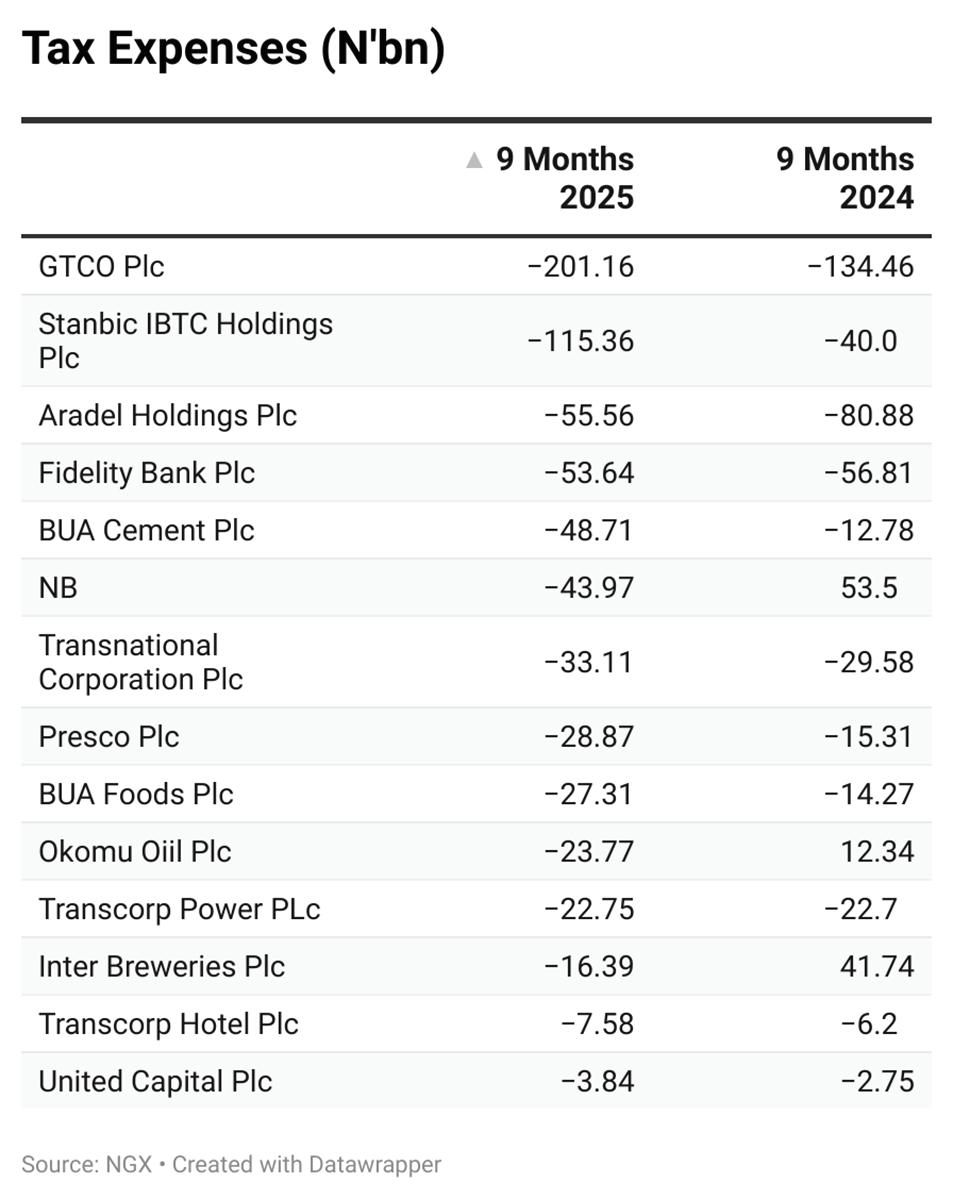
Ahead of the January 1, 2026 new tax regime take off, Seplat Energy Plc and 27 other companies listed on the Nigeria Exchange Limited (NGX), paid a whooping N3.06 trillion in taxes to the Federal Inland Revenue Service (FIRS) and other revenue agencies in nine months of 2025.
This represents about 176 per cent increase over N1.11 trillion paid in the corresponding
period of 2024.
The firms, listed in the telecommunication, banking, cement manufacturing, agro-allied, petroleum marketing, power generating, breweries, Fast-Moving Consumer Goods (FMCG), sectors play a critical role in Nigerian economy.
During the period under review, the 28 companies generated an estimated N7.6 trillion profit, about 77.4 per cent increase over N4.3 trillion in 2024.
Extracts from their nine months 2025 unaudited results released to the NGX revealed that Seplat Energy paid the highest tax, followed by Ecobank Transnational Incorporated MTN Nigeria Communications Plc and Dangote Cement Plc.
According to the results, Seplat Energy paid N732.35 billion, representing an increase of 133 per cent from N313.93 billion paid in nine months of 2024.
Seplat in a statement
Nume Ekeghe
A survey by the Central Bank of Nigeria (CBN) has revealed that deposit money banks accelerated credit expansion in the third quarter of 2025, with lenders reporting stronger loan availability and rising demand across secured, unsecured and corporate segments.
The CBN in its Credit Conditions Survey (CCS) posted on its official website highlighted a more supportive financing environment as economic sentiment improves, loan approvals increase and businesses gain broader access to working capital and investment funding. The data point to a positive shift in credit conditions: lenders widened access to credit, borrower demand strengthened across
most categories, and banks signalled greater confidence in underwriting new loans despite pockets of rising risk.
However, the report showed that while mortgage and credit-card demand softened. The overall credit climate, it added, reflects renewed momentum in lending activities offering relief for households seeking financing and firms
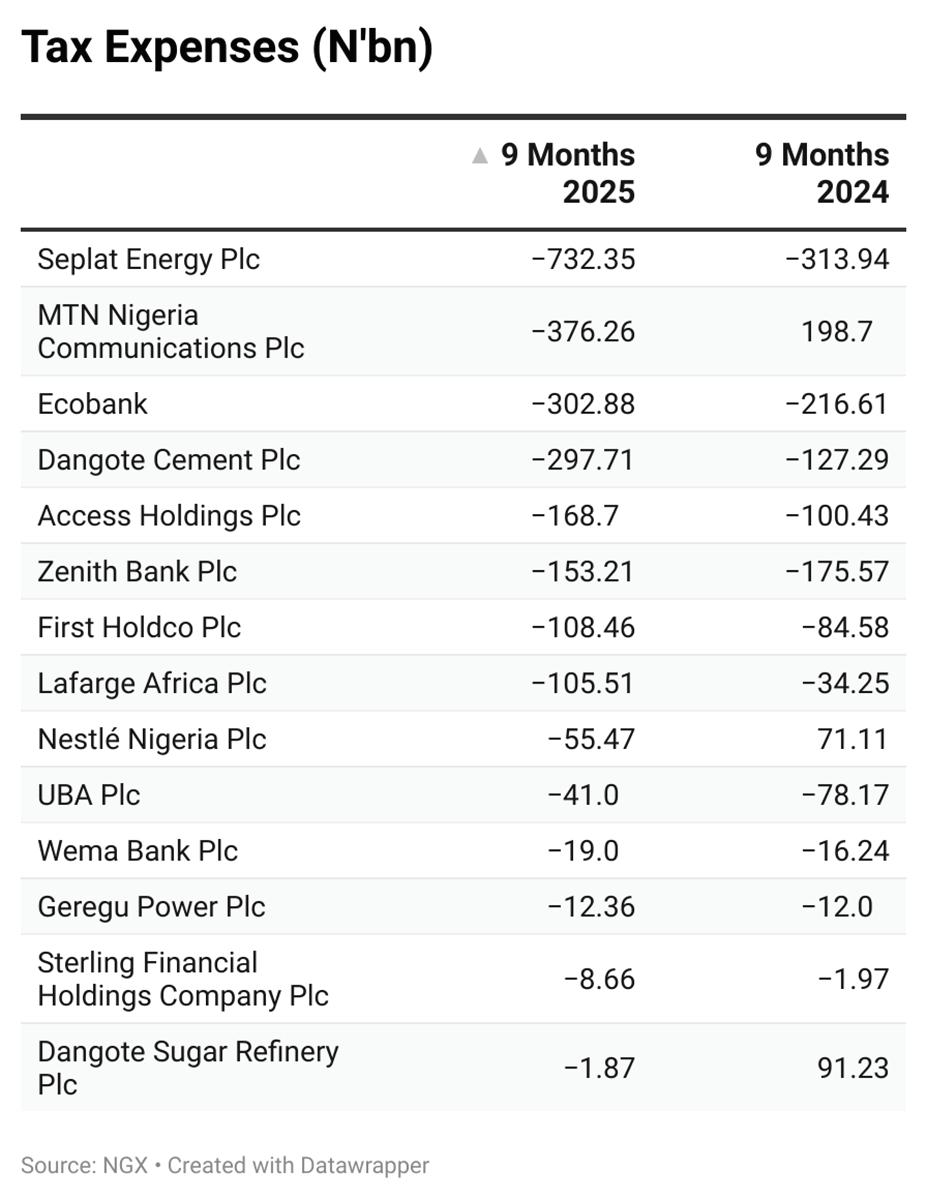
noted that, “The income tax expense of N732.4 billion for the interim period includes a current tax charge of N731.4 billion and a deferred tax credit of N0.98 billion based on the nine months of 2025 projected effective tax rate (ETR) of 83per cent
“This approach is in line with IAS 34 30c which states: “Income tax expense is recognized in each interim period based on the best estimate of the weighted average annual
income tax rate expected for the full financial year. Amounts accrued for income tax expenses in one interim period may have to be adjusted in a subsequent interim period of that financial year if the estimate of the annual income tax rate changes.
“The split between current and deferred tax charge was determined using management’s estimate of the full year weighted average effective annual income tax rate expected for
individual taxable entities within the group.”
For Ecobank Transnational Incorporated, the PanAfrican financial institution tax expenses stood at N302.88 billion, up by 39.8 per cent from N216.61 billion in nine months of 2024. MTN Nigeria declared N376.3billion tax expenses during the period, as s against tax income of N198.7 billion in nine months of 2024.
looking to scale operations.
“Household lending spreads widened modestly, while corporate loan pricing moved in mixed directions. Default rates improved for secured loans, even though unsecured and corporate segments recorded higher delinquencies, suggesting that the recovery in credit quality remains uneven. Lenders reported increased credit
availability for Secured, Unsecured and Corporate lending in Q3 2025.
“The demand for credit increased for Secured, Unsecured and Corporate lending. The overall spreads on Secured and Unsecured lending rates to households relative to Monetary Policy Rate (MPR) widened in Q3 2025. For Corporate lending, spreads on loan relative to MPR for Medium Private Non-financial
Corporations (PNFCs) and Other Financial Corporations (OFCs) lending narrowed while that of Small business and Large PNFCs widened in the review quarter. Lenders reported lower default rates for Secured lending, while Unsecured and Corporate lending of all business types recorded higher default rates,” it said.
Dangote’s Refinery, Nigeria’s Last Stand Against Oil Dysfunction
Festus Akanbi
Imagine a man pouring his heart, soul, and a staggering $20 billion into a dream that could finally unshackle Nigeria from decades of humiliation over fuel imports. That is Aliko Dangote, Africa’s wealthiest son, who didn’t just lament Nigeria’s broken energy system but built the continent’s biggest refinery to fix it.
In the words of Daniel Ochonma, founder of Forum for Global Nigerian Professionals, “When the project came alive, it should’ve been a national celebration. Instead, it triggered fierce pushback from labour unions, fuel marketers, and entrenched forces that have profited handsomely from Nigeria’s dysfunction. Some early battles have cooled, but the scars show how deeply the resistance runs.”
The truth is, Dangote has been brutally frank about the forces he’s up against. He once said Nigeria’s oil cabal is more vicious than the global drug cartel, a network so powerful that even he underestimated its reach. Yet he pushed on.
According to Ochonma, who is also a chartered banker and public affairs analyst, Dangote Refinery is not just producing fuel; it represents what Nigeria could finally become: self-sufficient, competitive, and proud. With the capacity to meet our domestic needs and export surplus, it could inject billions into the economy. So why the chaos? Why the roadblocks?
Weight of a Broken Past
“To understand, look back at Nigeria’s long, painful oil dysfunction. Nearly two decades ago, Dangote attempted to buy stakes in Nigeria’s dying stateowned refineries, a move that could have revived them. Labour unions revolted, and President Umaru Musa Yar’Adua reversed the sale. Those refineries have since rotted away, burning public money while producing nothing.
“From 1999 to 2023, successive governments spent over $26.5 billion on ‘turnaround maintenance.” The outcome? Zero. Not one refinery ever returned to full operation. President Buhari, who once served as Petroleum Minister, promised a fix. By the time he left, the refineries remained idle monuments to waste,” Ochonma recalled.
According to him, corruption, red tape, and secrecy have long crippled the downstream sector. “Former NNPCL boss Mele Kyari is now under probe, with courts freezing linked accounts. Yet Nigerians aren’t fooled; the big shots who signed off billions still walk free. Every new “probe” triggers the familiar reaction: “Na today?” Meanwhile, a crude-rich nation continues importing most of its fuel, draining foreign reserves and punishing ordinary citizens with high prices.”
Who Controls Distribution?
Analysts believed that the latest conflict was about control of delivery. Dangote’s introduction of more than 4,000 CNG-powered tanker trucks, cleaner, safer, and efficient, sparked outrage. Unions called it union-busting. Marketers and tank farms accused him of trying to swallow their turf. Beneath the noise lies fear: if Dangote manages production and distribution end-to-end, many depots will be idle, debts will balloon, and entire business networks will shrink. To them, it’s not competition, it’s existential. Globally, there’s no single model for fuel distribution. Some countries allow refineries to distribute; others rely on independent marketers. What matters is strong regulation and fairness. Nigeria, however, has operated on quicksand, weak rules that encourage cartel behaviour and backdoor deals.
Rewriting Nigeria’s Economic Story
Here’s the upside: In his estimation, Ochonma said that at full capacity, Dangote’s refinery could slash Nigeria’s fuel import bill by $25–30 billion annually, strengthen the naira, stabilise pump prices, and create thousands of jobs. In November 2025, when the refinery cut its petrol gantry price
from N877 to N828, marketers followed, giving Nigerians long-awaited relief. For the first time in decades, Nigeria has a real shot at exporting refined fuel and becoming a regional powerhouse.
In his words, infrastructure alone is not enough. According to him, Nigeria needs innovative policies, strict enforcement, open competition, and honest engagement with workers. If fairness triumphs over vested interests, this could spark an industrial renaissance. If not, it becomes yet another wasted opportunity.
Heart of the Battle
Saying attacks on Dangote are really attacks on Nigeria’s progress, Ochonma believed that millions struggling with fuel scarcity, inflation, and unemployment stand to benefit the most if this refinery succeeds, adding that failure means returning to complete import dependence, bleeding foreign reserves, and scaring away investors.
“Supporting Dangote is not worshipping a billionaire; it’s backing a bold national gamble. He could have hidden his wealth abroad, but he invested it here, betting on Nigeria. That patriotism should be protected, not sabotaged.
“In the end, the Dangote Refinery is more than a business. It is a test of whether Nigeria can finally confront its energy rot. The stakes are enormous, and the cost of failure is a nation permanently stuck in dysfunction. We cannot afford to let that happen,” he stated.
NAICOM Underscores Importance of Performance Management
The National Insurance Commission( NAICOM), has underscored the importance of Performance management in the life of institutions saying it has remained the foundation of any effective institution.
NAICOM, stated this at a performance management workshop held in Ikot-Ekpene,
Akwa Ibom State.
Addressing participants, the Deputy Commissioner for Insurance Technical, Dr. Usman Jankara who represented the Commissioner for Insurance, Mr Olusegun Ayo Omosehin, said given all important nature of performance management, NAICOM would embark on decisive push towards strengthening
Lagos this weekend.
The Governor of the Central Bank of Nigeria (CBN), Mr. Olayemi Cardoso, is set to address industry leaders and top financial sector stakeholders at the 2025 Annual Bankers’ Dinner organised by The Chartered Institute of Bankers of Nigeria (CIBN).
CIBN in a statement noted that the highprofile event, scheduled for 28 November 2025, remains one of the most prestigious gatherings in Nigeria’s financial sector and will take place in
Recognised as a major agenda-setting platform, the Annual Bankers’ Dinner offers the CBN Governor the opportunity to articulate monetary policy direction, review economic developments, outline regulatory expectations.
CIBN President and Chairman of Council, Prof. Pius Deji Olanrewaju, stated that this year’s edition, which is the 60th, underscores the sector’s commitment to strengthening financial intermediation, enhancing system resilience, and supporting sustainable economic growth.
institutional accountability and operational excellence.
Jankara, said the workshop marked a strategic move to embed a performance-driven culture across the Commission.
He said for NAICOM,
Shareholders of SUNU Assurances Nigeria Plc, have approved a comprehensive recapitalisation programme that will enable the company raise up to N9 billion to meet the new Minimum Capital Requirement (MCR) for non-life insurers under the Nigerian Insurance
Kayode Tokede
Bitget, the world’s largest Universal Exchange (UEX), through its Chief Executive Officer, Gracy Chen has disclosed that trading in Bitget’s US stock-linked perpetual futures has surpassed $5 billion in cumulative volume just days after a prior update signaling that everyday
it was central to align the efforts of every staff member with the Commission’s long-term vision of a safe, stable, and globally competitive insurance sector capable of supporting Nigeria’s
Industry Reform Act (NIIRA) 2025.
The approval was granted at the company’s Extraordinary General Meeting (EGM) held on recently Lagos, which recorded an impressive physical turnout of shareholders.
Speaking at the meeting, Chairman of the Board, Mr. Kyari Abba Bukar, said the recapitalisation
users increasingly want stocks and crypto in the same app, with one balance and a 24/7, mobile-first experience.
Chen in a statement explained that, “Recent activity has clustered around MicroStrategy (MSTR), Tesla (TSLA), and Apple (AAPL)—tickers that already dominate social finance conversations.
economic ambitions.
He outlined NAICOM’s five strategic goals as policyholder protection, supervisory efficiency, financial stability, innovation and sustainability, and expanded insurance penetration. He emphasised that these priorities were supported by targeted objectives including riskbased supervision, digital transformation, and improved governance.
was necessitated by the NIIRA 2025 regime, which raised the MCR for non-life insurers from N3 billion to N15 billion, with a compliance deadline of July 30, 2026.
“As at September30, 2025, the company requires N9 billion to close the gap, which makes it imperative that we take decisive action to strengthen our capital base,” he said.
Bitget now lists 30+ USDTmargined stock perpetuals with up to 25× leverage and promotional fees as low as 0.0065% (limited-time 90% fee reduction across all stock futures).
“Users fund in USDT, trade BTC/ETH/SOL side-by-side with AAPL/ TSLA/NVDA/MSTR, and cash-in/cash-out via P2P or direct rails where
Bukar added that the recapitalisation would enhance SUNU’s balance sheet, deepen underwriting capacity, attract fresh investment and reinforce market presence. He also disclosed that the company plans to address its free-float deficiency on the Nigerian Exchange (NGX) as part of the capital-raising exercise.
available—all without opening a second brokerage.
“Today you can trade stock-linked perpetual futures: coverage launched with 25 leading company tickers (e.g., Google, Apple, Amazon, Meta, Microsoft) and has expanded, with index contracts (e.g., broad-market/tech baskets) added for one-tap exposure,”he said.
2025: Policymakers, Financiers, Devt Partners, Researchers Gather for Solewant Group’s Africa Energy Summit
Olusola Adeoye
Transformative technologies such as Artificial Intelligence (AI), robotics, automation, data analytics, and other digital innovations will take the centerstage as global oil and gas industry stakeholders gather for the 9th annual energy summit of the Solewant Group, an industry leader in pipe manufacturing and coating services.
The annual summit attracts policymakers, energy executives, financiers, development partners, and researchers from across Africa and the rest of the world, who brainstorm on strategies for building a sustainable and technologically advanced energy future for the continent.
This year’s summit, the 9th in the series, is scheduled to take place from November 27–28, 2025, at the Solewant Industrial Park, Alode-Onne, Port Harcourt, Rivers State. Nigeria from 9:00 am to 5:00 pm daily.
Themed “Emerging Technologies and the Future of Sustainable Energy Development in Africa,” the 2025 summit seeks to spotlight how transformative technologies such as Artificial Intelligence (AI), robotics, automation, data analytics, and other digital innovations are redefining the frontiers of Africa’s energy transition.
Announcing the summit in a joint statement earlier issued in Abuja at the end of a world press conference, two senior executives of the company, Dr. Benjamin Ubleble and Dr. Felix Onyela, stated that these technologies are not just tools of convenience but that they represent a paradigm shift in how businesses enhance operational efficiency, local content participation, capacity building and strategic decision-making across the energy value chain.
“By integrating smart technologies into exploration, production, and distribution systems, Africa can unlock new levels of productivity, improve resource optimization, and foster environmentally responsible growth,” the statement noted.
Giving details on the expectations of the global industry leaders, the statement added that the summit will also examine how digital transformation accelerates knowledge transfer, capacity development, and business intelligence.
“These are strong indices that are capable of enabling homegrown enterprises to compete globally, attract investments, and deliver outcomes with unprecedented precision, agility, and sustainability.
“The two-day event will gather policymakers, energy executives, financiers, development partners, and researchers from across the continent to discuss strategies for building a sustainable and technologically advanced energy future for Africa. It serves as a premier platform for investment matchmaking, policy dialogue, and knowledge exchange within the energy, oil and gas, and manufacturing sectors,” the statement explained.
Key highlights of the summit will include: key paper presentations from industry leaders and government representatives; strategic panel discussions on technology and energy integration; technical presentations and emerging research and keynote messages from NNPC, IOCs, and EPC companies.
Other key highlights include: exhibitions of intelligent energy solutions; case studies from across Africa and beyond; capacity-building workshops and networking opportunities
Also speaking ahead of the event, the Group Managing Director and CEO of Solewant Group, Mr. Solomon Ewanehi, stated that the 9th Solewant Energy Summit provides an unparalleled platform for stakeholders to collaborate and innovate.
“We are committed to building bridges between policy, investment, and technology
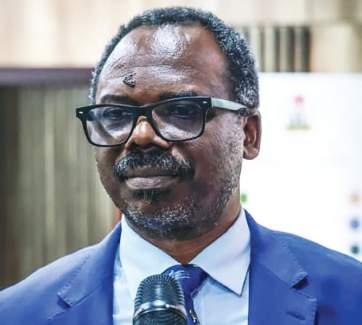
to accelerate Africa’s sustainable energy future,” he added.
One of the expected key outcomes of the 9th Solewant Energy Summit will be the promotion of strategic Investment Commitments across Africa’s Energy Value Chain
The summit will help facilitate and foster new partnerships and funding pledges between governments, investors, and private sector players- unlocking capital for energy infrastructure, manufacturing, renewable projects, and technology-driven ventures across Africa.
There will also be a launch of the “Africa Energy Innovation Network (AEIN)”
This is a strategic multi-stakeholder network to drive collaboration among energy innovators, research institutions, financiers, and policymakers- creating a knowledge-sharing hub for emerging technologies and sustainable energy practices.
The summit also aims to strengthen Local Content and Capacity Development Frameworks.
Through policy dialogues and technical sessions, the summit is expected to produce actionable recommendations to deepen local participation, enhance industrial skills, and strengthen indigenous technology deployment in the oil, gas, and renewable sectors.
This year’s summit will also facilitate Business Matchmaking and Partnership Opportunities.
Dedicated matchmaking sessions will connect investors, project developers, and corporate leaders- fostering joint ventures, technology transfers, and long-term partnerships that are designed to expand intra-African trade under the AfCFTA framework.
The summit will also help to develop Policy and Regulatory Roadmap for Energy Transition and Digital Transformation.
The summit aims to come up with a high-level communiqué, highlighting priority policy directions for governments and regional bodies- aimed at integrating digital technologies, improving regulatory coherence, and accelerating Africa’s clean energy transition.
During the summit, there will also be
(NOGOF) 2025, held in Yenagoa, Bayelsa State; from the Namibia Oil and Gas Conference in Windhoek to the 4th edition of the Intra-African Trade Fair (IATF 2025) convened by Afreximbank at SAFEX Building in Algiers, Solewant Group has continued to showcase innovative technological solutions and enormous technological breakthroughs in its state-of the-art industrial area in Nigeria.
a recognition of excellence through the Solewant Awards & Gala Night Powered by SETI. Outstanding organisations and individuals who are shaping and contributing to Africa’s industrial and energy advancement will be celebrated, inspiring excellence, innovation, and leadership across the sector.
Solewant Group has not only sustained leadership in pipeline coating, fabrication, and asset integrity management across Nigeria- it continues to pioneer new frontiers in industrial and energy infrastructure development. Its industrial park at Alode-Onne now includes one of Africa’s most advanced multi-layer pipe coating plants, a dedicated pipe bend multi-layer coating plant (commissioned in mid-2025) developed in partnership with Euro-American OEMs, and full steel pipe milling capabilities.
At major global platforms such as OTC Houston and the IATF 2025 in Algiers, Solewant has showcased integrated solutions- spanning coating systems, fabrication, specialized coatings, and energy sector training and certifications- reinforcing its role as an African industrial innovator. Moreover, its strategic investments and policy advocacy have generated recognition. For instance, the Nigerian Content Development and Monitoring Board (NCDMB) publicly commended Solewant’s new pipe bend coating plant as evidence of “what can be achieved when local companies are empowered to own and operate strategic assets.”
Thus, the upcoming Summit builds on a robust foundation: past editions have catalyzed partnerships, drove investment pledges, and influenced policy discourse; and this year’s edition now aims to deepen technology transfer, local capacity, and cross-border industrial alliances across Africa’s evolving energy landscape. For more than two decades, Solewant Group, has retained its position as Nigeria’s foremost pipe production, coating and energy sector industrial solutions provider, showcasing technologies to the global oil and gas industry.
From the 2025 Offshore Technology Conference (OTC) held in Houston, Texas, United States of America (USA), to the Nigerian Oil and Gas Opportunity Fair
At the OTC, Solewant Group showcased its leadership position in technological innovation in the global oil and gas industry, in a powerful presentation before international and Nigerian audiences. At the IATF 2025 in Algiers, Solewant Group presented its diversified portfolio: Solewant Nigeria Limited (SNL) – Africa’s largest multi-layer pipe coating plant, delivering 3LPE, 3LPP, 5LPP, FBE, and Concrete Weight Coating solutions; Field Joint Coatings Ltd. (FJCL) – Onshore and offshore field joint coating and rehabilitation services; and SSPC – Specialty protective paints and coatings. Others include: Pipe and Metals Industries Ltd. (PMI) – Steel pipe and metal fabrication; and SETI – Industry-focused energy training and certification. At the NOGOF 2025, Ewanehi announced the unveiling of ‘Solewant Group Roadmap Plus to deepen its advancement in technological innovation and also boost its contributions to Nigeria’s industrial development and energy transition. The unveiling of the ‘Solewant Group Roadmap Plus’ was part of the company’s renewed commitment to its 10-year strategic vision. Solewant Group also joined senior government officials and other global players in the oil and gas, energy, minerals as well as maritime industries to dissect Gulf of Guinea (GoG) energy, maritime and investment opportunities recently-a high-level roundtable convened by The New Diplomat in collaboration with the Gulf of Guinea Commission(GGC) during the recent 80th Session of UN General Assembly (UNGA 80) in New York, United States. It will be recalled that Ewanehi and other global oil and gas industry players, including the Managing Director of TotalEnergies Nigeria, Mattieu Bouyer; Managing Director of ExxonMobil Nigeria, Jagir Baxi; and the Commission Chief Executive (CCE) of the Nigerian Upstream Petroleum Regulatory Commission (NUPRC), Gbenga Komolafe, were also in Dorchester, London, for NUPRC’s Roadshow held recently.
Other industry leaders who showed strong presence include: Chief Executive Officer (CEO) of Seplat, Mr. Roger Brown; Chairman of AA Holdings, Austin Avuru; the Chairman of Governing Board, Organisation of Petroleum Exporting Countries (OPEC), Mr. Ademola Adeyemi-Bero, and federal lawmakers. At the event, Ewanehi had listed transparency, innovation, collaboration, and emerging technologies as key drivers necessary for the growth of Africa’s energy sector.
In order to boost President Bola Tinubu’s efforts to prioritise locally made goods and services, and reduce import dependency by stimulating local production through the ‘Nigeria First Policy, the Secretary to the Government of the Federation (SGF), Senator George Akume recently commended efforts of Solewant Group and other Nigerian indigenous companies in developing local capacities and capabilities needed to advance the federal government’ s Nigeria’s First Policy.
Speaking when Ewanehi paid him a courtesy visit in Abuja, Akume called on indigenous companies across all sectors of the economy to leverage the full potentials of the Nigeria First Policy, which he described as a strategic initiative designed to promote local content, stimulate economic growth and strengthen Nigerian industries for economic development.
• Adeoye writes from Lagos.
DBN Drives Momentum for Women-led MSMEs, Unveils Investor-ready Venture
Nume Ekeghe
Women-led enterprises took the spotlight as the Development Bank of Nigeria (DBN), with support from Agence Française de Développement (AFD) and Sterling One Foundation, convened investors, ecosystem players and high-growth female founders for the Women Investment Readiness Accelerator (WIRA) Demo Day in Lagos.
The event reaffirmed DBN’s expanding role in strengthening Nigeria’s MSME landscape particularly for women entrepreneurs who remain essential contributors to job creation, innovation and inclusive economic growth.
Sterling One foundation in a statemnt noted that the Demo Day marked the culmination of an intensive accelerator cycle funded and championed by DBN, featuring structured capacitybuilding, mentorship, and hands-on business
development support for women-led enterprises across agriculture, food processing, waste management, retail, technology, fashion and other impact-oriented sectors. A major highlight was the pitch showcase, where founders presented refined, scalable business models to investors, financial institutions and business support organisations unlocking pathways to funding, partnerships and market expansion.
Speaking at the Demo Day, Managing Director/CEO of Development Bank of Nigeria Plc, Dr. Tony Okpanachi, underscored the value of sustained investment in women-led enterprises. “What we witnessed here today confirms that investing in women entrepreneurs yields measurable economic and social impact. Their businesses are innovative, resilient, and positioned for scale. At DBN, we remain committed to ensuring that women-led MSMEs have access not just to financing,
but to the knowledge, networks, and market opportunities that enable sustainability and growth. This Demo Day is a clear step forward in strengthening Nigeria’s entrepreneurial landscape,” he said.
Also addressing participants, CEO of Sterling One Foundation, Olapeju Ibekwe, stressed the importance of platforms that elevate women’s business leadership and visibility. “The women we celebrated today are solutions-builders. They are tackling real challenges with creativity and determination. But potential alone is not enough — support, connections, and capital are essential. Through WIRA, our goal has been to close the financing and opportunity gap by providing more than training — we provided guidance, confidence, and access. Today’s pitches are proof of what happens when women are empowered to take up space and lead boldly,” she stated.
Dun & Bradstreet: Over 600M Businesses Identified through DUNS Number
Dun & Bradstreet Nigeria says more than 600 million businesses worldwide are now recognised and verified through the DUNS Number, reinforcing its status as a global standard for business identity, credibility, and crossborder commerce.
In a statement, Senior Manager of Customer Success & Engagement at Dun & Bradstreet Nigeria, Atinuke Williams, noted that from multinational corporations to emerging enterprises, the nine-digit identifier has become essential for proving legitimacy and accessing financing, with over 90 percent of Fortune 500 companies relying on the system.
“The DUNS Number — short for Data Universal Numbering System — assigns each business a unique global identity, enabling companies to distinguish themselves, build trust with partners
and access international opportunities,” she said. “For many organisations, the number has become critical to securing investment, strengthening reputation and participating in global supply chains.”
Williams added that in Nigeria, Dun & Bradstreet Nigeria remains the only authorised provider of the DUNS Number, connecting local companies to a global network of verified enterprises.
She said the identifier has evolved beyond a simple listing tool into a gateway to a data-driven ecosystem where trust underpins growth. “Companies with a DUNS Number benefit from enhanced visibility and credibility, especially when engaging international partners.”
Beyond issuing the identifier, the company also
offers a suite of business intelligence and analytics solutions designed to help organisations grow securely and manage risk.
These include the DUNS Registered Seal (DRS), which allows verified businesses to display the DUNS Registered™ badge; Vend-R, a vendor risk-management solution for assessing and monitoring third-party exposure; Finance Analytics for improved lending and investment decisions; and Risk Analytics for identifying and mitigating threats.
It also provides ESG Registered, which helps firms demonstrate their environmental, social and governance performance, as well as Dun & Bradstreet’s Hoovers, a sales intelligence platform that offers access to millions of company profiles and decision-maker insights.
LASTCOC Commends NPA over Improved Traffic Flow at Apapa
The Lagos State Truck and Cargo Operators Committee (LASTCOC) has applauded the round-the-clock presence of the Apapa Port Manager in ensuring improved traffic flow that has enhanced the movement of export trucks into the Lagos Port Complex (LPC).
Repair works on the Marine Bridge by the Federal Ministry of Works had recently triggered a resurgence of gridlock along the Ijora–Apapa access roads, leaving import and export trucks stranded for hours.
The Chairman of
LASTCOC, Mr Shittu Lukmon, in a statement, said the daily 24-hour engagement of the Nigerian Ports Authority (NPA) leadership has significantly enhanced traffic conditions on port access roads and eased congestion at the Export Processing Terminals (EPTs) across Lagos.
Despite the ongoing repair works, NPA management has consistently ensured the seamless movement of inward and outward vehicles along the Apapa corridor thereby reducing the impacts of temporary delays caused
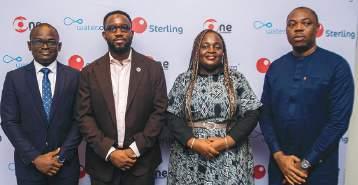
by the construction activities
Lukmon praised the Apapa Port Manager’s commitment and dedication to duty, noting that the trucking community has every reason to support his efforts toward ensuring a more efficient port system at the Lagos Port Complex.
“This is commendable work from the Apapa Port Manager. I have never seen a port manager like him. I’ve seen him at the port on Saturdays and Sundays, making sure the entire system runs seamlessly,” he said.
Champion Breweries Commences N15.91bn Rights Issue to Strengthen Expansion Strategy
Kayode Tokede
Champion Breweries Plc, yesterday announced that it has commenced a rights issue worth N15.91 billion on the Nigerian Exchange Limited (NGX).
The brewery maker has offered to existing shareholders a rights issue of 994,221,766 ordinary shares priced at N16 per share.
This followed approval by the Securities and Exchange Commission (SEC), marking the first phase of a two-step capital-raising programme aimed at strengthening the company’s expansion strategy.
The company’s stock price closed November 25, 2025 at N13.20 per share on the Exchange.
The offer, structured on the basis of one new share for
every nine existing shares held, opened on Monday, 24 November 2025 and will run until Monday, 5 January 2026. The qualifying date for determining eligible shareholders was set for 4 September 2025.
The company in a notice to the NGX, disclosed that the proceeds from the rights issue will support the strategic acquisition of the Bullet brand, a move

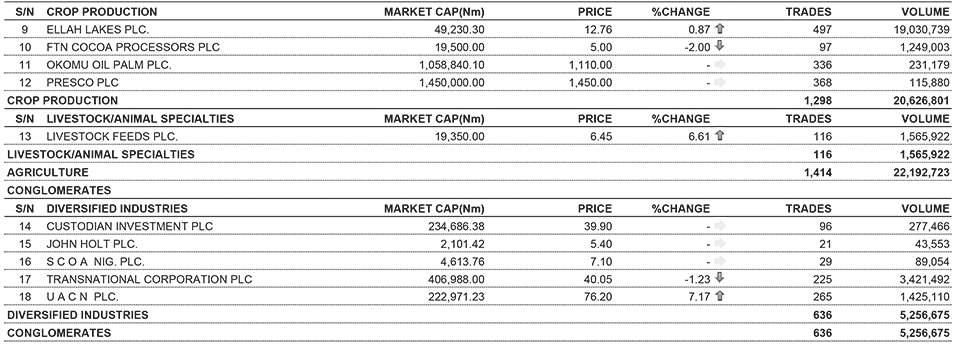

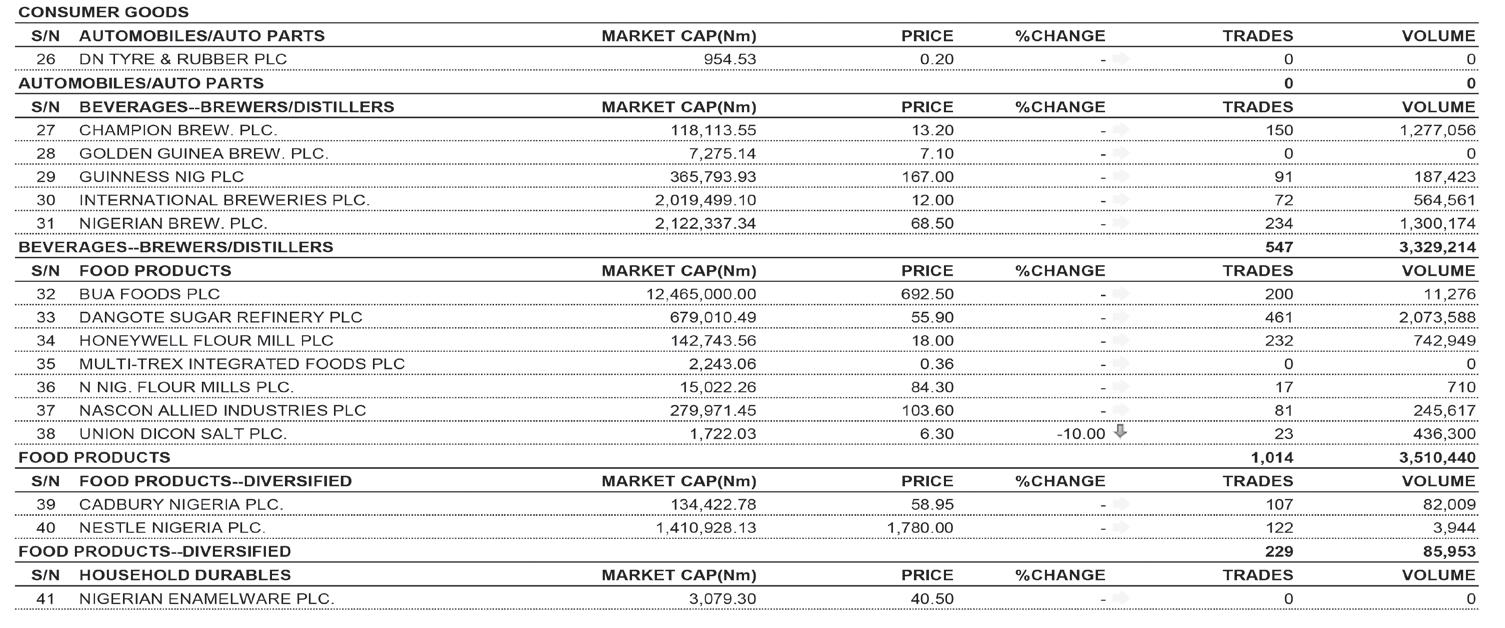
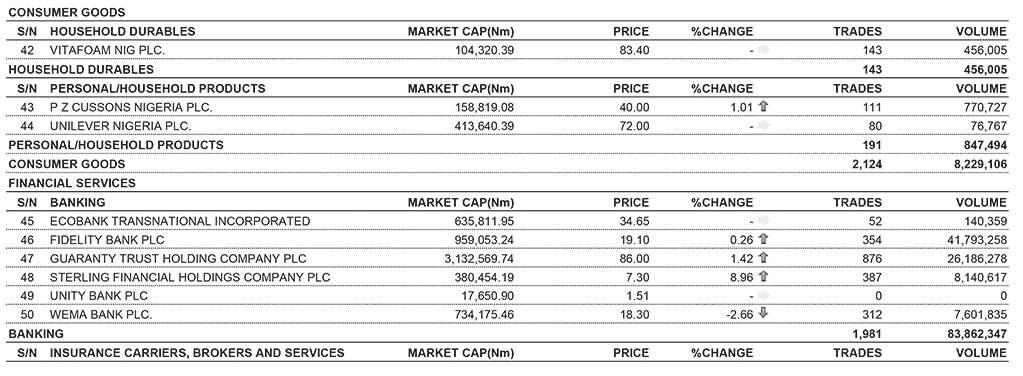
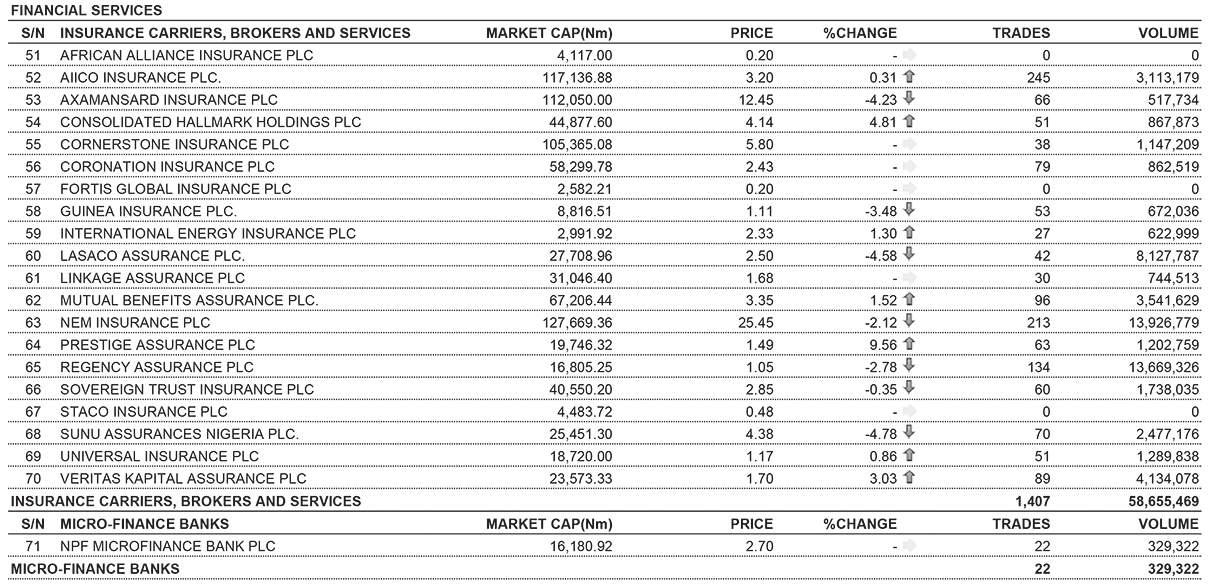
positioned as central to Champion Breweries’ domestic and international growth ambitions.
The initiative forms part of a broader capital-raising plan that will be followed by a public offer in the coming months.
The Rights Circular, containing full details of the offer, is being distributed by Africa Prudential Plc, the Registrars to the issue, and is
also available for download on the company’s website. Shareholders may subscribe electronically via the NGX Invest platform or complete physical participation forms available through the issuing houses and designated receiving agents listed in the circular.
Champion Breweries noted that the rights issue will become tradable on the NGX after completion of all
regulatory documentation.
The company urged shareholders to take advantage of the offer and seek guidance from their stockbrokers or financial advisers where necessary.
Company Secretary, Champion Breweries, Tosan Aiboni, reaffirmed the company’s commitment to transparent engagement with investors as it pursues the next phase of its growth trajectory.


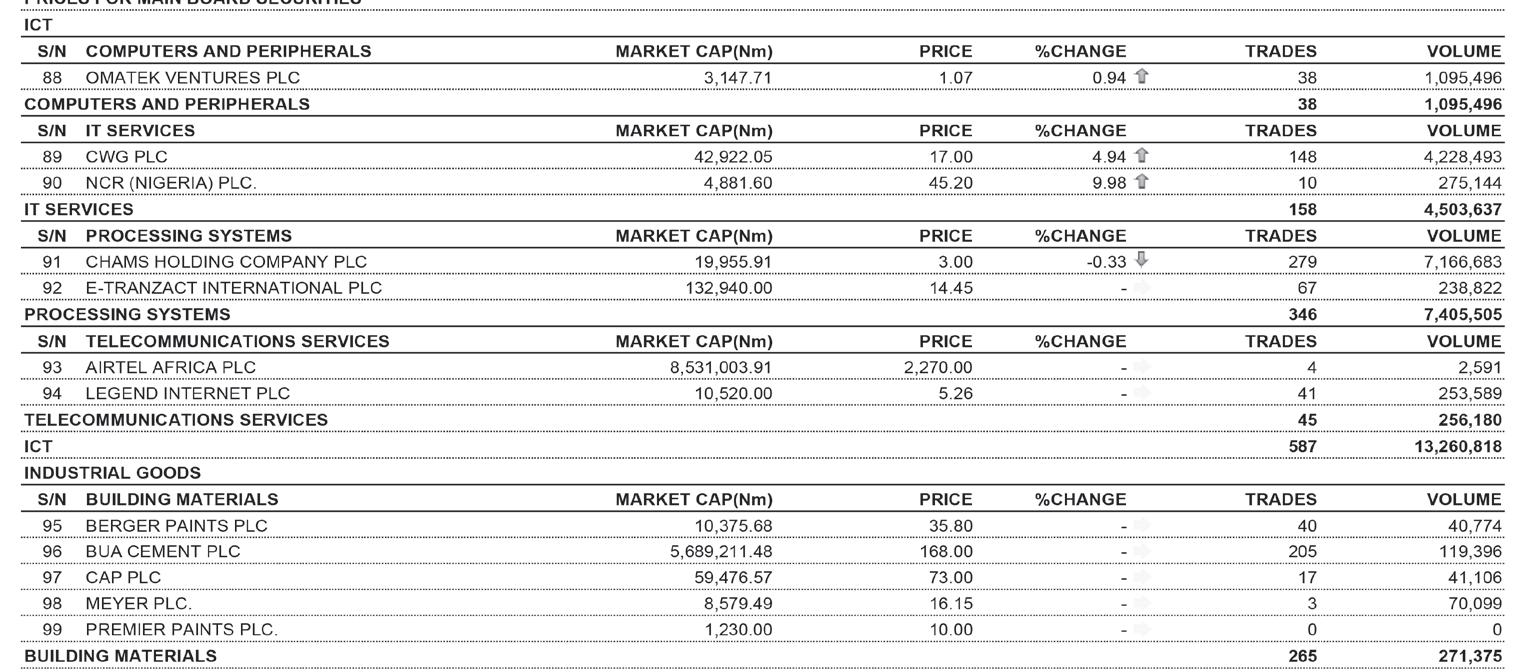

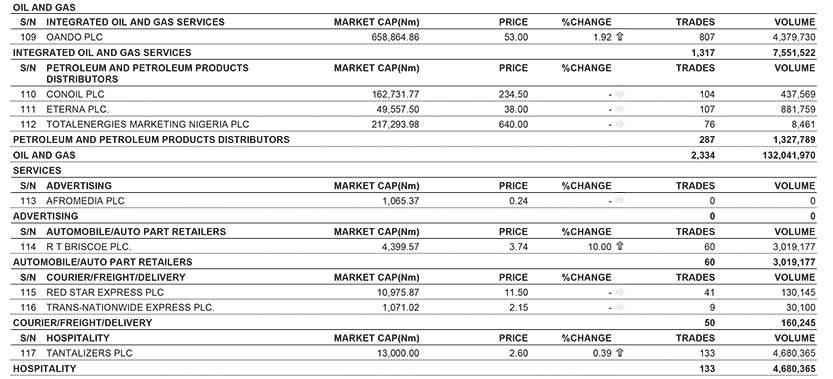

PRESIDENT BOLA AHMED TINUBU
Commander-in-Chief of the Armed Forces Federal Republic of Nigeria Abuja
End the 11-Year Nightmare of School AbductionsAct Now to Rescue Kebbi G irls and Secure Our Schools
Dear Mr President,
Monday, November 24, 2025
#BringBackOurGirls OPEN LETTER TO PRESIDENT BOL A AHMED TINUBU
Bring Back Our Girls Global (BBOG Global), a coalition of advocates from across the world, writes with urgency and outrage following the horrific attack on our children and our institutions of learning. On Friday, November 21, 2025, were abducted from St Mary’s Catholic Primary 303 students and 12 teachers and Secondary Schools, Papiri, Agwarra LGA, Niger State. This attack, one of the largest mass kidnappings in our history, underscores a terrifying trend of lawlessness and vulnerability in our schools. While we acknowledge that fifty students have escaped, the fact remains that hundreds are still in captivity, and families are living in anguish.
This followed the abduction of from Government Girls Comprehensive Secondary School (GGCSS), Maga, Danko/Wasagu 25 schoolgirls and one watchman LGA, Kebbi State. The attack, carried out in the early hours of Monday, November 17, 2025, also led to the tragic killing of the school’s Vice Principal, Mallam Hassan Makuku (50 years), who was shot while attempting to protect his students from the armed assailants. While one student and the watchman escaped, the remaining girls are still in captivity. Additionally was shot in the leg and is receiving treatment at General Hospital, Zuru. Ali Maga (45 years)
This has led to the closure of schools in several states, including Niger, Katsina and Plateau, while all Federal Government Colleges have been closed. Thousands of children will lose their right to education, especially in Nigeria’s most educationally challenged region.
These atrocities are not isolated tragedies - they are part of a systemic failure spanning over 11 years. Since the Chibok abduction of 276 girls in April 2014, Nigeria has witnessed in a relentless cycle of terror. The pattern is clear: at least 1,800 students kidnapped
1. Chibok (2014): 276 abducted, 90 still held.
2. Dapchi (2018): 110 abducted, 104 returned, 1 killed.
3 Kankara (2020): 344 abducted.
4 Jangebe (2021): 317 abducted.
5 Bethel Baptist (2021): 153 abducted, 125 still held.
6 Kuriga (2024): 287 abducted.
7 Maga (2025): 25 abducted.
8 St Mary’s Catholic School (2025): 315 abducted, 253 still hold.
These numbers signify the horror these young girls have endured while the government carries on as if nothing has happened. These numbers are not statistics - they represent children robbed of their futures, families shattered, and communities living in perpetual fear
Many Chibok girls remain in captivity, forced into marriages with their abductors, subjected to sexual violence, and denied basic human dignity. Survivors who returned face stigma and trauma without adequate rehabilitation. Chibok and other targeted communities remain scarred and vulnerable. There have been over on Chibok since 2014, and many of these targeted communities remain under constant and ongoing attacks. This is one hundred attacks unacceptable
President Tinubu, schools must never be battlegrounds. Education is a right, Yet, despite billions allocated and initiatives launched - not a death sentence. Safe Schools Initiative (2014), Safe Schools Declaration (2015) - implementation has failed. Today and only have early 80% of schools remain unsafe, 37% warning systems. Negotiating with criminals only emboldens, and our children continue to pay the price
We demand urgent, decisive action—not just reactive measures, but a comprehensive strategy to secure our schools, dismantle these criminal networks, and restore faith in the government ’s ability to protect its citizens. Every day of delay deepens the wound and erodes the trust of Nigerians in their leadership
We acknowledge the deployment of the RightNow Female Squad of the NSCDC and other tactical units, as well as joint operations with security agencies and vigilante groups. However We demand immediate and decisive action: words and partial measures are not enough.
Rescue the abducted Kebbi school girls, St Mary’s Catholic Church School students and teachers, and all others still in captivity - NOW
STOP negotiating with terrorists! They are criminals. What other evidence do you need?
Fully implement the Safe Schools Declaration with measurable timelines and transparency
Prosecute those responsible for past failures and strengthen the security architecture nationwide
Provide sustained psychosocial support and reintegration programs for survivors and affected communities
S ignatories:
Opeyemi Adamolekun, EiE Nigeria, Lagos
Tehilah Eisenstadt, BBOG NY
Dr Allen Manasseh, BBOG Abuja
Rose Wingate, BBOG New Zealand
Nanre Nafziger, BBOG Global
Monday Ojon, Cemepia Africa, BBOG Lagos
Habiba Balogun, BBOG Lagos
Gapani Yanga, BBOG ABUJA
Yolanda Preciados, BBOG Italy
Ayo Obe, BBOG Lagos
Ayodeji Kolawole, BBOG Lagos
Babasola Olalere, BBOG Lagos
Setting New Standards of Urban Sustainability with Project Breathe Clean Air Abuja
Project Breathe Clean Air Abuja unfolded as more than an environmental campaign; it became a powerful statement of renewed hope for families across the Federal Capital Territory Administration. Championed by the Mandate Secretary for Health Services and Environment Secretariat, Dr. Dolapo Fasawe, under the leadership of the FCT Minister, Nyesom Wike, and powered by the support of IHS Nigeria Limited, the initiative saw the distribution of 5,000 gas cylinders with free cooking-gas refills for six months, removing the financial obstacle that has long kept households dependent on firewood and charcoal. Chiemelie Ezeobi writes that the initiative underscored a shared commitment to tackling household air pollution and promoting safer, cleaner cooking alternatives and in addition, demonstrated how collective action can transform lives, protect the environment, and restore the fundamental right to breathe clean air
Excellence! That was the word for the recently held “Project Breathe Clean Air Abuja” organised by Dr. Dolapo Fasawe, the Mandate Secretary, Federal Capital Territory Administration (FCTA) Health Services and Environment Secretariat, in partnership with IHS Nigeria and Smart Energies.
Held at the Bola Ahmed Tinubu International Conference Centre, Abuja, the event brought together environmental and health experts, students, development partners, policy makers, and key stakeholders to launch the landmark initiative of promoting the adoption of clean cooking gas (LPG) as a safer and healthier alternative to firewood and charcoal.
Renewing Hope, One Household at a Time
But how was this initiative birthed? For Dr. Dolapo Fasawe, Mandate Secretary, FCTA Health Services and Environment Secretariat, her foray into environmental advocacy was shaped by the light shone by Ella Adoo-KissiDebrah’s legacy.
A firm believer in the fact that “the air we breathe should not be a killer”, she recalled that in 2013, nine-year-old Ella Adoo-Kissi-Debrah died in London and her mother began a long court process for justice which she achieved after a landmark legal ruling listed that the cause of death as air pollution — the first time globally that pollution had been legally recognised as a cause of death.
The young girl lived near the heavily polluted South Circular Road in Lewisham, London, and this led to severe asthma, exacerbated by exposure to excessive air pollution. The 2020 inquest ruling forced the UK government and local authorities to take more aggressive action against harmful emissions.
Noting that her tragic passing remains a global warning that clean air is a fundamental human right, Dr. Fasawe has been bent on renewing hope one household at a time for Nigerians, especially in the FCTA through “Project Breathe Clean Air Abuja”.
The aim of the initiative is to reduce health risks associated with household air pollution, protect the environment, and contribute to sustainable living in the nation’s capital by distributing 5,000 gas cylinders across the six area councils of the FCTA, encouraging families to switch from firewood and charcoal to clean cooking gas. The bonus? A free refill for six months across the six area councils.
According to Dr. Fasawe, “Our commitment to a sustainable future is backed by action, we are doubling down on our pledge to reduce our carbon footprint through impactful initiatives like Project Breathe: Clean Air Abuja.This program is not just about carbon offsets; it’s about addressing a critical health crisis.
“We say a big thank you to Barr. Nyesom Wike for making this dream a reality. To HSES, our partners IHS (Towers of Strength),

L-R: Senior Vice-President & Chief Corporate Services Officer, IHS Nigeria, Dapo Otunla; FCTA Mandate Secretary, Health Services and Environment Secretariat, Dr. Dolapo Fasawe; Chairman Adhoc Committee on Health House of Representatives, Hon. Inyang Emil Lemke; CEO, Smart Gas, Dr. Yinka Opeke; Executive Vice- President & CEO IHS Nigeria, Mohammed Darwish; Executive Vice-President & Chief Human Resource Officer, IHS Nigeria, Tade Oyinlola; FCTA Mandate Secretary Women Affairs, Mrs. Adedayo Benjamins-Laniyi; and Permanent Secretary, Health Services and Environment Secretariat, Dr Babagana Adam, during the official launch of the project "Breathe Clean Air Abuja"…recently
we deeply appreciate your unwavering support. A heartfelt thank you to Smart Energies. We promised and we delivered. We have been provided with 5,000 units of gas, which will be distributed across the geopolitical zones of Abuja over the next six months.”
Promoting a Healthy Community
In his speech, the guest of honour, Hon. Emil Lemieux Inyang said the new beginning of Project Breathe Clean Air Abuja marked a fresh birth of hope for healthier communities, adding that the initiative is set to reshape lives, inspire change, and create a future where clean, safe air is a reality for every home. “A new chapter has begun, and its impact will be felt far beyond today”.
Also speaking, Dr. Babagana Adam, Permanent Secretary, Health Services and Environment Secretariat, said the goal is to promote a healthy community, noting that
“the gain is to save our environment, and by saving our environment, we’re also saving the pregnant women, along with the family. So if they live healthy, they’ll be more productive, and the GDP of FCT will increase. So a healthy community is a wealthy community, so that’s the benefit.
“If you see our lists that are invited, it cuts across gender, disability, and all the tiers of the sector. You can even see there are more press, and everybody is represented here. So this is to ensure that everybody gets what
is being promised of the gas. And that is why we even made it sustainable, that people will get vouchers to refill the gas thereafter.”
Corporate Commitment to a Cleaner Future
Mohammed Darwish, CEO, IHS Nigeria Limited, simplified the essence of the programme when he said it was all “about helping 5,000 mothers, sisters, and daughters by not inhaling toxic gases anymore, and by really making sure that their health is better by breathing fresh air.
“The key component of the program is first of all to deliver, to give the cylinder filled. And then we will also provide refills. So hopefully they also will be able to sustain the use of gas going forward.
0“We are not just giving out smart cookers; we are restoring the dignity and health of the Nigerian home.”
Also speaking, Dakpo Otunla, Chief Corporate Services Officer, IHS Nigeria Limited, added that it was a fantastic opportunity to collaborate on a phenomenal sustainability initiative, adding that it would benefit the health and welfare of Nigerian citizens, and fortunately for those within the FCT at this time.
Yinka Opeke, CEO of Smart Energies, provided a human lens to the challenge when she opined that energy poverty is not about knowledge but about the mother who knows cleaner fuel exists, wants to protect her daughters’ lungs,
but cannot afford the upfront cost of a cylinder, thus resorts to collecting firewood, inhaling the smoke, and remaining trapped in that cycle, adding that it was why the “champions of a clean Abuja,” were chosen.
Poetry, Orchestra and Goose- bump Moments
While the high point of the event was the distribution of cylinders across the six area councils, the emotional peaks however, belonged to the art. From Isabella Ibrahim, who delivered a stirring spoken word performance, her lines capturing the silent sacrifice of Nigerian mothers and the promise of smoke-free kitchens, to the drama by veteran Nollywood actors led by Prince Jide Kosoko.
The trumpet group delivered goosebump moments, while an orchestra of musicians belted out old blues under the guidance of a conductor, elevating the event into an experience rather than merely an official launch.
The Path Forward
Essentially, Project Breathe Clean Air Abuja is more than a distribution exercise but also a moral, environmental, and economic intervention. It’s a tribute to Ella, a relief to thousands of mothers, a commitment by government and corporate partners, and a model for urban sustainability.
And above all, for Dr. Fasawe, it is a renewed promise, that the air Nigerians breathe will not be a killer, but a path to dignity, health, and hope, one home at a time.

AREWA CONSULTATIVE FORUM
No.11A SOKOTO ROAD, KADUNA. Email:arewaconsultativeforum@gmail.com
OPEN LETTER OF APPRECIATION:
The Arewa Consultative Forum (ACF) wishes
to express its profound gratitude and deepest appreciation to our esteemed guests and all who participated in the ceremony marking our 25th anniversary held on the 20th, 21st and 22nd November, 2025. The large
t u r n o u t o f v e r y s e n i o r a n d d i s t i n g u i s h e d personalities from across the country was not only a demonstration of solidarity but also a p o w e r f u l a ffi r m a t i o n
f o u r c o l l
v e c o m m i t m e n t t o t h e u n i t y, p r o g r e s s , a n d development of Northern Nigeria and the nation as a whole.
Your presence truly honoured us and made the event a resounding success.
ACF is deeply humbled by the special recognition given to it by Mr President, Bola Ahmed Tinubu, GCFR. Commander in Chief, Federal Republic of Nigeria. When, due to strong exigencies of duty, he couldn t come personally, he asked Senator ' Kashim Shettima, GCON, the Vice President, to come and represent him. As it turned out, the VP h i m s e l f h a d t
a
H o n o r a b l e A b b a s Ta j j u d d e n , P h D , G C O N , Speaker of the House of Representatives, to stand in for the President.
We are truly honored and grateful to these exceptional leaders for their direction, goodwill and encouragement. We thank in particular C h a i r m a n o f t h e o cc a s i o n , G e n e ra l Ya k u b u Gowon, PhD, GCFR, ably represented by His Excellency, Architect Namadi Sambo, GCON, Sardaunan Zazzau, former Vice President of the Federal Republic of Nigeria. The Dinner and Awards Night, was chaired by His Excellency, Atiku Abubakar, GCON, Wazirin Adamawa, former Vice President of Nigeria. We are most grateful and thank him for his stewardship and for his t h o u g h t fu l w o r d s o f w i s d o m a n d g u i d a n c e delivered during the ceremony.
The trip to Kaduna by the illustrious patriot, Lt General Theophilus Yakubu Danjuma, former C h i e f o f A r my S t a ff , D e fe n s e M i n i s t e r a n d longstanding champion of Nigerian unity, was only called off at the very last moment due to c i r c u m s t a n c e s t h a t c o u l d n o t b e h e l p e d Nevertheless, General T Y Danjuma dispatched a strong delegation led by Major General Tanko Nuhu Abdu (Rtd) to represent him. And they came with a hefty cheque of One Billion Naira from him - in support of the ACF Endowment Fund. It is hard to see a better illustration of the saying: actions speak louder than words!
We are also immensely grateful for the honour done to us by the presence of many distinguished leaders of our national institutions: Distinguished Deputy President of the Senate, Senator Barau
J i b r i n , C F R , t h e i r e x c e l l e n c i e s , t h e S t a t e
Governors, past and present, in particular, Alhaji
Umar Namadi, Governor of Jigawa state who came in person. Deputy Governor, Dr Hadiza Sabuwa Balarabe, stood in for our chief host, Senator Uba Sani, CON, Governor of Kaduna state. Dr Manassah Daniel Jatau, PhD, Deputy
Northern Governors 'Forum. Deputy Governors
Engineer Kabir Yusuf, and Alhaji Dauda Lawal Dare respectively Governor Mai Mala Buni was represented by the Hon. Commissioner for Trade, Commerce and Tourism, Alh Kaigama Umar
institutions to the ceremony. Alhaji Atiku Bagudu, Minister of Budget and Economic Planning and Hon. Zaphania Jissalo, Minister of Special Duties were present while Hajia Hannatu Musawa, M
t i v e Economy, who remained active through the program, chaired the first events including the cultura
colloquium on “T for Security” A large ourism n
o f k e y a g e n c i e s o f government, past and present, too numerous to mention, including representatives of current ministers were also in attendance.
His Eminence, the Sultan of Sokoto, Alhaji Muhammadu Sa'ad Abubakar, CFR, mni. not only came in person but invited and encouraged a number of our royal fathers who ed in attend person or were duly represented. We can hardly find words adequate enough to express our gratitude and appreciation for all the support and guidance we received and continue to get from His Eminence, the Sultan and the royal fathers.
We were overjoyed to receive and host His Imperial Majesty, the Ooni of Ife, Oba Adeyeye Enitan Ogunwusi Ojaja, CFR. Given all that he has been doing now and in the past, we had earlier, at the event, bestowed on his Imperial Majesty; the Nigerian Bridge-Builder Award.
A defining moment of the Silver Jubilee was the launch of the We are ACF Endowment Fund thrilled to report that the Fund received an o v e r w h e l m i n g r e s p o n s e , w i t h p l e d g e s a n d donations totaling about Nine Billion Naira at the first seating. This extraordinary generosity is a testament to the faith you have in our mission and will significantly bolster our capacity to execute impactful programs for the benefit of the people of the North.
Sincere thanks go to our lead donors, whose monumental contributions propelled the Fund to such a remarkable height. Alhaji Abdussamad Rabiu, CFR, the Chief Launcher, was actively encouraged and vigorously supported by the
24th November, 2025
illustrious industrialist, Alhaji Aliko Dangote, G C O N N e i t h
y introduction, suffice it to say that, as the two biggest industrialists and employers of labor, e n d i n g p o v e r t y a n d
Nigeria, is, for them, a lifelong ambition. Their exemplary philanthropy and deep commitment to t
inspiration to us all. We are profoundly grateful for their generosity and of their belief in our cause.
Special thanks go to Alhaji Dahiru Mangal, Alhaji A
Magatakarda Wamakko, Abdulaziz Yari and their friends in the Senate, Distinguished Senators B a
Assembly in the red and green chambers. All the large hearted donors, including His Excellency Rotimi Amaechi, Prince Adewole Adebayo, ACF members, especially those who not only worked as leaders of the Finance Committee but who taxed themselves so heavily and raised the funds for staging the event. We are truly indebted Dr Kashim Ibrahim - Imam, Senator Mohammed Sani Musa, Alhaji Nasir Danu, Hon Abdussamad Dasuki, Joe Kyari Gadzama SAN, Alhaji Lamis Shehu Dikko, Mal Suleiman Barau amongst others. We also appreciate those that contributed to the planning of the event; the Kaduna State Government, Katsina State Government, H.E. Atiku Abubakar, H.E. Arc Namadi sambo, Sen Barau I. Jibrin, Prince Adewole Adebayo amongst others.
To all the other volunteers who worked tirelessly in various capacities and ensured the success of the event, especially the Security Agencies and the Press, we say thank you very much.
The attendance and contributions of everyone, especially the Afenifere and distinguished guests and organizations from across Nigeria added i m m e n s
reinforced the spirit of unity and collaboration across the different parts of our country, society and government.
The ACF pledges to be a prudent and transparent custodian of the resources entrusted to it through the Endowment Fund. Donations into the Fund will remain open and continuous.
We rededicate ourselves to the ideals of service, advocacy, and development for which we were established twenty-five years ago.
With warmest regards and deepest appreciation.
Respectfully Yours,
Photo

L-R: Parishioner, All Saint’s Anglican Church, Festac Town, Lagos, Johua Akhigbe; Parishioner, St Augustine’s Anglican Church,

L-R: Ekiti State Governor, Mr. Biodun Abayomi Oyebanji, presenting a cheque to one of the beneficiaries of the Wole Olanipekun Foundation Empowerment Programme, Miss Iyanuoluwa Olorunyomi; flanked by the Deputy Governor of the state, Chief Monisade Afuye; the Chairman of the Wole Olanipekun Foundation, Prince Feyi Ogoji (FCA); and the Secretary of the Foundation, Pastor Tope Orolu, at the 29th Edition of the scholarship scheme and empowerment programme held in Ikere, Ekiti State… recently
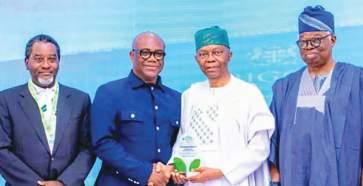
L-R: Vice President, LCCI/Trade Promotion Board, Mr. Abimbola Olasore; Managing Director, DCS Integrated Media, Mr. Tunde Obokhai; President, LCCI, Dr. Gabriel Idahosa; Deputy President, LCCI, Leye Kupoluyi, during an award presentation at the recent LCCI Trade Fair closing event held in Lagos… recently

L-R: Creative Designer, Folajimi Tubi; Marketing Director, Roseline Abaraonye; Growth Brand Manager, Esther Ahamba; and Head of Digital Marketing, Naomi Concordia Atafiri-Biyang, all of Imperio International, just after the grand launch of the company’s premium Prive Perfume Collection in Nigeria, held in Lagos… recently

L-R: Vice Principal Academic, King’s College, Lagos, Oby Ogbuoto; Head of Wealth Management, Lagos, FBNQuest Merchant Bank, Mojisola Olorunfemi; Head of IT Support, FBNQuest Merchant Bank, Olasunbo Babafemi; and Head Teacher, Commercial Class, King’s College, Lagos, Ekpo Paul, at the 2025 World Saving’s Day Initiative in Lagos… recently


AT THE BLOOMBERG AFRICA BUSINESS SUMMIT...
Senate Pushes for N1trn Health Funding
2025 CRF shows Nigeria spending far below global commitments
Sunday Aborisade in Abuja
The Senate has initiated a major push to overhaul Nigeria’s health financing architecture by proposing an amendment to the National Health Act that will increase statutory funding for the sector from the current one per cent to two per cent of the Consolidated Revenue Fund (CRF).
If passed, the adjustment will raise annual health funding from N549.9 billion to about N1.0998 trillion, based on the N54.99 trillion CRF approved for the 2025 fiscal year.
The move formed the highlight of a public hearing organised by the Senate Committee on Health (Secondary and Tertiary) yesterday in Abuja.
Lawmakers, health experts and government officials on the occasion deliberated on five bills aimed at strengthening the country’s health system.
The focus on the National Health Act (Amendment) Bill, sponsored by Senator Ipalibo Banigo (Rivers West), overshadowed others as senators lamented Nigeria’s chronically low investment in
health despite rising disease burdens.
Senate President Godswill Akpabio, represented by the Senate Chief Whip, Mohammed Monguno, said Nigeria’s current health funding levels fall far short of continental and global standards.
He noted the proposed amendment was central to reversing years of
Minister Refutes Purported Ban on Open Grazing
Vows to deliver tangible results in livestock sector through partnerships
The Minister of Livestock Development, Idi Mukhtar Maiha, yesterday debunked reports claiming that open grazing had been banned nationwide.
The minister said no such policy had been announced, adding that the government is instead implementing a gradual, well-structured transition from open grazing to modern ranching systems.
In a statement issued by the ministry’s Head, Press and Public Relations, Oghenekevwe Uchechukwu, Maiha explained that Nigeria currently has 273
gazetted grazing reserves covering over 4.5 million hectares.
He said the federal government is working closely with state governments to revitalise, equip, and make these reserves conducive for pastoralists and other livestock operators.
Maiha noted that the transition plan does not abolish open grazing overnight but provides viable alternatives that support productivity, reduce conflicts, and promote a sustainable livestock ecosystem.
He said, “Pastoralists, like every other economic group, require a structured business
environment. The grazing reserves provided by law are meant to serve as business premises for all livestock activities. Our responsibility is to upgrade these reserves and facilitate their proper utilisation.”
The ministry however, urged the public to disregard misleading media reports and rely on official government communication channels for accurate information on livestock development policies.
Separately, Maiha reassured Nigerians that the ministry’s ongoing partnerships and investments are practical, resultsdriven efforts already taking
shape, and will soon translate into meaningful, visible gains for citizens across the country.
Speaking at the maiden National Council on Livestock Development in Yola, Adamawa, he highlighted the ministry’s progress over the past year.
He disclosed that several bilateral and private-sector engagements have matured into strong expressions of interest, with companies preparing targeted investments in key value chains including dairy, beef, fodder, small ruminants, animal breeding, poultry, piggery, and animal identification.
FG Approves Abia’s Renovation, Upgrade of Ojukwu Bunker, National War Museum
The federal government has given Abia State the nod to renovate and upgrade Ojukwu Bunker and War Museum to international tourist sites.
The approval followed agreements signed between the National Commissions for Museums and Monuments and Abia State Government
to modernize the two federal government facilities located in Umuahia, where important relics of the Nigeria-Biafra war are housed.
Commissioner for Information, Prince Okey Kanu, announced this Monday evening while briefing journalists at Government House, Umuahia, on the outcome of the weekly State Executive
Council (EXCO) meeting presided by Governor Alex Otti.
“We are also pleased to announce key milestones that continue to transform the state's cultural, historical and creative landscape in line with the government's vision for the arts, culture, and creative economy of the state.
“In this way, Council has
approved the comprehensive retrofitting of Ojukwu Bunker and National War Museum, two major historical monuments in the state and country.
“This follows the finalization of agreements between the National Commission for Museums and Monuments and the State Ministry of Arts, Culture, and Creative Economy.
underinvestment that have weakened primary healthcare, slowed disease prevention efforts, undermined workforce development and left emergency response systems fragile.
Akpabio said, “The current funding levels for the health sector remain far below the commitments we have made at continental and global levels.
“This National Health Act (Amendment) Bill aims to strengthen the financial framework that supports primary healthcare, disease prevention, health workforce development and emergency response.
“Increased funding is not an expense; it is an investment in national security, economic growth, and human capital.” He stressed the bills before the committee were not abstract legislative exercises but responses to urgent health challenges affecting millions of Nigerians every day. One of the bills, the Sickle Cell Disorder Research and Therapy Centres (Establishment) Bill, sponsored by Senator Sunday Katung (Kaduna South), seeks to establish seven specialised centres across the six geopolitical zones and the Federal Capital Territory.
LAJA Hails Arthur Eze's Contributions to Education, Healthcare, Infrastructure
Onyebuchi Ezigbo in Abuja
The League of Anambra Journalists in Abuja (LAJA) has praised the long-standing interventions businessman Prince Arthur Eze in the country's education, healthcare, infrastructure, and youth empowerment While felicitating the renowned philanthropist and industrialist, on the occasion of his birthday, LAJA prayed for God’s continued guidance, good health, and strength for the celebrant, urging him to remain steadfast in his commitment to empowering future generations.
LAJA commended the philanthropist for his continuing role in promoting peace, unity, and development in Anambra State, noting that his contributions have remained instrumental in strengthening social and economic growth.
In a statement jointly signed by the Interim President Ambassador Ikenna Okonkwo and Interim Secretary, Princess-Ekwi Ajide, LAJA described Prince Eze as “one of Anambra’s most outstanding businessman and philanthropist whose unmatched generosity, public-spirited contributions, and unwavering commitment to community upliftment continue to shape lives across Nigeria and beyond.”
The group noted that Prince Eze’s long-standing interventions in education, healthcare, infrastructure, and youth empowerment have remained a lifeline for many, adding that his impact is both enduring and far-reaching.
“Prince Arthur Eze represents a rare blend of wealth, humility, and purposeful giving.

AT THE DIGITAL GROWTH SUMMIT 2025...
TETFund Seeks Stronger Support to Drive Innovation, Boost Local Production, Create Jobs
Funmi Ogundare
The Executive Secretary of the Tertiary Education Trust Fund (TETFund), Sunday Sylva Echono, yesterday, called for stronger national support to enable the Fund fully deliver on its mandate of driving innovation, strengthening local capacity, and reducing Nigeria’s dependence on imported goods.
Echono who made the call at its 2025 Board of Trustees Town Hall Meeting, in Lagos, spoke
on the transformative potential of TETFund’s interventions.
He stated that increased investment in research and development would translate into new ideas, new products, new services, and ultimately, more jobs for Nigerians across key sectors.
He stressed the Fund’s commitment to technological development especially in agriculture, for instance, would help replace crude, manual farming practices with modern,
locally developed equipment and tools.
According to him, with improved access to technology, farmers would be able to identify high yield crop varieties, efficiently apply fertilizers, adopt better irrigation systems, and mechanize their operations.
This, he said, would raise productivity, increase income, and attract more people into agriculture by removing the torture associated with
traditional methods.
Beyond agriculture, the executive secretary emphasised the urgent need to curb illegal mining and channel the country’s mineral wealth into structured extractive industries driven by Nigerian expertise.
He said empowering local professionals through quality tertiary education would ensure the country stops importing everything and begins refining its own resources.
Echono maintained
Keyamo: We May Go After Dana Air Assets to Refund Passengers, Travel Agents
Receives ACI-Africa secretary general as Nigeria prepares to host regional conference Directs NCAA to probe why trapped funds are yet to be refunded As NAMA grants approval to four new airports to operate till 10pm
The Minister of Aviation and Aerospace Development, Festus Keyamo Tuesday disclosed the federal government may go after the assets of Dana Air to refund trapped funds of passengers and airline travel agents.
Meanwhile, Keyamo on Monday received in audience the Secretary General of the Airports Council International (ACI) Africa, Mr. Alli Tounsi, just as Nigeria is billed to host the prestigious ACI Africa's Acrobatics Regional Conference and Exhibition next September, 2026. The threat to go after the assets of Dana Air trails the ministers position he would direct the Nigeria Civil Aviation Authority (NCAA) to probe why funds trapped by the airline are yet to be refunded.
Keyamo, speaking on why the Authority suspended the operations of the airline, he revealed the suspension was
a choice between safety and disaster.
The minister disclosed this in Abuja at the ministry's fourth quarter stakeholders' engagement to enhance governance for effective service delivery in aviation themed: "leveraging public feedback to drive excellence in aviation services".
On actions to be taken to recover the trapped funds, Keyamo noted: "For Dana, the problem is that it was a choice between safety and disaster. So, we didn't take the commercial thing as priority. The priority was safety and we all looked at the damning reports that we met on the table.
"It was a decision of the NCAA to suspend them but I pushed them to say, look, this is the reports we are seeing on the table about safety record, about lack of standards that puts the lives of Nigerians at risk.
"If they continue flying, I don't know whether most
of us will be here. Many of us would have been victims of one of those flights. God forbid."
According to him, "I have asked Najomo to dig deep to find out how those passengers and agents will be refunded. He has to dig deep on that.
"One solution will also be that if that same individual or those entities are trying to come back to aviation under any guise, whether to go and register a new AOC or use any business within aviation sector, they have to go and settle their debts first.
"We should look at their assets. There are assets that are still available. Let them sell their assets. Let's cannibalize their revenue and pay people. Let's find a way to go after their assets and get money to pay Nigerians who are owed.
"NCAA should do that because they can't get away with it."
Speaking further, Keyamo hinted that President Bola Ahmed Tinubu has approved special funds for the provision of NAMA equipment.
This he said means that the provision of NAMA equipment is being moved from budgetary provisions into special funds
Highlighting some of their progress, the Director General, Nigeria Air Management Agency (NAMA), Engr. Ahmed Farouk, said they have provided a fully functional flight calibration unit, which is used to calibrate navigational aids and validate instrument approach procedure
Represented by the Director Air Traffic Service, Mr. John Tayo, he added they have also signed an agreement with Sierra Leone and Liberia to provide them with calibration and instrument approach procedure validation in accordance with ICAO standards.
that sustainable national development rests on the capacity of its people, noting that only deliberate investment in education can produce the skilled manpower required to harness Nigeria’s natural endowments.
“We are in tune with the President Tinubu's desire,” he said. “We are working very hard to transform our beneficiary institutions, and in the years ahead, across all sectors, we are going to see more and more of those benefits.”
He thanked stakeholders for their continued partnership and expressed optimism that Nigeria would soon witness significant progress driven by homegrown talent and innovation.
Earlier in his remarks, the Chairman of the Board
of Trustees of the Tertiary Education Trust Fund (TETFund), Rt. Hon. Aminu Bello Masari, explained that the Fund is driving a systemic shift from infrastructure heavy spending to a balanced model that prioritises human capital development, research commercialisation, entrepreneurship, and digital governance in line with President Bola Tinubu’s Renewed Hope Agenda.
Addressing persistent power challenges, Masari announced the allocation of ₦70 billion in TETFund’s 2025 budget for the deployment of mini grid energy solutions across selected campuses. The initiative, he explained, will reduce operational costs, improve research output, and create more conducive learning environments.
Onuminya Innocent in Sokoto
The Sokoto State Government, in partnership with the United Nations Children’s Fund (UNICEF), have unveiled a major expansion of the state’s Social Register, aiming to enrol 250,000 households across the seven pilot local government areas.
The initiative, described as a “crucial document providing credible and transparent data for social‑protection programmes,” was announced at a one‑day orientation meeting for local government teams and stakeholders.
State Commissioner for Budget and Economic Planning, Dr. Abubakar Muhammad Zayyana,
told participants that the Social Register will serve as a data‑driven tool for policymakers and partners to make informed decisions, target beneficiaries and assess the impact of interventions.
“Social protection aims to reduce social injustice, exclusion and insecurity while improving human‑capital development,” Dr. Zayyana said, adding that the government’s focus is on results rather than outcomes.
UNICEF’s Chief of the Sokoto Field Office, Dr Michael Juma, represented by Social Policy Specialist, Mr. Isah Ibrahim, explained the new multidimensional approach seeks to integrate the most deprived households into basic services such as education, nutrition, health, birth registration, water and sanitation. Sokoto
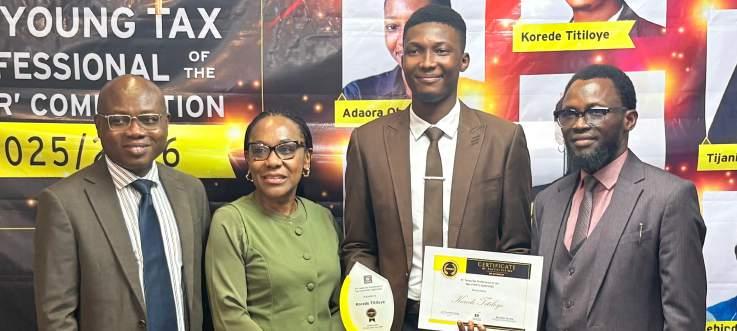
L-R: EY Nigeria Chief Operating Officer, Mr. Oluwabusiayo Layade; EY Africa Talent Team Leader, Mrs. Jane
Titiloye; and Associate Partner/Coordinator of the Award Competition,
winner of the EY
the grand finale of this year’s award ceremony organised by EY Nigeria in Lagos… recently
Shettima Back in Abuja After Attending G20, AU–EU Summits in South Africa, Angola
Deji Elumoye in Abuja
Vice President Kashim Shettima on Tuesday evening returned to the nation's capital, Abuja from Luanda, Angola, after representing President Bola Tinubu at the 7th African Union–European Union (AU-EU) Summit held in
that country.
The Vice President had on Sunday departed South Africa for Luanda after a successful outing at the 2025 Group of 20 (G20) Leaders' Summit in Johannesburg, where he also represented the President.
In Angola, Shettima, according to a release issued
by his Media Assistant, Stanley Nkwocha, delivered Tinubu's statement in which he intensified the nation's call for Africa to secure permanent seats with veto-wielding authority on the United Nations (UN) Security Council, insisting that comprehensive reform of the
global governance system is long overdue.
The President, in his statement, also tasked the European Union (EU) with co-creating peace and security initiatives alongside its African partners, anchored on African-led frameworks as a pathway to achieving
Designers Dazzle at 5th Benue Men Fashion Week as Gov Alia Supports with N20m
The 5th edition of Men Fashion Week Benue (MFWB) has attracted arrays of designers within and outside Benue State, presenting dazzling styles to the admiration of fashion buffs who thronged the Dream Event Center in Makurdi, on Tuesday.
The MFWB which began in 2020, has gradually become a distinct landscape for top and upcoming fashion designers
not only from Benue and the middle belt, but also from Lagos, Abuja, Port Harcourt.
The founder and Creative Director of MFWB, Mshelia Jamal Jamilu, said the event has grown steadily in influence, shaping careers and expanding creative visibility for designers and models in Benue State and beyond.
Jamal, who has become a leading figure in Benue’s creative sector, addressed guests briefly, but said he preferred to “let the runway
do the talking,” and did.
One of the standout stories of the night came from an unexpected source: a young commercial motorcycle rider discovered by the MFWB scouting team.
After receiving grooming and training, he made his debut on the runway with poise, drawing loud applause and symbolising the platform’s commitment to discovering and nurturing new talents.
His transformation captured
the core of Jamal’s mission, which is to expand access to creative opportunities regardless of background.
The atmosphere was further energised by performances from prominent Benue-born musicians including Rapizo, George Milla, Slim Birdie, GYVV and President EMS.
The hall was filled with designers, fashion enthusiasts, industry stakeholders and supporters of the arts, reflecting MFWB’s growing cultural relevance.
National Devt: Tinubu Believes in Tech, Vocational Education Strategy, Says Omisore
Yinka Kolawole in Osogbo
Former deputy governor of Osun State, Senator lyiola Christopher Omisore, has noted that President Bola Ahmed Tinubu characteristic foresight has demonstrated an unshakeable belief in the strategic importance of Technical and Vocational Education and Training (TVET) to the national
progress.
Delivering his lecture at the 2nd Combined Convocation and 10th Anniversary Lecture Federal Polytechnic, Ile-Oluji, Omisore said the Tinubu administration has also renewed investment in education, institutional reform, and industrial skills development that has ushered in a new dawn for
Nigeria's polytechnic system. Omisore, the gubernatorial aspirant on the platform of All Progressive Congress (APC) who delivered the lecture titled: "Reimagining Polytechnic Education for the 21st-Century Economy," contended that President Tinubu's philosophy that "no nation can rise above the quality of its trained workforce" has continues to
inspire both policy direction and institutional realignment across the country.
He stressed that under his leadership, the education sector, particularly the technical and polytechnic sub-sector, has witnessed revitalized funding, improved governance structures, and strengthened linkages between institutions and industry.
sustainable stability across the continent.
Tinubu reaffirmed the country’s firm commitment to advancing peace, security and democratic governance across Africa, and collaborating with the European Union to build a more stable, just, and prosperous world.
Earlier at the first session of the G20 Leaders' Summit in Johannesburg, South Africa, the President urged world leaders to come up with a more equitable and responsive system to manage global financial flows and sincerely address the recurring debt crises in a manner that meets the needs of all nations.
In his speech delivered
by Shettima on Saturday, President Tinubu noted that the multilateral frameworks, currently being relied on, no longer reflect the complexities of the present world, as they were "built in an era far removed from" the present challenges.
At the third session of the G20 Leaders’ Summit on Sunday, the President called for a global framework that benefits communities hosting critical minerals in Nigeria and Africa, ensuring value addition at the source.
He also backed the creation of global ethical standards for Artificial Intelligence (AI), aimed at accelerating development across the world.
ActionAid Laments Use of Social Media to Silence Women, Girls in Nigeria
Michael Olugbode in Abuja
ActionAid Nigeria (AAN) has decried that social media and digital platforms intended to empower, are increasingly being exploited to harass, stalk, and silence women and girls in Nigeria.
AAN in a statement on Tuesday to commemorate the start of the 16 Days of Activism Against GenderBased Violence with the theme, "UNiTE to End Digital Violence Against All Women and Girls." signed by its Country Director, Dr. Andrew Mamedu, lamented that digital threat compounds the physical dangers girls face in schools amid rising insecurity, creating a dual crisis that
demands immediate and collective action.
Mamedu said: "ActionAid Nigeria has long championed safe spaces for women and girls through initiatives such as our Safe Cities project, Women’s Voice and Leadership Nigeria project, the Renewed Women’s Voice and Leadership project, Local Rights Programme and community-based GBV response programs across 21 states and the FCT.
"In a nation where one in four girls experience sexual violence before the age of 18, the combination of physical and online threats is a crisis that deprives our girls of safety, education, and their future.

WHEN ABIODUN VISITED OLUBADAN...
L-R: Olubadan of Ibadanland, Oba Rasheed Ladoja, and Ogun State Governor, Prince Dapo Abiodun, during the governor’s visit to the monarch in Ibadan… recently
ALL 24 KEBBI SCHOOLGIRLS FREED, TINUBU ELATED, SAYS HE’S RELIEVED
have been counter-productive because terrorists often used abductees as “human shields”, which could result in “collateral damage”.
“Attacking their base could be risky because you can kill the civilians,” he added.
The presidential media aide also said the military would decide “the next line of action” on the kidnappers.
The rescued victims were abducted from Christ Apostolic Church (CAC) in Eruku community of Kwara State on November 18, while Director-General of DSS, Adeola Ajayi, briefed Tinubu on November 21 on the security crisis enveloping the country.
Tinubu had on Sunday announced that all the Eruku abductees had been released after receiving security briefings from top military and security brass at State House, Abuja.
Again, Bandits Strike in Kwara, Gov Sets Up Cabinet-level Security Committee
Suspected bandits once again invaded Isapa town in Ekiti Local Government Area of Kwara State, abducting a pregnant woman, two nursing mothers, and nine other residents of the town.
Isapa is a neighbouring community to Eruku town, where three people were killed and 38 worshippers of the Christ Apostolic Church (CAC) were abducted last Tuesday, before they were later released last Sunday.
THISDAY checks revealed that the latest incident happened around 6pm, when between 20 and 30 armed bandits stormed the town with a large herd of cattle.
The incident, it was learnt, happened despite the presence of multiple deployment of army personnel and other security agencies to the local government area to ensure law and order.
It was gathered that the gunmen fired sporadically as they advanced, forcing
residents to flee for safety.
Sources close to the town told journalists in Ilorin that an elderly woman, reportedly, died when struck by stray bullet during the assault.
A community leader, who spoke on condition of anonymity, confirmed the incident, and said 11 persons were taken away, with seven abducted from the same family.
Among those kidnapped, which had been identified, were Talatu Kabiru, Magaji, Kande, Hadiza, Mariam, Saima, Habibat (a housewife), Fatima Yusufu (also a housewife), and a pregnant woman, Sarah Sunday.
Others included a nursing mother, Lami Fidelis, and Hajia Na Allah.
Commissioner of Police, Mr. Adekimi Ojo, who confirmed the incident, when first contacted, said, “Yes, there was an incident, but I cannot say much now. I am about to enter Isapa from Ilorin. I will update you when I get there.”
Later, confirming the incident, in a statement, the police command Public Relations Officer (PPRO), SP Adetoun Ejire-Adeyemi, stated that it “received a distress call around 6:30pm reporting sporadic gunfire within the community.
“Preliminary findings revealed that at about 1805hrs, a group of armed men suspected to be herders invaded the village shooting sporadically. As a result, a woman sustained gunshot wound to her leg; she has since been treated and discharged.
"Police operatives, backed by tactical units, were immediately mobilised to the scene, where officers later discovered that 10 residents had been abducted during the attack.
"In response to the incident, the Commissioner of Police, CP Adekimi Ojo, visited Isapa for an on-the-spot assessment. During the visit, the police chief assured residents that the command had intensified
efforts to rescue the abducted victims."
According to the statement, “The CP met with Traditional Rulers, the Onisapa of Isapa Land, Oba Gbenga Adeyeye and Olokesa of Okesa Land, Oba Olu Fagbamila Raphael Olusegun, local and youth leaders; to assure residents of intensified operational efforts to rescue the victims safely and restore confidence in the area.”
The police said a massive search-and-rescue operation involving police tactical teams and local vigilantes was currently underway.
The command said the teams were “combing the surrounding bushes with the objective of rescuing the victims and apprehending the culprits”.
Kwara State Governor AbdulRahman AbdulRazaq announced a cabinet-level security committee to drive alternative short-to-long term solutions to curtail further security breaches.
The committee was headed by Deputy Governor, Kayode Alabi, with Mrs. Olufunke Mercy Shittu of the Office of the Head of Service, as the secretary.
Other members of the committee were Special Adviser on Security Matters, Brigadier-General Saliu Tunde Bello; Hon. Commissioner for Local Government, Chieftaincy Affairs and Community Development, Abdullahi Bata; Senior Special Assistant on Security, Alhaji Muhyideen Aliu; Special Assistant on Security, Alhaji Moshood Gobir; and one local government chairman from each of the three senatorial districts.
A statement issued in Ilorin by the governor’s Chief Press Secretary, Mr. Rafiu Ajakaye, said the committee would midwife exclusive engagements with different stakeholders, including traditional rulers, to design a Kwara-specific security strategy to strengthen public safety.
“The committee will submit
its report to the governor within four weeks for further considerations and actions. Its recommendations are to further enrich existing understanding of the nationwide security situations from local perspectives,” the statement added
IGP Egbetokun Calls for
Collaboration to Surmount Insecurity Across the Country
Inspector General of Police (IGP), Mr Kayode Egbetokun, called for collaboration by all Nigerians to surmount the plague of insecurity in the country.
The call came as members of Niger State House of Assembly also reviewed the security situation in the state and concluded that the state was under siege by terrorists and bandits.
Egbetokun, speaking during a sympathy visit to Niger State Governor, Umaru Bago, said the country faced deep and troubling security challenges, with Niger being at the centre of the evolving threats.
The IGP expressed concern over the boldness of the criminals and their networks, insisting that the situation demands immediate and coordinated response by all and sundry.
Egbetokun described the St. Marys School incident as "troubling and heart-breaking", assuring that security agencies, especially the Nigeria Police, are carrying the burden of rescuing the missing students.
He added that the force had deployed additional tactical assets to the state and expanded their intelligence platforms towards the safe recovery of the remaining school children and their teachers.
Bago appreciated the IGP and Tinubu for their prompt response in sending a rescue team to find the missing school children, adding that the IGP critical and tactical commands have been doing remarkable work.
The governor also acknowledged the roles of other security agencies in their concerted efforts aimed at rescuing the missing children. He re-emphasised the need for closer collaborations with all relevant stakeholders in the mission of rescuing the school children.
Lawmakers in the state assembly debated the abduction of staff, students and pupils from St Mary's Catholic Primary/ Secondary and threatened to abandon their legislative business if the security situation in the state was not positively addressed.
The lawmakers demanded the immediate rescue of the 265 teachers, pupils and students.
Abbas: We Won't
Accept Conclusions That Do Not Reflect Our Security Challenges
Speaker of the House of Representatives, Hon. Tajudeen Abbas, said Nigeria will not accept conclusions that did not reflect the complexities of the country's security challenges.
Abbas stated this at a special plenary session on national security, yesterday,
He said terrorism, banditry, communal clashes, and extremist violence had brought suffering to Nigerians of all faiths.
Abbas stated, “Terrorism, banditry, communal clashes, and extremist violence have brought suffering to Nigerians of all faiths. Our Constitution guarantees freedom of religion, and every institution of government remains committed to protecting that right.
“With this context in mind, Nigeria continues to welcome partnership and constructive engagement. At the same time, we cannot accept conclusions that do not reflect the complexities of our security challenges.”
The speaker stressed that the country's constitution guaranteed freedom of religion, and every institution
of government remained committed to protecting that right.
He said with that context in mind, Nigeria had continued to welcome partnership and constructive engagement.
The speaker also revealed that the federal legislature had conveyed to the United States government its recent resolution faulting Nigeria's designation as “Country of Particular Concern” by President Donald Trump.
Abbas recalled that the Nigerian Religious Freedom Accountability Act of 2025 was introduced in the United States Congress, which placed Nigeria on the list of Countries of Particular Concern, saying the bill suggested that Nigeria permitted or encouraged religious persecution.
Stating that the government of Nigeria did not and would never support or sponsor violence against its citizens, he said, “We conveyed our resolutions to the United States Congress, the Department of State, and the United States Commission on International Religious Freedom.”
Abbas said it was important to restate “Nigeria’s actual security reality,” stating that over the past 15 years, the Nigerian government has invested significant resources in confronting insurgency and widespread violence.
He stated, “It is true that in some communities, Christians have been targeted, just as Muslim communities have suffered similar attacks in others. Nigeria welcomes this prospect and is prepared to work transparently and responsibly with American institutions.
“Our sovereignty remains non-negotiable, yet partnership, especially when extended in good faith, can allow both countries to face shared threats with greater clarity and purpose.”
Abbas stressed that the terrorist acts had been carried out by violent groups pursuing their agenda, saying it does not reflect the policy or practice of the Nigerian state.
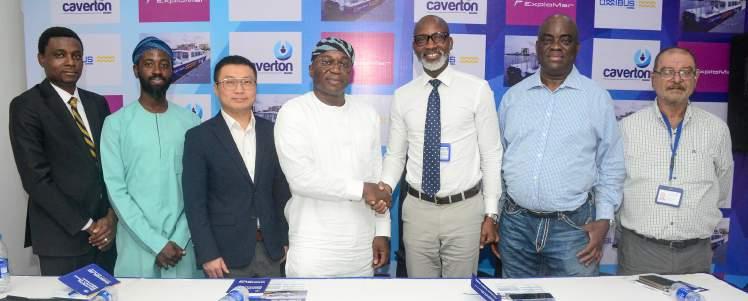
ELECTRIC FERRY STAKEHOLDERS' ENGAGEMENT...
L–R: Chief Finance Officer (CFO), Caverton Offshore Support Group Plc (COSG),
NNPC: N16TN REMITTED TO FEDERATION IN TAXES, ROYALTIES, DIVIDENDS IN 2024
company, Bayo Ojulari, stressed that the company's “sustainable” procurement spending also hit N4.463 trillion.
Essentially, sustainable procurement involves buying goods, services, and works in a way that delivers value for money while also reducing environmental harm, supporting social wellbeing, and strengthening economic resilience.
Besides, NNPC disclosed that its share of crude oil production was 202.3 million barrels during the year under consideration, while natural gas production was 1,045.6 billion SCF, and its number of retail outlets hit 1,096, even as the number of women in the senior management team climbed to 20 per cent.
Still on its sustainability
activities, NNPC stated that it made commercial entry into the Compressed Natural Gas (CNG) market through the operationalisation of mobility CNG at the NGML/NIPCO mother station project and launched 12 CNG stations in Abuja and Lagos, as well as trained over 1,000 mechanics, and deployed 55 eco-friendly trucks.
On the shipping side of its business, Ojulari highlighted the commercialisation of NNPC's “Bill of Lading” process, stressing that it generated N210 million in revenue, while its newly established “Vetting Desk” vetted 278 vessels, underscoring its commitment to transparency and value creation.
“In 2024, we remitted N15.982 trillion to the
federal government in taxes, royalties, and dividends; an unprecedented contribution to national development,” Ojulari added.
He added that over 430,000 National Youth Service Corps (NYSC) members were trained in financial literacy, while 15,000 STEM textbooks were distributed as part of its Corporate Social Responsibility (CSR).
In the same vein, it reported that 3,400 citizens were supported through cancer screening, disclosing that its “inclusive” recruitment attracted 45,000 applicants, with 20 per cent of senior roles held by women.
He added, “We commissioned 12 CNG stations, launched methane reduction initiatives,
and prioritised upstream emissions abatement.
“Our sustainable procurement spend reached N4.463 trillion. We submitted our inaugural UN Global Compact COP and reinforced governance frameworks to foster trust and transparency.”
While investing in world-class training of its staff at institutions like Harvard, Stanford, Wharton, Kellogg and Lagos Business School, the company stated that promotions were meritbased, appointments strategic, and recruitment transparent, ensuring it attracts and retains top-tier talent.
In addition, Ojulari stated that in 2024, NNPC's upstream operations delivered exceptional results, especially with the establishment of the “Production
War Room”, enabling the national oil company to overcome production bottlenecks and elevate national crude and condensate output from a lowest monthly average of 1.44 million bpd in March to a peak of 1.70 million bpd by November, an 18 per cent lift in nine months.
“This momentum continues into 2025, with a year-to-date average of 1.725 million bpd, the highest in five years,” NNPC emphasised.
It listed key upstream achievements as: First oil from OML 13 Utapate and OML 85 Madu fields; Final Investment Decisions (FID) for OML 58 Ubeta ($550 million) and OML 118 Bonga North ($5 billion); unlocking significant gas and oil volumes; as well as successful
DESPITE GAINS IN INFLATION-TARGETING, CBN RETAINS MPR AT 27 PER CENT
gradual stabilisation of the global supply chain, and softening commodity prices.
He added that inflation was, however, projected to remain above pre-Pandemic levels in the near term.
The MPC forecast indicated a sustained disinflation in the near term, to be largely driven by the lagged impact of previous monetary policy tightening measures, supported by the continued stability in the foreign exchange market.
In addition, the ongoing seasonal harvest cycle was expected to boost local food supply, and further moderate food prices, the CBN governor added.
MPC reaffirmed its commitment to evidencebased policy approach towards achieving the bank's mandate of price and financial system stability.
However, addressing concerns that the progress so far recorded in the macroeconomy had not trickled down to the masses, Cardoso said having achieved stability, which was key to attracting
investors, Nigerians will soon feel the impact of ongoing reforms.
He said, “And if you look at the sectors, you will see that over the course of the last couple of quarters, there has been growth. But the fact that we are now accomplishing stability gives greater confidence to investors, who ultimately will invest.
“And so, the growth and some of the issues you are talking about now become issues that are easily taken care of, and I'm almost certain that in the fullness of time, you will begin to see exactly what I'm talking about, that stability has a way of promoting growth and ensuring that it is stable and enduring growth, which is what we really need. What we don't need is anything that is short-term and cannot be sustained.”
Responding to the seeming drought in CBN’s targeted interventions in the economy, and if that had worked under the current monetary policy strategy, Cardoso pointed
out that out of the N10.93 trillion CBN interventions to the economy from 2010, about N4.69 trillion or 43 per cent remained outstanding.
He said, “Since we have come, we have been able to rein back about N2 trillion. Now, this is a humongous amount of money. So, what is still outstanding really and truly ties our hands in terms of additional interventions.
“I think I have to make that very clear, because you go in a direction that will easily destabilise your economy, as indeed happened in the past. We are having to take time to bring and rein in all these excessive interventions that had a way of heavily distorting our economy.
“So, from that, my answer to your question is a very simple one: it is working. And why is it working? Two reasons. One, because I can't do any interventions. My hands are tied anyway. And two is the fact that as a catalyst, to what extent are we using our convening power? Because that's what it is, really using our convening power to
encourage those who should be in the development space to be there.”
Cardoso added, “And we are doing that. And the reason we are doing that is because, if you look back at the model of interventions being done, they had certain elements in them which were very discouraging for those who should, by the very nature of their business, be doing it. And why is that?
“Because if others are doing it, like the central bank, at the rates that they are doing it, why would anybody else think they can compete with the central bank? They can't. What we want is the incentive for them to be creative, innovative, come up with new products, and think outside of the box.
“Those are add-ons that we as central bank believe we are doing and will continue to do. Also, there is a moral hazard. If you take money, it is money to be returned. It's not money that you take and put in your pocket and walk away.”
Nevertheless, Uwaleke said,
“I consider the MPC decision to maintain the MPR at 27 per cent, keeping the CRR and Liquidity Ratio unchanged, a welcome development.
“This is especially so against the backdrop of the narrowing and asymmetry of the standing facility corridor from +250/-250 bps to +50/450 bps, effectively lowering the ceiling for CBN lending and widening the gap on the deposit end.
“This adjustment signals cautious operational easing, even as headline MPR remains elevated apparently to continue to manage inflation and FX pressure.”
He said, “With the CBN's lending window now cheaper, banks face lower marginal funding costs which should ordinarily reduce interbank volatility and encourage lending to SMEs.
“The real challenge is whether banks will translate this corridor adjustment into actual lower lending rates. Given fiscal pressures from deficit financing which compound inflation risk and the need to support growth,
streaming of Enwhe and Gbaran gas assets, adding 300 MMscfd to national supply.
The company stated, “In power, we expanded installed capacity by 2.8 per cent, and our LNG ambitions advanced with steady progress on NLNG Train 7. The Brass Fertiliser GSPA signing and renewed investor interest in Gas-Based Industries affirm Nigeria's growing appeal as an energy investment destination.”
Still on its strategic achievements, NNPC stated that “First-ever strategy” was finalised, approved by the board, and operationalised, followed by record profit after tax, enabling reinvestment in clean energy, workforce development, and community initiatives.
the MPC decision is quite appropriate.”
The CBN governor clarified that contrary to speculations that the current stability in the local currency might have been policy-driven to offer temporary relief, Naira’s stability was derived from the interplay between market forces of demand and supply.
The central bank governor said, “Our FX system is one that is open and very transparent. So, you can see who is buying, you can see who is selling. It is this that gives confidence to markets. And it is for that reason that, on average, and on a daily basis, we have half a billion dollars in turnover market activity, with many times the CBN not being a participant.
“For those of you who remember how markets used to operate in those days? The CBN does not intervene; nothing happens. That is now a thing of the past. We have a market that is open, that is transparent, and that plays in accordance with certain rules that everybody has signed up to.”
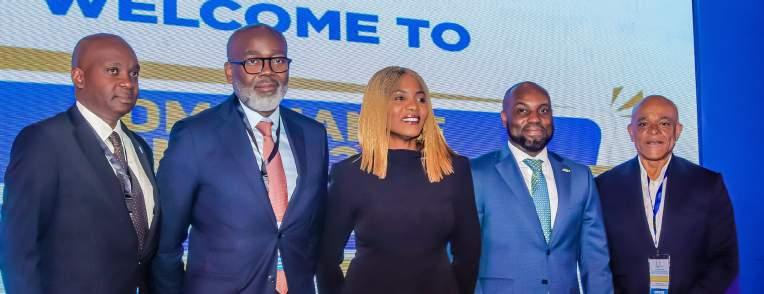
Tinubu Names Uzodimma Renewed Hope Ambassador for FG's Ward Programme
Imo gov to also double as DG for ruling party's outreach, engagement, mobilisation President tasks appointee to propagate govt's achievements in all sectors of the economy Renewed Hope Agenda 2027 strengthens structure in Enugu
the Tinubu administration's programme.
President Bola Tinubu has appointed Governor Hope Uzodimma of Imo State as the Renewed Hope Ambassador ahead of the national launch of Federal Government's Ward Development Programme. According to a statement by presidential spokesperson, Bayo Onanuga, Uzodimma in his role as ambassador, will also double as the Director-General for party’s outreach, engagement and mobilisation.
With the appointment, which takes immediate effect, Uzodimma would be responsible, in collaboration with the All Progressives Congress leadership and the governors, for evangelising
As Renewed Hope Ambassador, the Imo governor, who also chairs the Progressive Governors’ Forum, would ensure harmony, inclusiveness and strategic coordination across all levels of the party.
He would also be involved in mobilising and engaging people, as well as work with the APC governors, who would also be Ambassadors of Hope.
Tinubu, he said, expected Uzodimma and his colleagues to promote and disseminate the party's achievements and milestones since 2023, thereby reinforcing the message of Renewed Hope nationwide.
Tinubu took office in May 2023 with a reform agenda
that is already yielding positive outcomes for the Nigerian economy.
Inflation, once a nightmare, eased for the seventh month in a row to 16.05 per cent in October.
The exchange rate has stabilised. Foreign Exchange reserves reached over $46 billion this month, up from $32 billion and a net reserve of $4 billion inherited in 2023.
Investor confidence in the Nigerian economy is back, with both FDI and Portfolio investments on the increase, with the oil and gas sector a significant beneficiary.
The stock market is enjoying an unprecedented boom. The economy is being diversified, with solid minerals playing a pivotal role.
The government's liberal
educational loan policy has enrolled over 700,000 students. Nigerians do not need to wait longer than one week to get a travel passport.
Tinubu, in a message to Uzodinma, asked him to ensure that Nigerians were aware of and understood the administration's achievements.
Meanwhile, a support group for Tinubu's second term project, the Renewed Hope Agenda 2027, has continued to firm up its structure in Enugu State and working towards achieving its mandate.
The group is also working on the project for the renewal of Governor Peter Ndubuisi Mbah's mandate by the people of Enugu State come 2027.
To this end, the Enugu
Insecurity: Canada Slams Travel Alerts on Nigeria, Niger, 15 Other African Nations
Acting on the latest security updates in Nigeria and some other African countries, the Canadian government has dropped what is considered one of its biggest travel-risk updates in recent years, warning citizens to steer clear of 17 African countries, because of spiralling insecurity, political turmoil and extremist violence.
Global Affairs Canada rolled out the advisories between November 13 and 15, 2025 as part of a wider review that now covered 34 nations worldwide.
Canadian officials pointed to a perfect storm of threats:
expanding extremist networks in the Sahel and Horn of Africa, a wave of military coups, communal clashes, mass protests, cross-border crime, and fragile governance that left many states barely holding together.
According to the updates, on countries to “Avoid All Travel” include South Sudan, Burkina Faso, Central African Republic, Libya, Mali, Niger, Somalia and Sudan.
A local journal, Prime Business Africa, reported that the nations were battling active insurgencies,
militant attacks, and a near-collapse of political order.
Canadian officials stated that these made them “extremely risky” for any Canadian traveller.
The “Avoid Non-Essential Travel” countries were Democratic Republic of Congo (Kinshasa), Madagascar, Chad, Ethiopia, Burundi, Eritrea, Mauritania, and Nigeria Tanzania.
Canadians were urged to weigh the purpose of any trip carefully and keep a close eye on local developments.
The advisory cited ongoing unrest, communal violence and volatile politics as the main concerns.
“The revised advisories were informed by worsening armed conflicts, fragile political transitions, and unpredictable security conditions across several regions in Africa,” a statement from Global Affairs Canada read.
For the “Avoid All Travel” list, the warning was stark, meaning citizens could face extreme danger, limited consular support, and a tough time securing evacuation if a crisis hits.
State chapter of the Renewed Hope Agenda 2027 has announced the appointment of Comrade Onyebuchi Mbah as its spokesperson. According to a press statement signed by the Enugu State Coordinator of Renewed Hope Agenda 2027, Dr. Ezenwa Onyirimba, the appointment took immediate effect.
"The Office of the Enugu State Coordinator, Renewed Hope Agenda 2027, proudly announces the
appointment of Comrade Onyebuchi Mbah as the State Spokesperson for the Renewed Hope Agenda 2027 in Enugu State. "This appointment reflects the commitment of the Renewed Hope Agenda to strengthening communication, deepening grassroots engagement, and ensuring effective dissemination of the vision and programmes aligned with the Renewed Hope philosophy,” he said.
Wike Orders Total Security Surveillance Across Abuja
Olawale Ajimotokan in Abuja
Minister of the FCT, Nyesom Wike, has directed the FCT Police Commissioner, Miller Dantawaye, to beef up security in the nation’s capital in addition to improved surveillance at all borders with neighbouring states and entry points.
Dantawaye disclosed this yesterday while addressing the joint military taskforce of police, Department of State Services (DSS) and other security agencies, code named Operation Sweep deployed to different parts of the FCT.
He noted that the FCT Minister operation has also provided enough logistics to ensure its success and guarantee adequate safety and security for residents, while charging the team to create the synergy required to eliminate crimes and criminalises across the FCT.
Dantawaye noted that the FCT Minister, who directed the operation has also provided enough logistics to ensure its success and guarantee adequate safety and security for residents.
He disclosed that the team had been detailed to pay attention to the areas prone to kidnapping and banditry, ensuring safety for all residents.
“The FCT minister, his excellency Nyesom Wike, has given complete support, especially in terms of logistics for this operation.
“He has given approval and I am sure that by the time we'll be leaving here later, I mean today, the funds for fueling, for servicing of the vehicles and even allowances for the men will have dropped into an account that we can assess,” he said.
The police commissioner also condemned the influx of beggars into the city centre, noting that the security agencies were collaborating with relevant departments of FCTA to tackle the menaces of street begging in Abuja.
He said while the legal requirements on the evacuation of street beggars were being perfected, whoever was arrested would be profiled as criminals often disguised themselves as beggars.
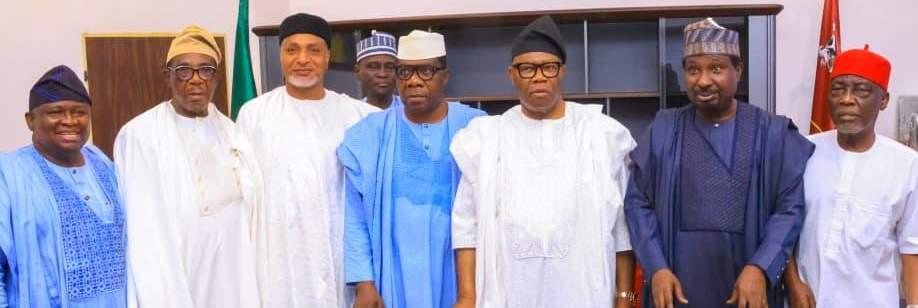
SENATE SUSPENDS PLENARY IN HONOUR OF DEPARTED COLLEAGUE...
L-R: Chairman, Senate Committee on Appropriations,
Services and Rural Development,
Atiku’s Camp Slams Oshiomhole, APC’s ‘Legacy of Failure’
Former VP’s ally, Fabiyi, quits PDP
The camp of former VicePresident Atiku Abubakar, yesterday, launched a blistering counterattack on Senator Adams Oshiomhole, accusing the former national chairman of the ruling All
Progressives Congress APC of “weaponising noise to mask the catastrophic failures” of the party.
Oshiomhole had branded Atiku a defection expert, following the former vice-president’s official registration with the African Democratic Congress (ADC), having ditched the Peoples Democratic Party (PDP).
In a statement by Senior Special Assistant on Public Communication to the former vice-president, Phrank Shaibu, the camp said Oshiomhole had no
moral standing to question Atiku’s leadership credentials, insisting that the APC senator should “check the mirror before speaking.”
Shaibu argued that Oshiomhole was attempting to distract Nigerians from what he described as “the
Otti, Soludo, Nwifuru Present Appropriation Bills for 2026 Fiscal Year
Abia proposes N1tn; Anambra, N757bn and Ebonyi N884.8bn
David-Chyddy Eleke in Awka, Boniface Okoro in Umuahia and Benjamin Nworie in Abakaliki
Three states in the South-east yesterday submitted their proposed budgets for 2026 to their various legislatures, led by the Abia State Governor, Alex Otti, who presented a bill of N1.016 trillion; Anambra State Governor, Prof. Chukwuma Soludo, who made a proposal of N757 billion and Governor Francis Nwifuru of Ebonyi State, who submitted an estimate of N884.868 billion. Otti laid the bill christened: “Budget of Acceleration and New Possibilities” representing
a 13 per cent increase from that of 2025, before the state lawmakers. In the 2026 estimates, N811,813,769,862.24 (80 per cent of the draft bill) has been proposed for capital expenditure, while N204,414,302,789.75 (20 per cent of the budget) is for recurrent expenditure “A total outlay of N811.8 billion for capital projects represents a 32 per cent jump from our 2025 proposal which stood at N726.4 billion. Conversely, the size of the envelope for recurrent expenditure has been raised by 33 per cent from last year’s figure which stood at N136 billion.
“The increase is to enable us to support critical day-to-day administrative functions and effectively meet our obligations to personnel, especially with the addition of thousands of new employees to the payroll,” the governor said.
As has been the practice of the Otti administration, 20 per cent of the total budget, amounting to N203.2 billion was allocated to the education sector for the 2026 fiscal year.
Of this sum, N150.4 billion would be committed to offset recurrent expenditures like paying the salaries of about 15,000 teachers working in primary and secondary schools and in the execution of capital
projects.
The governor also maintained the culture of allocating 15 per cent of the proposed budget, representing N149.7 billion to the health sector. He said the money will cover programmes and activities connected to healthcare delivery services in the 2026 fiscal year.
To continue with his aggressive road infrastructure development programme in 2026, the governor said the sum of N169.3 billion, representing 16.7 per cent of the total envelope, has been budgeted for road construction, reconstruction, rehabilitation and maintenance through the Ministry of Works.
UK-funded Initiative Pitches Sustainable Manufacturing Solutions in Nigeria
Michael Olugbode in Abuja
The British High Commission in Nigeria and Manufacturing Africa have hosted an Investor Night where six innovative Nigerian startups from the UK-funded Green Business Building (GBB) Accelerator Programme pitched their sustainable manufacturing solutions to potential investors following 16
weeks of intensive business development training and mentorship.
The featured green businesses covered a broad range of industries extending from renewable energy, recycling, organic agriculture and electric mobility.
According to a statement by British High Commission yesterday, the startups – GreenSpace Recycling, Sirius-X Energy, Auxano
Solar, Taeillo, ZOOMe and Veggie Victory presented their business models and opportunities to a room of venture capitalists, impact investors, and ecosystem stakeholders.
The pitching session, it said, marked a key milestone in their journey, aimed at unlocking funding and strategic partnerships.
The statement added that designed in a pitch den
format, the evening included presentations from the cohort companies, offering insights into their innovative climate friendly business models and the potential for scaling their ventures to create lasting economic and environmental impact.
The businesses also received real-time feedback from funders including potential offers for funding.
monumental failures of the APC, the very party he helped foist on Nigeria, and the same party that has driven the country to its worst state in decades.”
The statement dismissed Oshiomhole’s remarks as “a tired distraction,” insisting that Atiku, as vice-president, was neither national chairman of the PDP nor a dictator presiding over a one-man political empire.
Shaibu stressed that, unlike the APC, the PDP was never run as a “private estate controlled from Bourdillon,” and that Atiku operated within a democratic institution where decisions were not “tele-guided by one individual.”
His words: “If Oshiomhole
seeks the man who ‘fixed a party’ into a personal empire, he needs only look at the godfather he serves. Under the APC, party supremacy died, dissent was criminalised, and institutions of state became partisan weapons. That is the only kind of ‘fixing’ Oshiomhole understands,” he stated. The statement defended Atiku’s national record, describing him as a leader whose achievements remained unmatched. It recalled that Atiku chaired the National Economic Council, rebuilt investor confidence, strengthened the private sector and midwifed reforms that reshaped Nigeria’s economy.
Amupitan: Polls Integrity Non Negotiable
Adedayo Akinwale in Abuja
Chairman of the Independent National Electoral Commission (INEC), Prof. Joash Amupitan, SAN, has insisted that the integrity of elections under his leadership was non negotiable.
Amupitan disclosed this yesterday in Abuja during the swearing-in of Prof. Adeniran Tella as a Resident Electoral Commissioner of Oyo state.
He stated: “My tenure as Chairman of the Independent National Electoral Commission began with a clear and unwavering mandate: to deliver free, fair, credible, transparent and inclusive elections that genuinely reflect the will of the Nigerian people.
“This mission is not merely a regulatory obligation; it is a moral and legal duty we owe to every citizen. The credibility of our electoral system is the very foundation upon which our democracy stands.
“Your role as a Resident Electoral Commissioner (REC) is absolutely critical to the success of this democratic project. I must be unequivocal and I admonish you that the integrity of our elections is non-negotiable.”
Amupitan stressed that his swearing-in was a profound responsibility, placing him at the forefront of Nigeria's democratic journey in one of our states.
He charged him to uphold the highest standards of professionalism and integrity in every action you take.
“As I have emphasised to my colleagues, and I now emphasise to you: Any compromise on our values or our procedures shall not be tolerated.
“You must focus on transparency, strictly adhering to every guideline and every procedure laid out by the Commission and the Electoral Act.
HOLDING GOVERNMENT ACCOUNTABLE FOR UNLAWFUL KILLINGS
At the heart of Nigeria’s Constitution lies a solemn promise: the protection of life and security of every citizen. This is enshrined in Section 14(2) (b), which declares that “the security and welfare of the people shall be the primary purpose of government.” The wording is deliberate — it is not a suggestion, a policy goal, or a rhetorical flourish. It is a binding constitutional mandate. Security and welfare are not privileges reserved for the affluent, the politically connected, or the socially powerful; they are inalienable rights of every Nigerian, regardless of class, religion, or region.
Similarly, Section 33(1) guarantees every individual the right to life, stating that no one shall be deprived of life except in execution of a court sentence after due process of law. Once again, this is more than a protection from direct state action. Embedded in this provision is a positive duty: the government is obliged not merely to abstain from killing but also to actively safeguard lives against foreseeable threats, whether these threats arise from criminals, terrorists, bandits, herders, or other non-state actors.
In practical terms, these constitutional provisions demand that the state:
*Investigate and respond to threats against citizens before they escalate into killings.
*Deploy security forces effectively to protect vulnerable communities.
*Ensure accountability by prosecuting those who commit crimes against life.
*Prevent the emergence of systemic impunity, which emboldens criminal gangs and terrorists.
Yet, the reality in Nigeria paints a starkly different picture. Despite repeated warnings, reports of attacks, and widespread public knowledge of bandit and terrorist activities, government agencies routinely fail to act. Farmers are slaughtered on their lands; children are abducted or killed; communities live under siege and the perpetrators continue their mayhem with near impunity.
This failure represents a profound breach of the social contract. The Constitution establishes government as the protector of its citizens; when it abdicates this duty, it betrays the very foundation of legitimacy. Every life lost is a reflection not just of criminality but of state negligence, an institutional failure that allows violence to flourish unchecked.
Moreover, the moral dimension of this duty cannot be overstated. Protection of life is the most fundamental obligation of any government. Beyond legal statutes and constitutional provisions, it is a moral imperative: a government that cannot secure the lives of its people has lost its raison d’être. Citizens cannot be expected to thrive, contribute to the nation, or feel safe when their right to life is treated as optional or secondary.
Sections 14(2)(b) and 33(1) are not aspirational; they are binding commands. The Nigerian state is constitutionally and morally obliged to guarantee that no citizen is left vulnerable to killing, kidnapping, or terror. Failure to meet this obligation is a direct violation of both law and conscience, and it is a call to urgent action and accountability.
preserving our cultural values and advancing the good of our people.
I remember with deep affection my last conversation with General Agbogun during the Easter period a few months ago. We spoke about the challenges in our community and shared thoughts on how to drive meaningful change. His insights were profound, his concern for Agbor sincere, and his hope for progress unwavering.
General Agbogun and his peers including our revered and globally acclaimed Godfather of modern banking in Africa, Jim Ovia; Professor Enwemeka; Professor Leonard Obika; Sir Steve Omojafor; Bath Ibegbulem; Maria Adaigbe; Vincent Ebuh; the Late Sunny Egun; the Late Pat Morgan; the Late Pat Ojei; Frank Harding Agoh; Jeff Efeyini; and others were role models for us within Ime-Obi (the heart of the Agbor Kingdom). Their collective achievements and commitment to excellence gave my generation hope and a sense of direction. They made education not just desirable but honourable, and they became a yardstick for measuring ambition, purpose, and progress.
The persistence of unlawful killings in Nigeria is not accidental; it is the outcome of structural, political, and economic failures that have systematically weakened the state’s ability and, at times, its willingness to protect its citizens. These failures manifest across multiple dimensions: At the heart of the problem lies the government’s approach to economic governance.
The Bola Tinubu administration, following in the footsteps of neoliberal policies of previous administrations, has implemented economic measures that have alienated ordinary Nigerians and widened the gap between the state and its citizens.
Economic alienation undermines national unity and erodes the social fabric necessary for collective defence. When citizens feel excluded from governance, marginalized in economic opportunity, and neglected in security, the state loses the moral authority to demand loyalty or collective action.
The legitimacy of any government depends not only on its constitutional mandate but also on its capacity to guarantee the life and livelihood of its people. In Nigeria, the failure to address unemployment, economic disparity, and insecurity has created fertile ground for insurgency, banditry, and terrorism. Citizens are left to fend for themselves, and in many cases, their only recourse is to negotiate with criminals or pay ransoms — a scenario that would be unimaginable in a functioning state.
The ongoing herder-farmer violence is one of the clearest illustrations of state neglect. Although the federal and some state governments have repeatedly resolved to ban open grazing and establish ranches, these measures remain largely unenforced. Herds of cattle continue to roam farmland, and innocent farmers are slaughtered or driven from their lands.
The urgent solution is straightforward: ban open grazing nationwide and, in the interim, transport cattle in trailers to minimize contact with farmlands until ranches are fully operational. The government must recognize that protecting farmers is not merely an economic necessity; it is a constitutional and moral duty under Section 14(2)(b) and Section 33(1). Every day that this violence continues without effective state intervention, the social contract with citizens is further eroded.
Another driver of insecurity is the state’s failure to combat high-level criminality. The federal government has acknowledged that gold worth billions of dollars is smuggled out of Nigeria in private jets by politically connected individuals. Yet, prosecutions are rare, and many of the perpetrators continue to operate with impunity.
This structural complicity fuels organized crime, terrorism, and banditry. Criminal gangs exploit the vacuum left by weak enforcement, knowing that powerful actors shield them from arrest or prosecution. To curb the killings and restore public confidence, the government must urgently arrest and prosecute these high-profile sponsors of smuggling and criminal networks. This is
not only a legal obligation but a prerequisite for restoring national security and deterring further violence.
Perhaps the most glaring manifestation of inequality in the state’s protection of life is the double standard in handling kidnappings and security threats. When judges, former public officers, or elites are kidnapped, the government acts swiftly, deploying military resources, intelligence operatives, and sometimes paying ransom to secure their release.
Conversely, when ordinary citizens — farmers, students, worshippers — are abducted, their families are left to negotiate with criminals or pay ransom themselves, often at the whim of armed gangs. This is not only a moral failure but also a constitutional violation. Justice demands that the state assume responsibility wherever citizens are compelled to pay ransom. The government must refund ransoms paid by victims’ families as recognition of its dereliction of duty and as a deterrent to future kidnappings.
The double standard in state response undermines public trust and fosters a perception that some lives are more valuable than others, further entrenching social inequality and exposing ordinary citizens to continual violence.
The recurring massacres, kidnappings, and extrajudicial killings in Nigeria are not only national tragedies — they are international law violations. The ECOWAS Court of Justice has, over the years, firmly established that when a state fails to protect its citizens from known or foreseeable threats to life, it incurs international responsibility under Article 4 of the African Charter on Human and Peoples’ Rights, which guarantees that “Human beings are inviolable. Every human being shall be entitled to respect for his life and the integrity of his person.”
This jurisprudence is not abstract; it has been tested in cases where the Court found governments across West Africa liable for preventable deaths arising from negligence, inaction, or institutional failure. Nigeria, in particular, has been a subject of such judicial censure. The principles from these cases reveal a pattern of accountability that can, and should, be invoked against the Nigerian State for the continuing wave of unlawful killings.
In this landmark case, the ECOWAS Court examined Nigeria’s liability for the death of Mr. Afolalu, a naval officer who was abducted and killed by BokoHaram insurgents after his family had repeatedly warned the authorities of credible threats to his life.
Despite being aware of the imminent danger, the government failed to act — a failure that proved fatal. The Court held that Nigeria had violated Article 4 of the African Charter, finding that the right to life imposes a positive duty on the State to take preventive operational measures once it becomes aware of a real and immediate risk to an individual’s life.
The Court’s reasoning was clear and instructive: it is not enough for a government to refrain from killing its citizens; it must actively protect them from foreseeable threats, whether from state agents or non-state actors.

During the period of the Nigerian civil war, I was fascinated by the disciplined conduct and patriotism of the Nigerian army. Subsequently, seeing General Agbogun visit home after his commission in the '70s in military Land Rovers and a retinue of soldiers fired my ambition to join the military. Through the guidance and support of Colonel Peter Nmoye (Retired), who was then a Captain, I enrolled for the very competitive entrance examination of the Nigerian Defence Academy (33rd Regular Course) in 1982 and passed at first sitting. Although I was not successful at the final selection board screening, the desire to follow in the footsteps of General Agbogun became one
The state’s responsibility under international law is engaged whenever it knew or ought to have known of a risk to life and failed to take reasonable steps to prevent it.
By this same reasoning, Nigeria’s continued failure to secure rural communities under repeated attacks by terrorists and bandits — despite years of public warnings, official reports, and security briefings — amounts to a continuing international wrong. The government cannot plead ignorance or helplessness where the facts of danger are notorious and recurring.
In another Nigerian case, the Court considered the tragic death of Officer-Cadet El-Shaddai Kwasu, who drowned during swimming training at the Nigerian Defence Academy (NDA) in Kaduna. The evidence showed that the institution failed to provide adequate safety measures, supervision, and medical readiness — acts of negligence that led directly to the cadet’s death.
The ECOWAS Court held that Nigeria had violated the right to life under Article 4 of the African Charter and awarded the family USD 75,000 in compensation. The Court’s language was decisive: the duty to protect life extends beyond acts of direct violence; it encompasses the obligation to ensure safety within all institutions under state control, whether military or civilian. Where a state institution’s negligence, omission, or lack of precaution results in death, the state bears international responsibility for failure to fulfill its duty of care.
If the Nigerian State can be held liable for the preventable death of a cadet within a controlled environment, how much more culpable is it for the widespread killings of thousands of citizens in uncontrolled rural and urban areas, where the government has failed to deploy adequate security despite clear warnings? The Court’s jurisprudence makes clear that negligence, omission, or failure to act are as culpable as active violations.
This case arose from the death of a 15-year-old Nigerian student, Augustine Chukwuebuka Ogukwe, who drowned during a school excursion to the beach in Tema, Ghana. The Ghanaian authorities failed to ensure safety measures and later failed to investigate the circumstances of his death.
The ECOWAS Court found the Republic of Ghana liable for negligence and failure to protect life, awarding the victim’s family USD 250,000 as compensation. The Court emphasized that the right to life imposes both preventive and investigative obligations on states. It is not sufficient for a government to express sympathy after a death; it must take steps to prevent foreseeable harm and, where death occurs, conduct a thorough and impartial investigation to ensure accountability.
States are obliged not only to prevent unlawful deaths but also to investigate them effectively. Failure to do either constitutes a violation of the right to life.
of the defining moments of my youth a lesson in perseverance, discipline, and the pursuit of excellence.
In April 2016, I presided as Chairman of Fidel's (their first son) wedding reception. My immediate reaction when he asked me to take up the role was that I felt too young for such a responsibility, given the age difference between us and his vast network of distinguished friends and colleagues
as a retired General. In his characteristic wisdom, he smiled and said, "Age notwithstanding, when one becomes a responsible adult, it automatically attracts leadership roles." Those words, simple yet profound, have stayed with me ever since.
To Fidel and siblings: Losing both your father and mother within such a short span is indeed a heavy and painful cross to bear. Yet, in the mystery of it all, there lies a profound beauty the genuine love and inseparable bond they shared throughout their lives. They walked hand in hand through life's journey, and in God's divine plan, they have journeyed together into eternity - united forever in love, peace, and glory.
They leave behind a lasting legacy children and grandchildren who embody their values of discipline, compassion, faith, and service. Their memory will forever remain a blessing, and their example will continue to inspire generations to come.
Soldiers say that a true officer never truly dies he simply reports to a higher command. General Agbogun has answered that final call, and his wife Stella marched right behind him. Their duty is complete, their honour intact, and their legacy forever secured.
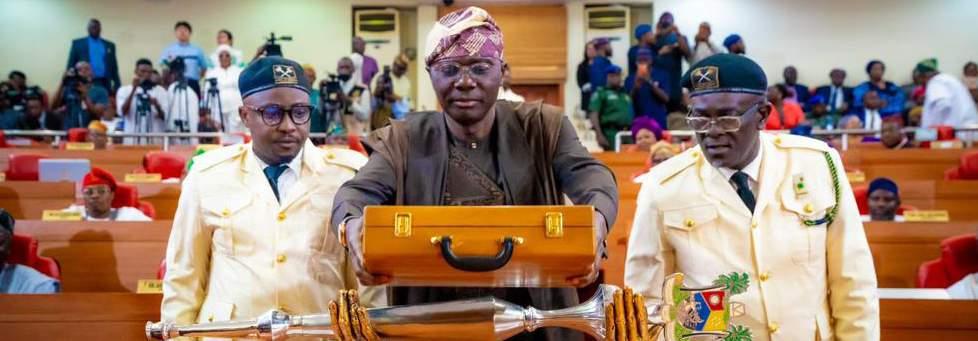
IT’S ALL IN HERE...
FEMI FALANA
GUEST COLUMNIST

Holding Government Accountable for Unlawful Killings
Nigeria today stands at a crossroads of tragedy and impunity. While the world watches with horror at mass shootings in the United States, which claimed no fewer than 250,000 lives between 2020 and 2025, we must pause and consider our own reality. In America, these killings are driven by a libertarian gun culture, fiercely defended by the National Rifle Association under the Second Amendment. Yet, even there, the rule of law operates: suspects are arrested, prosecuted, and the machinery of justice is set in motion.
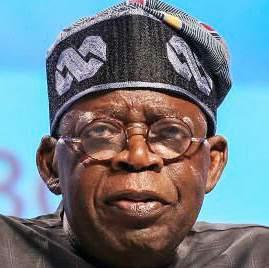
Contrast this with Nigeria, where the slaughter of ordinary citizens is not only persistent but often enabled by state inaction and negligence. Farmers are murdered on their farms, worshippers are killed in places of prayer, students are kidnapped or killed with impunity, and rural communities live in constant fear. These killings occur not because the government lacks knowledge, but because systemic failures, corruption, and class bias allow the perpetrators to act without fear of consequence.
It is particularly striking and tragically ironic, that former U.S. President Donald Trump has threatened military intervention in Nigeria, citing the alleged “Christian genocide,” while in his own country, mass killings remain unchecked. The message is clear: even the most powerful countries cannot fully protect their citizens when societal and political systems are weak. Yet, unlike the U.S., where perpetrators are pursued and prosecuted, in Nigeria, killers roam freely, uninvestigated and unpunished, leaving victims’ families to shoulder unimaginable burdens, sometimes paying ransom to criminals simply to reclaim their loved ones.
This essay seeks to interrogate the underlying causes of this persistent failure — to understand why unlawful killing continues unabated in a country whose Constitution explicitly guarantees the right to life. Nigeria’s Sections 14(2)(b) and 33(1) of the 1999 Constitution are not abstract promises; they impose a binding duty on the
government to ensure the security, welfare, and protection of every citizen, regardless of social status, religion, or location.
But laws alone are insufficient when state machinery turns a blind eye. Therefore, this address is also a call to action: a clarion call for Nigerians to mobilize, demand accountability, and compel the government to fulfill its constitutional mandate. Today, we confront the paradox of a nation that can defend the wealthy, protect elites, and negotiate for high-profile kidnappings, yet consistently fails to protect its poorest citizens — the farmers, students, and worshippers who are the backbone of our society.
The time to speak, to act, and to demand justice is now. For the sake of every life lost, every community terrorized, and every family left in despair, Nigeria must no longer tolerate impunity.
When a General who once commanded the roar of battle finally lays down his sword, it is not defeat it is fulfilment. For years, he fought gallantly, served his nation with unwavering loyalty, and carried the weight of leadership with courage and grace. Yet, two decades after retiring from active service, he did not fall on the battlefield, nor in the fury of conflict. Instead, he departed this world in the stillness of sleep peacefully, honourably, and as though carried gently by the same divine hand that had guided his steps through life. In that quiet passing, there is symbolism: the warrior who once faced fire and fury now rests in calm, having won the truest victory of all a life welllived and a legacy that will echo far beyond his years. And when, in less than two weeks, his loving and devoted wife followed him on that
eternal journey, it affirmed the beauty of their inseparable bond a love story so profound that not even time could keep them apart.
The passing of General Nick Agbogun on 19th September 2025 and his beloved wife, Stella, barely two weeks later on 1st October 2025, leaves a void that words can scarcely fill. Yet even in our grief, we take comfort in celebrating two extraordinary lives - lived with honour, humility, and enduring love. Their passing, so close together, reflects the depth of their bond and the beauty of a love that truly endured to the end.
General Nick Agbogun was a man of discipline, conviction, and grace. His military career was a story of excellence, dedication, and integrity. Through hard work and merit, he rose to the distinguished rank of Major General, earning the admiration of his colleagues and the respect of all who knew him. A true officer and gentleman, he
lived by principle, led by example, and inspired by character. His calm authority and wisdom left an indelible mark wherever he served.
By his side stood his beloved wife, Mrs. Stella Agbogun - gracious, compassionate, and unwavering in her devotion. She was the gentle strength behind the General's steady presence, the heart of their home, and a woman whose kindness and grace touched countless lives. She also had a distinguished professional nursing career spanning over 35 years, marked by excellence, compassion, and service to humanity. Beyond her professional accomplishments, she was a committed Lion and served with honour as District Governor of Lions Clubs International, District 404B, during the 2012-2013 Lions year. Through service, leadership, and empathy, she embodied the values of care, community, and humanity. Together, they lived out a partnership

rooted in love, faith, and a shared devotion to service.
Even in retirement, General Agbogun's devotion to service did not wane. He remained deeply involved in community life and at one point served as President-General of the Agbor Community Union, where his leadership, wisdom, and sense of unity were evident. Through that role, he continued to champion initiatives that promoted peace, progress, and the preservation of Agbor's heritage.
Remarkably, just a day before his passing, General Agbogun participated in a virtual meeting of one of the Committees on Cultural Renaissance established by Our Royal Majesty, HRM Dein Kiagborekuzi I. Even in his final hours, he remained engaged in service - committed to Continued
